
91.4% GRADUATE EMPLOYMENT RATE
Our graduates leave us with the confidence and skills to make a difference. 91.4% of our full-time, first degree home graduates were in work or study 15 months after completing their course.
(Graduate Outcomes 2019–2020)
We have signed the Care Leaver Covenant and are committed to supporting care leavers at university, through our care leaver bursary, access to student support and guidance tutors and employment opportunities.

We are proud of our technicians and proud to be a signatory of the Technician Commitment, which aims to ensure visibility, recognition, career development and sustainability for technicians working in higher education and research, across all disciplines.

Professor Debra Humphris Your Vice-Chancellor
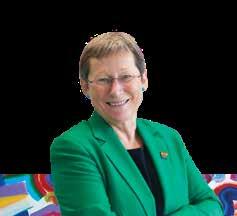
As a Brighton student you’ll be part of a learning community with a clear social purpose, one that seeks to make positive change in our local community and across the world. Driven by our institutional values of inclusivity, sustainability, creativity and partnership, we’re focused on big global challenges in our research and teaching, searching for solutions and preparing our students to take on the issues that matter to them.
We hold a Race Equality Charter Bronze Award, an Athena SWAN Silver Award recognising our commitment to gender equality, and we are a Stonewall Diversity Champion.
Our Information Services team holds the Customer Service Excellence® standard. This government-backed standard means the services we provide for our students have been independently assessed to be efficient, effective, excellent, equitable and empowering.
The Association of Graduate Careers Advisory Services (AGCAS) is the professional body for all university careers services. The AGCAS Membership Quality Award recognises the high quality professionalism of our Careers and Employability team in support of our students and graduates.
Everything we do is guided by what our students tell us is important to them – you’ll be able to influence the way we do things and shape your student experience. And your learning will be collaborative and hands-on – something you’re actively part of, not something that just happens to you. It’s my job to work with my colleagues to make sure that your university is a supportive environment where your talent and potential is recognised and opportunities are available to everyone. You will have the space to explore and practise what you learn, becoming skilled and confident in meeting each new challenge, and growing the self-belief to set your own goals and achieve your ambitions.
OUR GLOBAL COMMUNITY
You don’t need to wait until you graduate to benefit from the alumni community. We are in touch with 160,000 Brighton graduates in more than 140 countries around the world and many offer mentoring and placement opportunities to our students.
www.brighton.ac.uk/alumni
OUR SUBJECTS
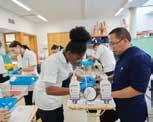
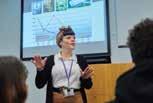
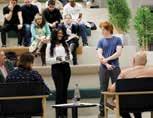
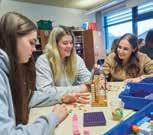
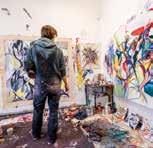
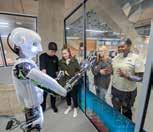
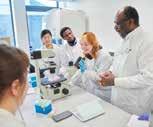
01 02–35 CHOOSE BRIGHTON A greater good 02–05 Investing in you Potential + possibility 06–11 Your learning experience Brighton works 12–15 Employability on and outside of your course Here for you 16–19 Your support system Your space 20–23 Our campuses A city like no other 24–27 Living in Brighton Life + soul 28–31 Sport, societies and Brighton Students’ Union Home from home 32–35 Our accommodation 36–79 PLOT YOUR COURSE Types of course 36–37 Find your course 38–43 Our subjects 44–79 80–89 NEED TO KNOW Fees and funding 81–83 How to apply 84 Entry requirements 86 Next steps 88 How to find us 89 54 ARTS AND MEDIA ® Fashion, textiles and 3D design ® Film ® Fine art ® Journalism ® Media ® Photography ® Sound and music ® Visual communication 68 HUMANITIES AND SOCIAL SCIENCES ® Creative writing ® Criminology and sociology ® History of art and design ® Humanities ® Language ® Literature ® Politics ® Psychology ® Social work 64 EDUCATION ® Education studies ® Teaching EXPLORING
DO WE DO YOUR COURSE? There’s a full list of our courses, grouped by subject, on pages 38–43. You can see what we offer, alongside other courses in the same area. For all of the detail, scan the QR code to our course finder. 44 APPLIED SCIENCES ® Biology and ecology ® Biomedical science ® Geography, the Earth and environment ® Pharmacy 74 SPORT AND HEALTH SCIENCES ® Allied health professions ® Medicine ® Nursing and midwifery ® Sport and exercise 60 BUSINESS AND LAW ® Accounting, finance and economics ® Business and management ® Law ® Marketing, events and tourism 48 ARCHITECTURE, TECHNOLOGY AND ENGINEERING ® Architecture and design ® Civil engineering ® Computing ® Construction and building ® Engineering Discover what it’s like at Brighton – browsing these seven areas will give you an idea of what you can do, where you could be studying, the kind of people you’ll meet and what you can get from a Brighton degree.
Our university – students and staff together –has a huge part to play in creating solutions to big human issues, like the climate emergency, global health, economic crises, and social and racial inequity. When you take your education to the next level with us, you join a community focused on positive change. And you’ll be investing in you, building practical skills and a capacity for critical thinking that will empower you to influence our evolving world.

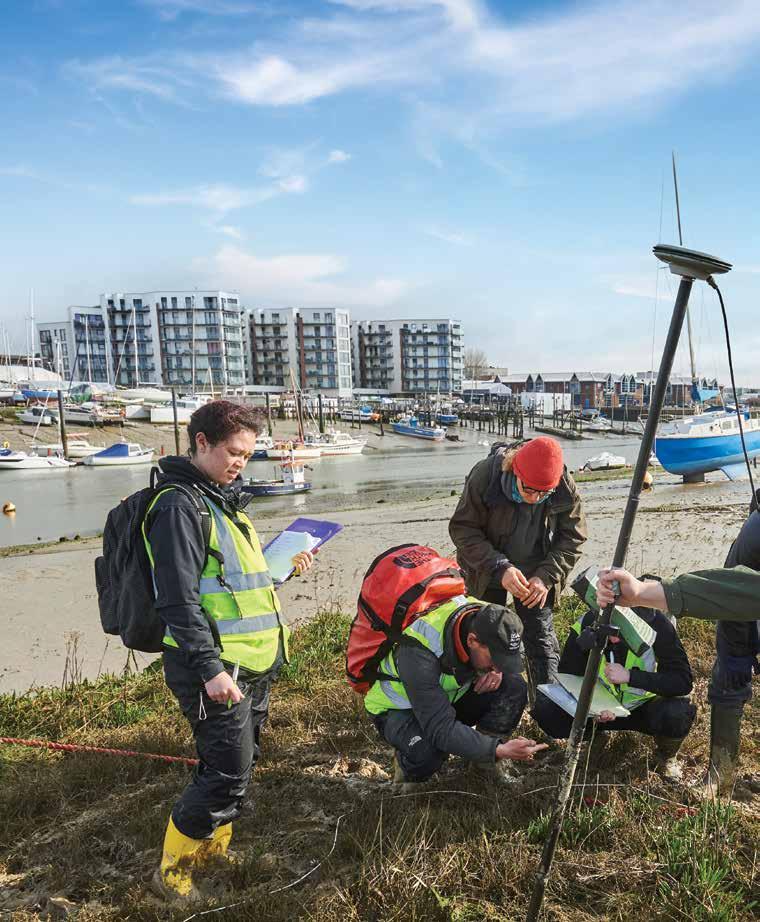
02
Plotting your course
At Brighton your course will be active and hands-on, challenge-based and anchored in the real world. And as well as developing knowledge and know-how, you’ll increase your capacity for critical thinking and analysis, which – in a world of rapidly evolving technologies – is more important than ever.
Maybe you know what you want to do – like our pharmacists, teachers, midwives and architects. Choose one of our practical, applied or accredited degrees and you’ll leave here qualified to enter your profession. Or simply choose something that matters to you or that you’re really fascinated by, and see where your commitment and curiosity take you. Either way, you’ll graduate with the transferable skills and attributes to embrace new opportunities or change direction when you choose to.
It’s okay to not know exactly where you’re headed right now – even if you do, degree-level study has never been about fixed answers. We’ll support you in independent learning and research, in creating your own path and in getting comfortable with your influence and purpose in the world, whatever you choose to do.
In it together
As a Brighton student, you’re a partner in our academic community; you’ll be empowered and enabled to shape your learning experience and to drive changes for the better.
For example, students can apply to become Inclusive Practice Partners (IPPs), a paid role working in collaboration with peers and staff on things like reviewing curriculum content and developing resources on decolonising learning and teaching in their subject area. IPPs develop skills in public speaking, facilitating groups and mentoring while – crucially –contributing to the co-creation of a truly inclusive curriculum.
Undine, architecture
Through studying architecture at Brighton I have gained a great understanding of the importance of working as a sustainable practice. With the construction industry responsible for over 40% of total CO2 emitted, designing thoughtfully is a priority. I aspire to design for a sustainable practice.

Dana, pharmacy

Pharmacy has made rapid progress over the years, and each discovery has brought us a step closer to improved drug therapy. Pharmacy is a dynamic field which is constantly developing, and I wanted to study it to take the first steps on a course of lifelong learning, educating and problem solving.
Dave, social work

We’ve been learning about social inequalities. I have found this really interesting and challenging as it marries sociological theories with some of the big issues in the world. It helps me to understand people and society and why certain things are the way they are.

03
Ecology, environmental and geography finalyear students on a field trip to Shoreham’s Adur estuary led by Dr Ray Ward (pictured with the red backpack). They undertook a survey of the salt marsh identifying plants and assessing vegetation cover present in the area and surveyed changes in geomorphology and sediment deposition. The data they collected was used in a report to the Environment Agency as part of the Shoreham Adur Tidal Walls Flood Defence Scheme monitoring and assessment.
Music business and media are two intertwined industries that have seen such rapid change in the 21st century. This degree highlights these changes and identifies ways that the creative industries have used new technologies to improve the careers of artists, musicians and actors.
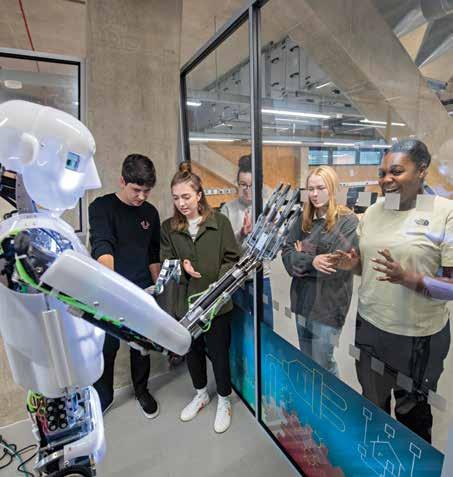
This course has been so eyeopening to a range of things to do with gender, race, class, and other social issues that are so crucial to understand. In the current political climate, more than ever, I think it is so important to question and challenge everything around you, and learning geography has taught me the critical skills I need to do this.
Backing you

Your background and experiences so far are what give you your unique perspective. At Brighton we know that when different perspectives come together, brilliant new thinking happens – and that’s why working to create a community that’s inclusive and diverse is so vital.
Globally mobile
After university, in my professional career, the progress made by being part of the Inclusive Practice Partners programme will stay with me. Having more diverse course content that includes people of different ethnic backgrounds, disabilities and genders will help me become better equipped to diagnose and treat a wide range of patients.



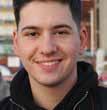
If your circumstances haven’t given you many advantages, then your journey to us is down to your own determination. You deserve to be able to make the most of your time here; to be bold and confident as you explore your studies, your ideas about your future and your place in the world.
There are scholarships and funds that you can apply for, and our friendly student advice team can advise on money matters – find out more on pages 82–83. And read more about our approach to admissions on pages 84 and 86.
Studying abroad is a fantastic opportunity to broaden your horizons and gain valuable skills and experience that will enhance your employability. Brighton has secured funding from the government’s Turing Scheme, which offers financial support to students for international study or work placements. You can travel anywhere in the world, as long as foreign travel advice provided by the Foreign, Commonwealth and Development Office (FCDO) is followed, and placements can be anything between four weeks to 12 months. Find out more at www.brighton.ac.uk/turing.

04
Chat
www.brighton.ac.uk/chat
MEET OUR STUDENTS
online to students at
and scan the QR code to check out their blogs and vlogs
Sophie, geography
Kristian, music business and media
Emmanuel, pharmacy
Coming to Brighton has allowed me to develop the skills and expertise needed to understand the current economy, and how we may tackle present issues. My course has enabled me to think critically and confidently express my ideas, as well as connecting with other people and hearing how their ideas may differ.
Rose, globalisation, history, politics and culture

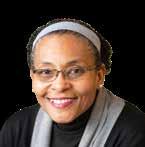




My course touches on various important contemporary issues, while developing my understanding through histories and analytical approaches. From introducing me to subjects such as the gay liberation movement during the 1970s to challenging the dominant, hegemonic viewpoints still around in the world today. My ability to discuss these concepts and develop my critical thinking skills has been honed at Brighton.
I am motivated by supplying students with the possibility of becoming explorers or researchers, even for two hours a day. My research interests are focused on helping to identify and reduce our impact on the marine environment, especially coastal life. A healthy natural environment has the power to improve our health and wellbeing and to create a thriving community.
The thing I enjoy most about my course is the application to real-world problems. I leave every lecture having learnt at least one thing that makes me reflect on my own personal life and perceive the world completely differently. This has made me a better person, because I have become more aware as a global citizen and try to engage in activities which promote more positivity in the world.
In 2008 we took part in a Channel 4 show to build a prefabricated house made primarily out of organic carbon-locking materials. It was the UK’s first A* rated low energy dwelling and it was 90% carbon locking materials. We reimagined and rebuilt it on campus, and it continues to be a teaching facility, research project and lab.
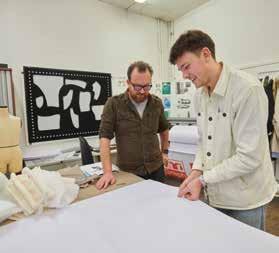
Anxhela, accounting and finance
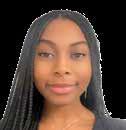
I moved countries to do my degree and I found a completely new culture in this university, from what I left back home. Since I arrived, I realised that here the university cares about wellbeing and inclusivity which makes me feel important and that I belong.
Dr



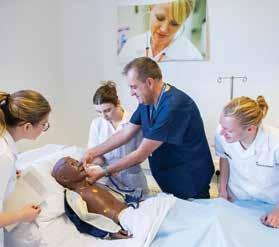
teaches early childhood education
Gender equality, reduced inequalities, peace, justice and strong institutions – these are all issues educators advocate for on behalf of the children and families they serve. Your aim should be to eliminate barriers to provide all children with a fair and equal chance of realising their individual potential.
05
Kacey, economics
Dr Corina Ciocan teaches ecology and conservation
Lesleann Whiteman
Duncan Baker Brown teaches architecture
Imani, psychology and criminology
When you apply to Brighton we want to hear about who you are. Grades are never the whole picture; we’re interested in things like creativity, resourcefulness, persistence and the capacity to think big and find new ways of doing things. We’ll encourage you to be curious and see where it leads, and we’ll offer you choice, flexibility and the freedom and support to succeed.
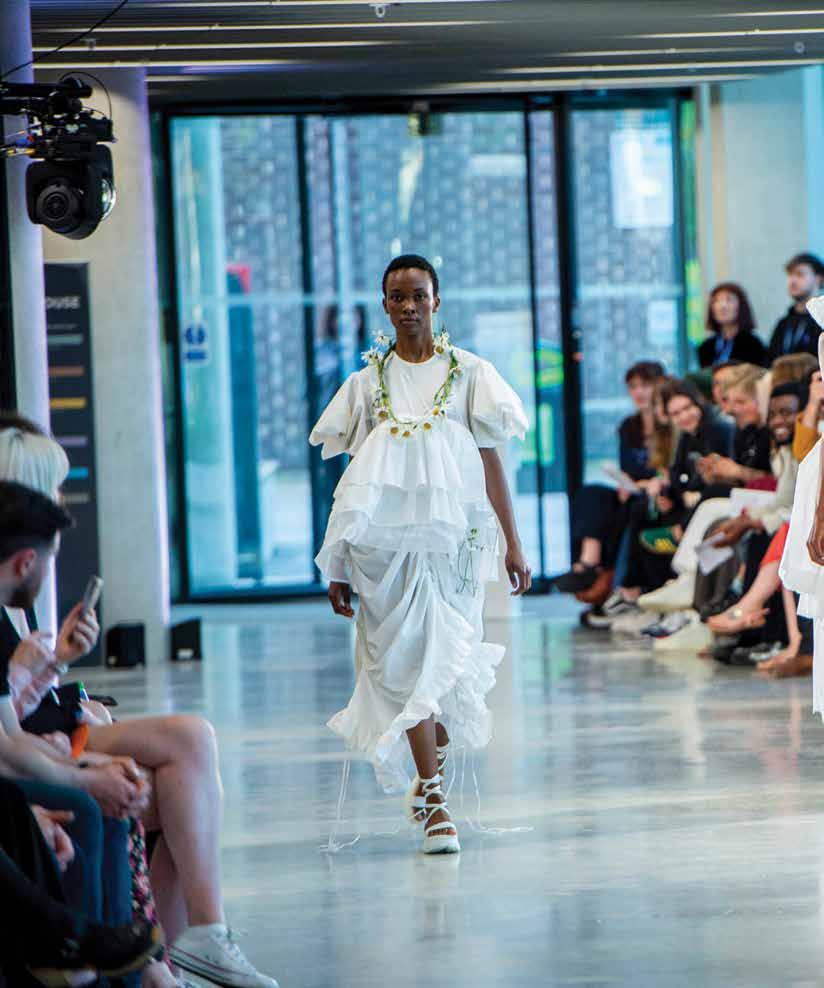
Levelling the playing field
One thing that our students all have in common is an experience of the pandemic, with all its disruption, uncertainty and isolation. You’ll have made many adjustments and shown your resilience and ability to adapt, but everyone’s outcomes will have inevitably been affected by these circumstances. And for some, the pandemic isn’t the only disadvantage they’ve faced.
That’s why we treat everyone who applies as an individual; we recognise a range of qualifications and we care about all of your achievements and the experiences you’ve had that set you apart. For more about our flexible admissions see page 86.
Better ways to learn
Our students have a learning experience that’s more varied and adaptable than ever before. Your learning will be primarily in-person and on campus where you’ll connect and collaborate with fellow students and our staff, but you’ll also have the advantage of some digital learning as we know our students value it. Being able to revisit materials at your own pace, the convenience of not always having to travel in to uni to talk to tutors, and more opportunities to develop digital and communication skills – we’ve built these benefits into your course in ways that enhance your face-to-face and hands-on experiences.
Ahead – and settled – from the start

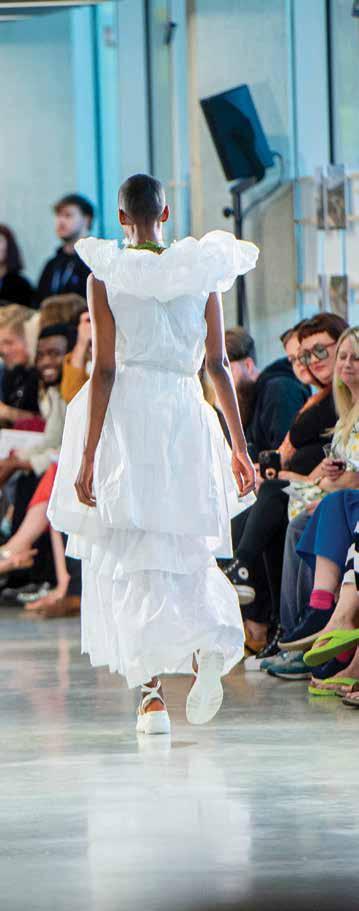
We’ll support you in the transition from school or college to university study well before you start your degree. Our Belong at Brighton programme includes guidance on how to prepare for your course, with tasks related to your area of study to build your knowledge and confidence. We’ll also give you insights into city life and advice on living away from home, so it will feel like a familiar place by the time you get here.
Joe, business management


There is so much more freedom studying a degree than in sixth form and it is a lot more tailored to my learning style. I like to find different ways to explore things, and find out why and how things are done, then we give it a try. There’s a lot more practicality than A-levels.
Kacey, economics

As someone who gets very anxious around assessments and deadlines, I was surprised at how relieved I felt at university as I was finally in charge of my own work. I could access as many resources as I needed (such as research in the library, or direct conversations with my lecturers or tutor), making my work much easier to handle.
Beth, automotive engineering
Engineering at Brighton has a great balance between theoretical, practical and software application. The facilities have allowed me to gain knowledge of welding, 3D printing, simulation data analysis and so much more. My course is particularly great at bringing in external engineers to share their experiences and insight into realworld engineering.

07
Final year collections by fashion design students on the catwalk at Elm House
Freedom to explore
All our degrees give you the flexibility to tailor your learning to your interests. You can choose the option modules, placement and volunteering opportunities that inspire you. And you can discover the topics that intrigue and excite you the most, then explore them in depth. You’ll be able to focus on what you love, and to create a course that’s as individual as you are.
Inclusive learning
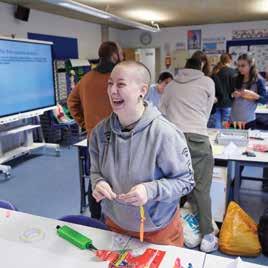
Our students have diverse talents and strengths and our courses are designed with that in mind. Your course will be made up of modules that allow for in-depth study, as well as opportunities for project work, collaboration and active participation in research. Modules are reviewed regularly to make sure that all parts of your course are accessible and inclusive. So, whatever your learning background you can make the transition to degree-level study – and influence how you learn and how you’re assessed.
Attributes for life
Knowledge is always evolving but the personal attributes that you’ll develop as part of all of our courses are with you for life. Find out more about the Brighton Graduate Attributes on page 13.
How we teach
You’ll be part of an academic community with connections to industry and the professions. You’ll get to know, and learn with, lecturers, technicians and visiting experts who love their subject, and who combine their teaching with professional practice and research.
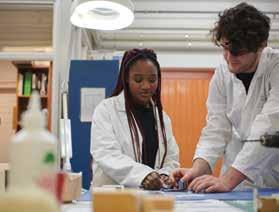
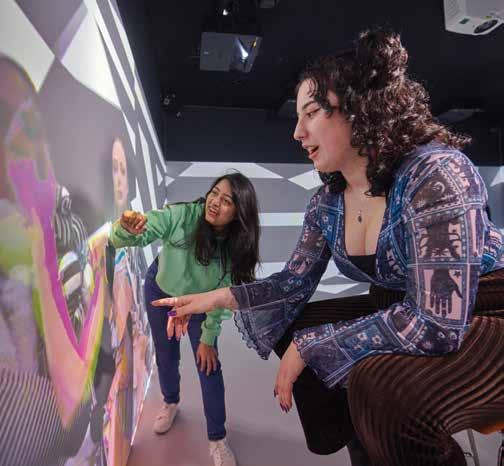
We are committed to:
• supporting the transition from school to university

• personalised learning and support
• close working relationships with professional bodies and employers
• problem-based learning – which develops the skills employers value.
Wiktoria, film
My lecturers are always sharing media like podcasts, articles and interviews with us. This has led to me really widening my horizons when it comes to consuming pop culture. What I like about my modules is that there are no tests; instead, we are evaluated based on the work we produce and essays/ video essays.

08
Sophie, geography

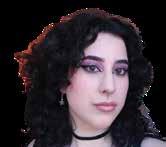
The student support network at Brighton is really good and covers all aspects of student life. Lecturers and teaching staff are easy to contact via email and quick to respond, to set up a meeting to discuss any issues with the work, answer questions, give feedback on assignments, or direct you to a different area of the support team.
Nick, paramedic science
University is much more personal than college. The big difference is that you are now studying something specific and likely special to you. Having access to lecturers that have worked the same career that you aspire to do provides a wealth of information. It’s great doing practical work with your classmates because everyone is as intrigued as you are.
Studying at university level will give you knowledge, experience and lifelong transferable social and communication skills that are beyond the knowledge you can learn from a book or online.
Istvan, computer science with cyber security
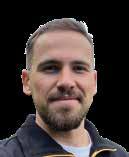
Our lecturers always have relevant, up-to-date experience in the topic they teach, while they are also interested in our ideas. Collaborating with other students has also been a key part of the course and it is really motivating to see how others are invested in group projects.
Chloe, philosophy, politics and ethics



Seminars are great for discussion. Sometimes I found myself struggling to understand a text, or found a point that I needed to talk about. I worked out that I needed to ask myself why and what it was about the text that I didn’t understand, and then brought those questions to the seminar to discuss and debate with other students.
I include real-life projects and examples in my teaching to help students understand how things happen in the industry. My modules involve lots of practical work so that students can apply the knowledge from lectures into practice to help them deepen their understanding of concepts.
Rose, globalisation, history, politics and culture

My favourite part about my course in particular is how well it suits my learning style. I get to fully flesh out my ideas and concepts in the safe environment of my seminars, which has really boosted my confidence and let me access plenty of different perspectives from fellow students.
Seniz, ecology and conservation
I have enjoyed the flexibility of choice in terms of assessments. I have been able to give presentations as a podcast, prerecorded video and in person. I feel this has allowed me to explore and develop my creative skills in a way I likely would not have done otherwise.
Dr Leonard Henry Joseph teaches physiotherapy

My teaching style is influenced by a student-centred approach. Ensuring a positive learning experience for the students has always been one of my core teaching principles. I enjoy creating a supportive and encouraging learning environment for them where they feel comfortable engaging and actively participating in their own learning.

09
Dr Sanaz Fallahkhair teaches human computer interaction
Dr Hannah Wood teaches construction and project management
Sixth form wasn’t great for me; I really struggled with the jump from GCSE to A-level and I got really stressed about the fact that the only form of assessment was one set of exams at the end of two years. Uni isn’t like that; there are multiple forms of assessment on my course, including exams, coursework, and OSCEs (live spoken exams, roleplay style), and they’re assessed at different points throughout the year. This takes some of the pressure off the end-of-year exam period and allows me to have a better idea of how I’m doing throughout the year.

Dave, social work
My tutor was supportive when I was struggling with an assignment. She gave me good advice and made it clear that she was there if there was anything I needed help with, personal or professional. This helped to put me at ease and feel comfortable in my new environment.
You’ll get to know your course team, who are there to help you. Along with your other tutors, your personal academic tutor and your course leader will keep an eye on your academic and personal progress. You’ll also have a student support and guidance tutor (SSGT) who can help with everything from homesickness, managing stress or accommodation issues. And if they don’t know the answer they will know someone who does (see pages 16–19 for more info).
Developing your academic skills

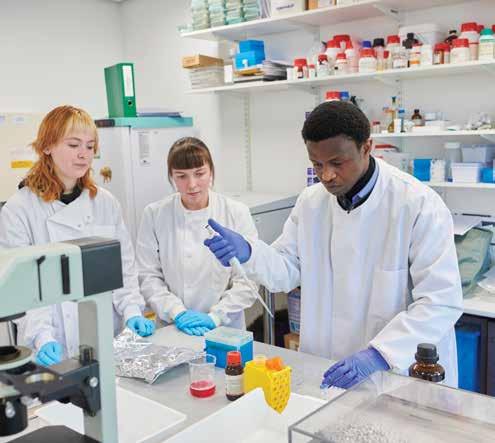
Ellie, media studies


Tasnim, primary English education

There is a lot more independent studying, but also a lot of interesting and relevant group discussions. Having seminars means we are able to develop a comfortable environment with our classmates. We’re able to have more meaningful conversations, and everyone is able to voice their thoughts and experiences.
Our Brighton Student Skills Hub will help you to build the skills you’ll need to study and learn effectively at university, and to achieve your full potential. The hub gives you access to resources such as personalised feedback on your written work, as well as workshops, seminars and tutorials to help with your academic writing. Whatever your level of experience so far, you’ll discover and develop skills that’ll enrich your time as a student and beyond. Find out more at www.brighton.ac.uk/studyskills.
I found the adjustment from A-level study to undergraduate work a lot easier than I expected thanks mainly to the methods of assessment. When I chose my course I prioritised coursework based over those weighted towards exams, allowing me to achieve my potential without my grades being affected by styles of work that don’t suit me.

FIND OUT MORE
Turn to page 20 for more about our campuses and the places you’ll learn – and visit our website for virtual tours www.brighton.ac.uk/virtualtours
10
Chat online to students at www.brighton.ac.uk/chat and scan the QR code to check out their blogs and vlogs MEET OUR STUDENTS
Eva, pharmacy
Kristian, music business and media

Being given the opportunity to tailor your degree to suit your specific interests is perfect, and combined with coursework-focused assessments, you truly feel like the degree is built for you. I have a close connection with lecturers, and know that they’re available to support me with any questions or concerns, no matter how big or small they may be.
Ousainou, philosophy, politics and ethics
My lecturers have pre-essay and post-essay tutorials with me, so I can learn and improve. They provide valuable feedback, and this has tremendously increased my confidence in writing and speaking.
Dr Vicky Margree teaches humanities

We know it can be hard to attempt something that makes you nervous, or open yourself up to consider viewpoints different from your own. What’s important is that students are recognised as individuals and supported in relation to their particular needs and interests.
Amy, sport and exercise science


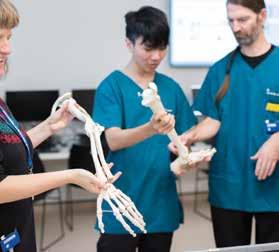
During your first semester, there are dedicated sessions where you learn how to use the library resources (both online and inperson) and you can also access this additional help throughout the year. I found these so useful during my first year.
Dr Simon McEnnis teaches journalism

At Brighton we have this excellent blend of thinking and doing. The academic learning underpins the professional practice and we’ve got graduates out there in industry doing really well. They’re innovative and creative in their practice because they really understand how to be critical and think about journalism in different ways.
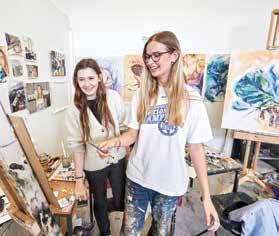
Imani, psychology and criminology

By collaborating with my peers, I have noticed that I gain a deeper understanding of certain concepts and it allows us to collectively build on our ideas. In addition, meeting like-minded people and knowing that you are not alone in your experience makes a traditionally scary transition a lot less intimidating.
Dr Celestine Ike Nwachukwu teaches business management with human resource management


I am passionate about teaching –it offers an opportunity to undertake a journey in learning, questioning, reflection and in finding solutions to actual organisational issues. We are committed to sustainable development goals, and we develop our modules and teaching objectives to align with core United Nations sustainable development goals such as inclusive education, gender equality, and inclusive and sustainable economic growth.

11
Brighton graduates are ready to respond to the world, whatever comes next. You’ll become confident in applying your knowledge and skills to make a practical difference, in developing the creative and critical thinking that leads to innovative ideas and new solutions, and you’ll grow the self-awareness and self-belief needed to connect with people, to lead and to bring about change.
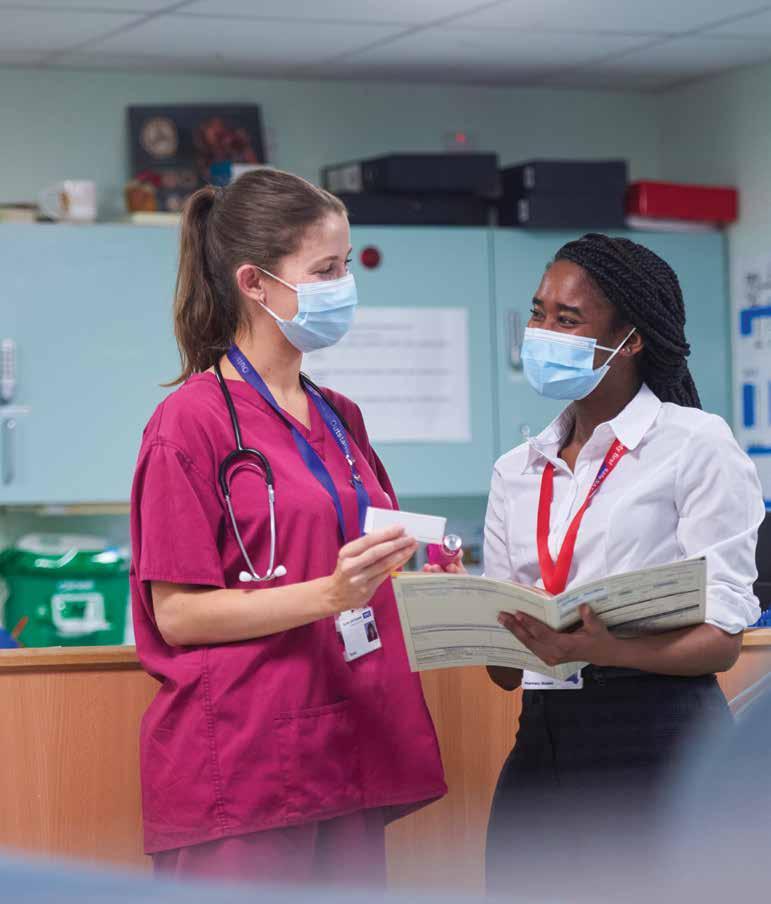
12
Our pharmacy students build confidence and skills on placements in hospital or community settings in every year of the course, gaining experience of providing care in a variety of settings.
SOLUTION-FOCUSED INNOVATOR


Each attribute comprises qualities and skills that you’ll develop and make your own while you’re at Brighton. For instance:
A RESILIENT SELF-ADVOCATE
RESILIENT SELF-ADVOCATE
RESILIENT SELF-ADVOCATE
Qualities
• Positive in attitude, with a growth mindset
• Interested in lifelong learning and self-development
• Proactive in identifying and planning personal and career development opportunities
Skills
• Evaluating strengths and relevant work experience
• Managing time
• Managing wellbeing
• Working independently
• Having self confidence
• Making choices and decisions that have a positive impact
We’ll help you to get as much as you can out of your time here, so that you can go on to find – or to create – work that excites and rewards you. You’ll need a combination of knowledge, skills, personal attributes and relevant experiences – our courses are designed to develop all of these. And our careers and employability team will work with you from the start on ways to practice and demonstrate them, so that you graduate with your qualification and a CV that stands out.
The University of Brighton Graduate Attributes
These are a set of qualities, characteristics and skills that we developed through research into what employers are looking for. You’ll work on your own personal version of these attributes while you’re here, both as part of your studies and through extracurricular activities and experiences.
Being able to refer to your own personal version of our Graduate Attributes will help you develop your CV with transferable qualities and skills, giving you freedom and flexibility when you make decisions about your career in the future.
Careers advice and support –all the way along
Alongside your course tutors, our professional careers and employability team can help you to understand how your studies and your activities translate into the sought-after Graduate Attributes. From day one they can help you to identify and work on gaps in your skills and they can help you think about what you want to do in the future, so you can feel confident that you’re making the most of your time at university. They can also help you find part-time work while you’re studying.
13
UNIVERSITY OF BRIGHTON GRADUATE ATTRIBUTES
CREATIVE AND CONFIDENT USER OF DIGITAL TECHNOLOGIES CRITICAL THINKER
ENGAGED GLOBAL CITIZEN
INCLUSIVE COLLABORATOR
CONFIDENT COMMUNICATOR
FIND OUT MORE www.brighton.ac.uk/graduate-attributes.
Chat online to students at
and scan the QR code to check out their blogs and vlogs
Work-related experience on your course
Our strong links with businesses, community partners and other employers create opportunities for our students to gain real-world experience.
Work-related experience varies by course, but might mean:

• a year-long paid placement, usually taken after the second year

• regular placements and workrelated learning completed throughout your course to achieve a required number of clinical or practice hours
• assessed voluntary work
• a four-to-six-week placement that is a credit-bearing module
• live project briefs, often informed by employers’ real requirements.
Apprenticeships
An apprenticeship is a job with degree-level study built in. As an apprentice, you work for an employer in a relevant role with time allocated for learning that is linked to your job. Apprentices need to find their job role before applying to the university.
Our higher and degree apprenticeships have been developed with employers and deliver nationally agreed Apprenticeship Standards – the skills and attributes that have been identified as necessary for a particular profession. Successful apprentices achieve a University of Brighton award such as a degree.
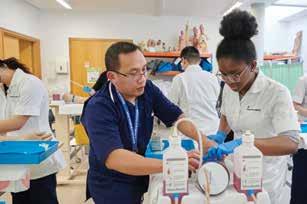
We offer apprenticeships across these subjects – business and management; construction, engineering and the built environment; education; and health and social care. Find out more at www.gov.uk/apply-apprenticeship.
More skills, more experiences, more connections
We can also help you to get involved in other activities designed to develop your attributes and employability.
• Sports, societies and clubs –interesting and fun stuff, and a way to make new friends and connections (see pages 28–31).
• Volunteering in the community –getting involved with community activities that you care about shows commitment and motivation.
• Working for the university – there are lots of ways you can be part of the campus community and get paid.

• Entrepreneurship – start your own project and develop your entrepreneurial skills with our help.
• Campaigning and democracy – add your voice to influence the future (find out more on page 30).
• Mentoring and supporting – selfdevelopment through mentoring others and being mentored.
14
MEET OUR STUDENTS
www.brighton.ac.uk/chat
Professional accreditation
More than 50 professional organisations recognise and accredit our courses. If your course has a professional accreditation, it could give you an extra qualification in addition to your degree, a licence to practise, or exemption from professional examinations. Some courses also include membership of a relevant professional body while you are a student here.
Top 50
Our dual approach to employability, as part of, and alongside your course, is one of the reasons why we are ranked in the top 50 universities in England for the number of our graduates who are in highly skilled employment or further study (Complete University Guide 2023).
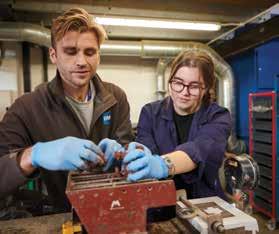
FIND OUT MORE
www.brighton.ac.uk/brightonworks
Undine, architecture
I have gained employability skills whilst studying architecture, including time management, various software skills and critical design thinking. By having a mentor, I have learned to recognise those skills and improve my CV.

Helia, civil engineering
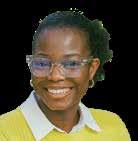


Through the careers team, I got involved with Active Student and found some volunteering work. The careers team were impeccable, helping me build and tailor my CV and finding opportunities that suited my preferences.
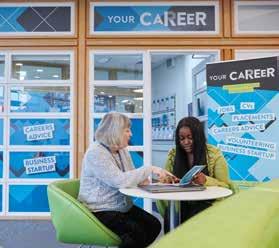
Kristian, music business and media


With support from the placements team, I was able to secure work experience with an artist development company. Not only did this provide me with real industry experience, references and direct connections with an employer, but gave me confidence to pursue something similar after my degree. And I’ve continued working with this company alongside my studies!
Ketan, physical education
I have gained employability skills throughout my course; communication, leadership, time management, team work and listening skills. And I had the opportunity to use these skills while working on placement. It has really helped me to gain real-life experience and skills that can be used in my professional career in the future.
Anxhela, accounting and finance
I had three appointments with the careers service this year and they were all very useful. The adviser gave me feedback on my CV that helped me secure a parttime job. I also joined a university mentoring programme. I had the chance to speak to someone who had an amazing work background and a lot of experience in the area I am interested in. I learned things I could have not known on my own.
Katy, media
I did a month placement with the Brighton Green Party, which gave me a great idea of what it’s like working in industry. I also took a module on social media, in which we worked in groups with a local organisation to facilitate a social media campaign for them, so that gave us first-hand experience of working to achieve a company goal.

15
We don’t just want you to succeed, we want you to feel good too; about yourself and your life, as well as your studies. It’s not just about knowing how to get help in the bad times – it’s about being part of a supportive community that builds you up. So as well as providing expert support, we also create ways for you to connect with and be there for one another. We’ll help you to prioritise your emotional and mental wellbeing to keep you feeling good.
05 You can talk to Brighton Students’ Union for independent, confidential and impartial support.
DAY-TO-DAY SUPPORT
01 02 Your personal academic tutor will help with your academic, career, and personal development, and you’ll have a student support and guidance tutor (SSGT) who’ll support and advise you on anything impacting your studies or wellbeing, from homesickness to managing stress.
www.brighton.ac.uk/ssgt
03 We have student information desks on every campus. Our friendly staff can help with a range of issues, from replacing a lost Unicard, to helping you connect with more specialist support services.
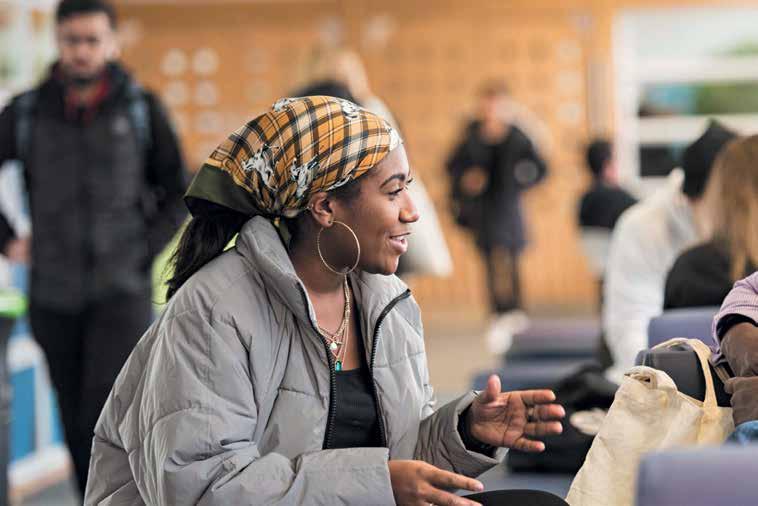
If you need advice but you are not sure where to begin, come and speak to us.
www.brighton.ac.uk/ studentadvice
04 If you’re living in university accommodation, the Residential Wellbeing team are there to create safe, supportive and inclusive communities. Alongside the staff team, experienced students live and work in our accommodation as mentors, providing friendship and guidance to new students and offering a programme of social activities.
www.brighton.ac.uk/ residential-wellbeing
www.brightonsu.com/ support
06 And there is focused advice and support for students who might be facing additional challenges at university, such as care leavers, estranged students and LGBTQ+ students. www.brighton.ac.uk/ careleavers
www.brighton.ac.uk/ estrangedstudents
www.brighton.ac.uk/lgbtq
07 Mentoring can boost confidence and skills and we have focused mentoring programmes matching students with mentors that they can identify with.
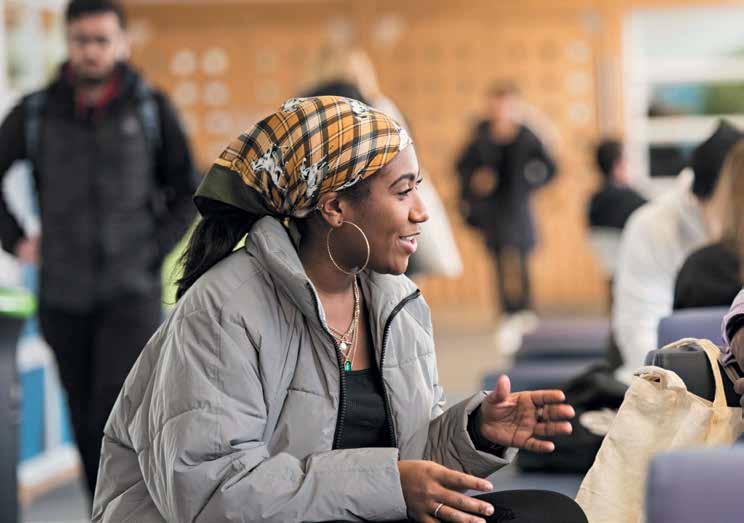
www.brighton.ac.uk/ mentoring
08 Our self-help ebooks cover key topics and issues from anxiety to bereavement.
www.brighton.ac.uk/ wellbeingresources
09 Our students have free access to Togetherall, a safe and anonymous online mental health support platform.
www.togetherall.com
10 Our Wellbeing Champions programme is all about student-tostudent support and enables students to learn about managing their own wellbeing and to support their peers. There are also peer-led wellbeing workshops, run by students who support one another in managing wellbeing.
www.brighton.ac.uk/ wellbeing-champions
16
BUILD YOUR SUPPORT NETWORK
11 The faith and spirituality team can offer pastoral support to students of all faiths and of no faith. www.brighton.ac.uk/faith SPECIALISTS
12 In times of need we can connect you to more specialist help, such as counselling. Our qualified counselling team can provide a needs assessment and short-term counselling in certain circumstances. www.brighton.ac.uk/ counselling
YOUR SUPPORT SYSTEM
13 Our disability support team is there for students with longstanding conditions such as physical disabilities, mental health, dyslexia and neurodiversity like autism and ADHD. The learning support coordinators can work with you directly to identify any support needs or adjustments and put together your individual learning support plan.
14 For medical needs, you can register with one of our local doctors’ surgeries whose services can be
accessed remotely, or on site at our Moulsecoomb campus.
www.brighton.ac.uk/health
15 Our disclosure response team offers fast, practical advice to students disclosing harassment or abuse and makes sure our students can get the appropriate help. www.brighton.ac.uk/
16 We offer and facilitate support for students with more complex needs, whether they exist before they arrive or arise during their time at university.
17 As well as strong links with local specialist support services, we can also make external referrals and speak to agencies local to you, when needed.
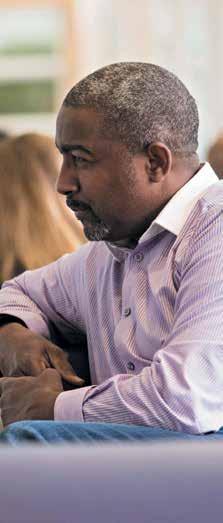
17
ON HAND
ENHANCED
SUPPORT
disclosureresponse
MEET SOME OF THE TEAM Complex needs Disclosure response team Counselling Disability support Student support and guidance tutor 01 12 13
16
15
Medical needs 14 External referrals
Studentto-student support 10 Self-help ebooks 08 Faith and spirituality 11 Togetherallonline mental health support 09 Personal academic tutor 02 Brighton Students’ Union 05 Mentoring programmes 07 Focused advice and support 06 Student information desks 03 Residential Wellbeing 04
17
Ruth is a student support and guidance tutor in applied sciences. SSGTs work in each academic school and students can go to them for anything
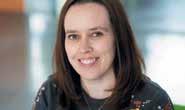
We have amazing specialist teams at the university but often students have a range of needs. Rather than having to go somewhere and sort out one thing and then go somewhere else to sort another, we can often deal with most of it.
Homesickness, loneliness, problems with their course – they’ll come and talk to us. Everybody gets stressed sometimes and that’s absolutely fine, we help students manage it so that it doesn’t become distress. We might help with an application for mitigating circumstances, put a learning support plan in place, get them some counselling support and talk to their personal tutor about things that need to be addressed.
We enable students to do the things they want to do for themselves by removing some of the barriers – it’s enabling and empowering rather than a parental role. I give students space, time, a listening ear and some guidance, and often they have the answers themselves.
George is a student information desk adviser – they work at Falmer but there are desks at every campus
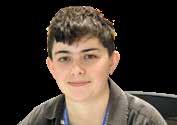
The student information desks team is a one stop shop for students looking for help and support, and most students will speak to us at some point. Most of the time queries are dealt with straight away; that could be producing a letter for a student, booking them in for an appointment, or advising on the steps involved in setting up some support. At other times we might refer students to specialists in the university if their needs are more complex. We’re often the first point of contact for connecting students with our wellbeing, disability and dyslexia, careers and student advice teams.
Whether at one of our information desks, via email, by phone or via a virtual call, students see or speak to a familiar face with us; we’re not rushing through students, we can have a proper conversation with them and find out what support they need. If students come to us distressed, we speak to them in a private setting, establish what they need and make sure they know they’ve got something in place, whether that’s an appointment, a drop-in session to come to or a list of contact details.
Amy is in the Wellbeing team, supporting students with issues or problems, whether they arise during their time at university, or exist before they arrive



Sometimes students have quite complex needs, they may have a long history of needing support and will have worked really hard to get to university.
We make sure that they’re connected to the right support outside the university too, because we recognise that although there are things that we do really well here, there are things that external agencies are the absolute experts in. An important part of my role is to meet students and find out what’s going on for them and where their needs could be best met. We know the specialist help that is available locally and how our students can access it as quickly as possible.
We work closely with the Brighton Students’ Union to raise awareness about some of the most common issues so that students know where to get support, know that we care about these issues and take them seriously, and to also help them recognise when someone else might be struggling or in need of support. Students can email any member of staff if they’re struggling and we will make sure that they get the support they need – we really encourage students to just let us know.
Marianne works with students and staff on student experience and equality issues to improve things for students from minority groups or students who face other barriers or challenges while they’re at university
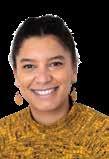
We want all students to feel valued and included and to easily access the support they need so that they can achieve their potential. I might work with a student who finds out they are pregnant and wants to know what support the university can provide, or a trans student who is at the beginning of exploring their gender identity and needs to speak to someone about what support is out there.
I also work with students who are at crisis point through the Disclosure Response Team. We are a group of trained advisers who provide practical guidance and support for students who have experienced an incident of bullying, harassment or violence and abuse. But any student who has queries and concerns about an issue that relates to equality and diversity can get in touch with me.
18
Your support system includes teams of advisers and specialists, all here for you. Here’s a bit more about them.
Amanda is in the Disability and Dyslexia team which supports students with medical conditions, physical disabilities, mental health conditions and learning differences
Some students might come to us with an identified condition that they’ve had support with before, whereas others may not have had any support at all. Some students might not realise they have a learning difference until they get to university and the workload intensifies. We can also help with temporary conditions, health problems and injuries.
A learning support plan is a set of formal recommendations that go to a student’s course team about how their learning environment can be adjusted to better suit their needs. Adjustments might include extra time in exams, extensions to deadlines, or allowances for different presentation styles. It might just be that they need to be able to use a voice recorder in their lectures or an ergonomic chair in exam scenarios.
We help students to find their own pathways that are suited to the way they learn. It’s about upskilling students and making sure that once they’ve left university, they feel enabled to support themselves and go off into the world of work more equipped.
Noel is a staff residential advisor, in the Residential Wellbeing team
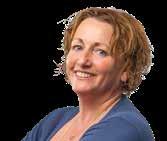


We’re here to support students living in university accommodation. The kind of wellbeing support we offer includes giving advice, telling students about or referring them to other specialist services, liaising with different support services at the university on their behalf and generally being there for students through the transition of living away from home.
Our student residential advisors (RAs) are senior students who are trained to give support to their fellow students. Together with our student RAs we organise events to bring students together and create an inclusive and positive living environment for our diverse student community.
Graciano is a mentor to students on our Identity Mentoring Match programme which aims to match students and mentors affiliated by their skin colour, background heritage or a shared experience of being racialised
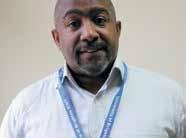

One of the main aims of the mentoring scheme is to identify role models for students that they might not meet on their courses. People naturally want to engage with familiar people who make them feel comfortable.
My role as a mentor is to be somebody who’s available to listen. We’ll talk about anything really, it could be something related to their next assignment, it could be something related to an incident in a classroom or it could be, “What do I do next in my career?” It’s possible to talk about it all.
What mentoring does is give you some key tools – your mentor can share their tools and techniques with you, which allow you to plan and tackle issues and create a different mindset. It’s empowering. Mentoring strengthens people’s resolve to achieve what they want to achieve. It helps people to identify how to do better in whatever they’re doing, so they can move on to the next stage of their life.
The Residential Wellbeing team is often the first point of contact for students who need wellbeing support and our staff residential advisers are on call every night of the year, including weekends and bank holidays.
For more about mental health and wellbeing at Brighton, visit www.brighton.ac.uk/wellbeing.
19
FIND OUT MORE
We are proud of the great places we’ve created for you to learn and live in –inspiring, inclusive, accessible and sustainable spaces where you’ll be learning alongside students with shared academic interests. As well as giving you access to the facilities you’ll need to succeed, being on campus is where you’ll connect and belong.
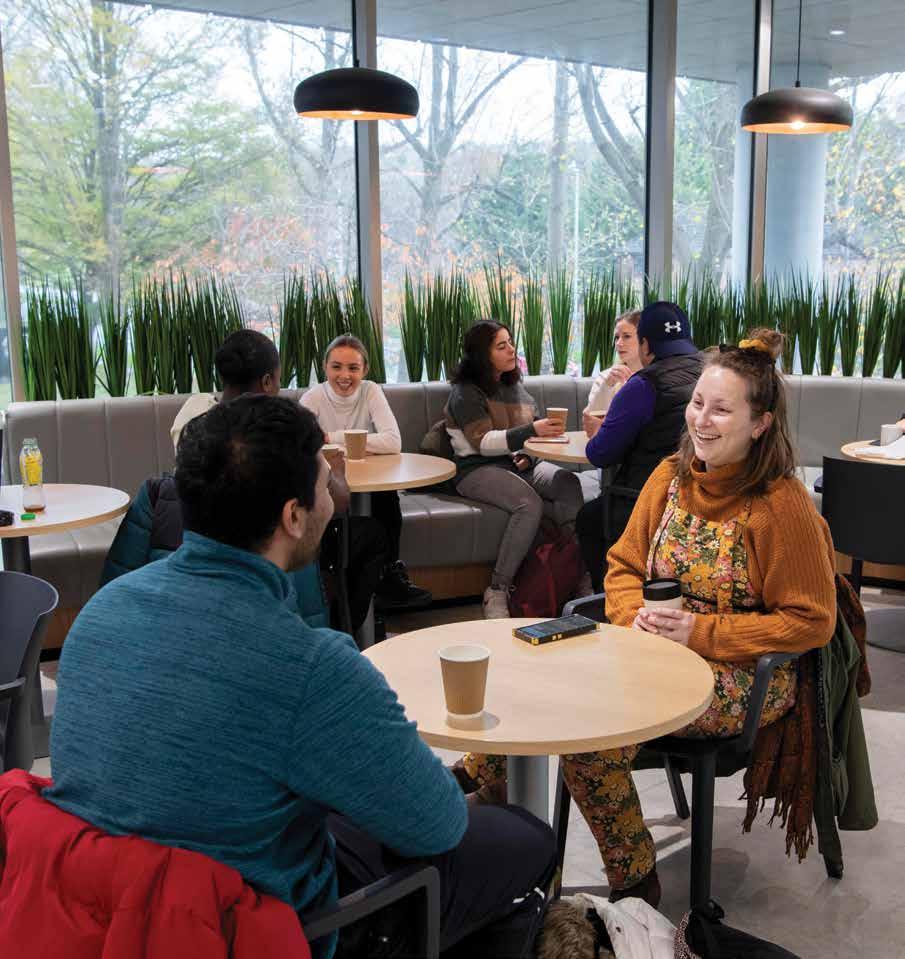
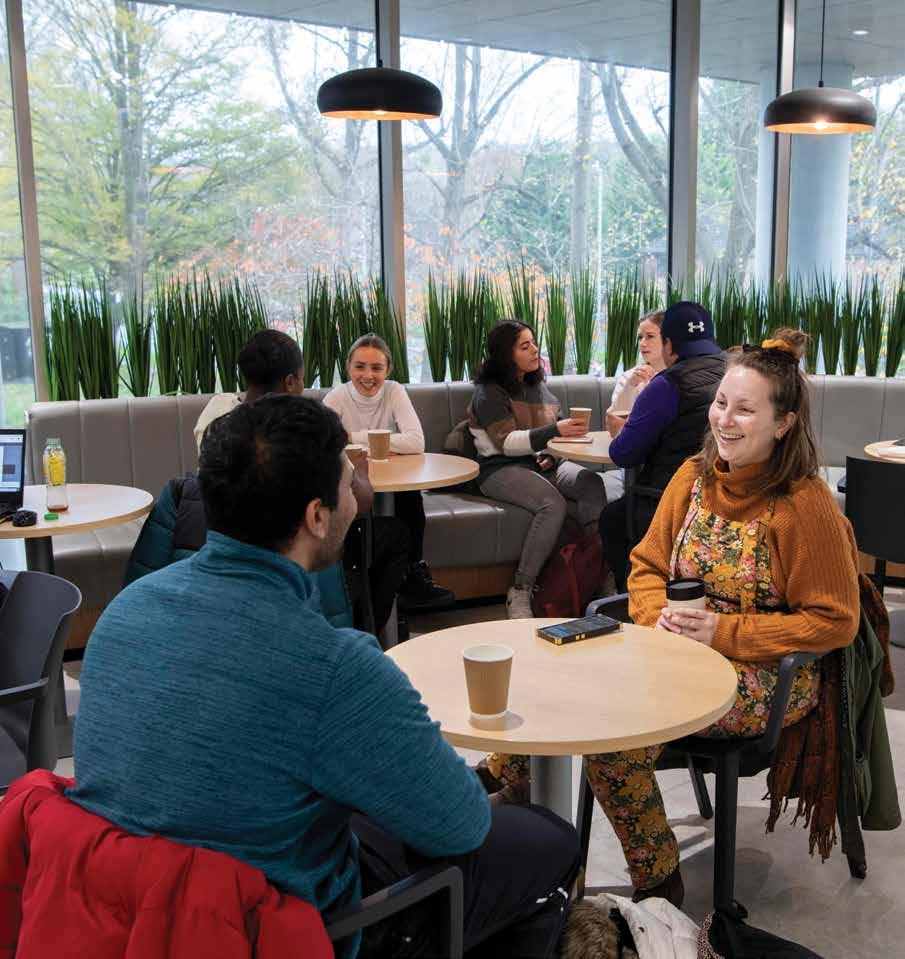 MOULSECOOMB CAMPUS
MOULSECOOMB CAMPUS
Your course will be based at one of our three campuses in Brighton: City, Moulsecoomb and Falmer. Each campus has been designed for the subjects that are taught there. All have halls of residence on site, so you could be living within minutes of your classes. And Brighton is so compact; moving between campuses is easy and you can choose where to go to study, eat, work out or catch up with your friends.

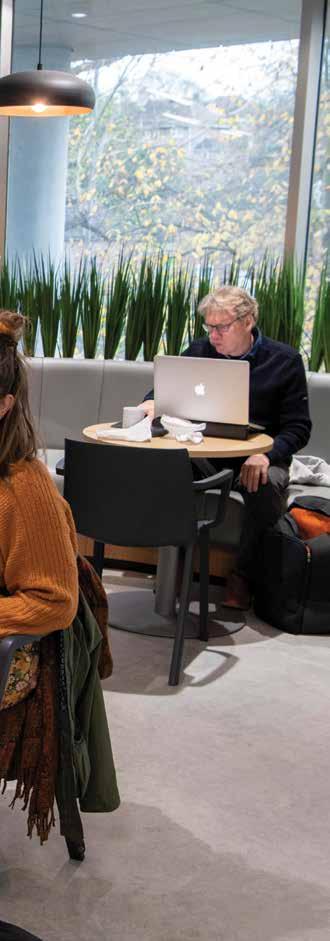
CITY CAMPUS IN THE HEART OF OUR CREATIVE CITY

01 Our city centre campus is home to 3D design and craft, fine art, graphic design, illustration, digital music, digital media design, fashion and textiles, media, photography and film. Our centre for contemporary arts, Brighton CCA, is based in our theatre and galleries and facilities for making and designing, workshops, studios, archives and the independent arts organisations based on site make for an inspiring creative environment. All within minutes of the beach.
MOULSECOOMB CAMPUS MOULSECOOMB CAMPUS A PLACE TO COME TOGETHER
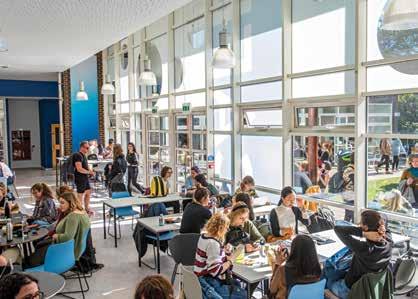
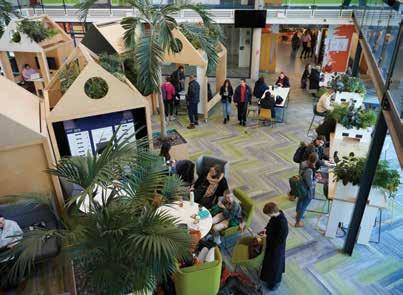
02 Wherever your classes are, you’ll want to spend some time at Moulsecoomb – it’s our biggest campus and student village and half of our students are based there. There are five halls on campus, as well as the Students’ Union bar and a gym with cardio and weights suites, studios and a programme of classes.
Students studying subjects like architecture, business, computing, construction, engineering, geography, product design, law, pharmacy, journalism, creative writing, politics and psychology are all based there and buildings like Elm House and Mithras House have been designed with big communal spaces for everyone to meet. Moulsecoomb is just two miles from the city centre and seafront and it’s an area that the city is investing in, with new cafes, shops and social spaces – plenty of places for our students to enjoy and be part of the community.
21
FALMER CAMPUS
CITY CAMPUS
Brighton Palace Pier
Brighton train station
Moulsecoomb train station
Falmer
train station Brighton Marina
MOULSECOOMB CAMPUS MITHRAS HALLS AND STUDENT VILLAGE
VARLEY PARK
FALMER CAMPUS CITY CAMPUS
Stanmer PADDOCK FIELDS AND GREAT WILKINS PHOENIX BREWERY
A270 Lewes Road
A27 A27 A259
A23 London Coldean Lane London Road
AMERICAN EXPRESS COMMUNITY STADIUM i360 01
02
03
FALMER CAMPUS WHERE THE CITY MEETS THE COUNTRYSIDE
03 All our education, sport and health sciences subjects are based at the Falmer campus with its great facilities and beautiful surroundings. It’s a short ride on the bus or train – or there are cycle lanes all the way from the city centre. There are halls on campus, fantastic sport and fitness facilities, as well as places to eat and a Students’ Union cafe and shop, so you can be living and studying on the edge of the South Downs with the city centre and seafront just four miles away, within easy reach. And Falmer draws visitors to it: Premiership Brighton & Hove Albion’s Amex stadium and beautiful Stanmer Park are next door.
Getting around
Brighton is known for its green attitude so there’s a brilliant infrastructure of cycle paths and bus routes, and Falmer, Moulsecoomb and the city are also all connected by train. But it’s so compact and easy to get around, if you can, you’ll choose to roam on foot.
Where you’ll learn
As well as tutorials and lectures, lots of our courses involve learning in realistic simulated environments, with equipment and facilities that replicate those in industry and professional workplaces. Whether you’re working in a lab, a studio or a simulation suite, you’ll have support from technicians who’ll help you to develop new skills.
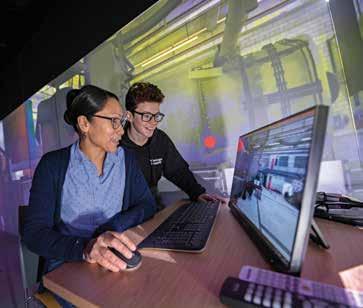
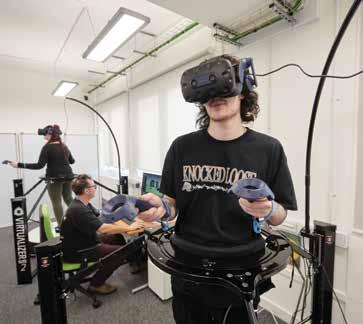
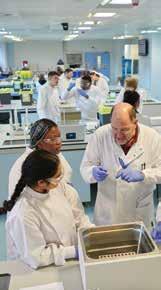
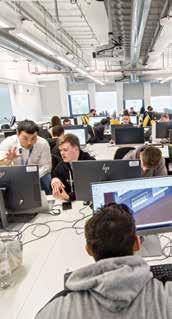
There are libraries at all of our campuses, with extended opening hours into the evening and weekends. You’ll also use the online library, with thousands of ebooks, databases and full-text journals. Our team of information professionals are on hand to help you find the specialist resources you need and get the most out of the library resources.
FIND OUT MORE
To see where your course is based, check the course lists (pages 38–43) or online at www.brighton.ac.uk/courses
For more on Brighton see pages 24–27 and the map on the inside back cover.
Wiktoria, film


I like how City campus is central – it’s literally in the heart of the city which makes it easy to socialise with my classmates. By far my favourite part is the kit room. It’s filled with industry-standard cameras and equipment available to take out any time we want.
Kerry, Education
We can use the library on any Brighton campus. I like being able to study even when I’m in town. The number of books we have access to is incredible. I love using the libraries when I’m on a break from lectures and the online library is a go-to for any research.
22
I am based at Moulsecoomb campus and absolutely love the modern feel and resources available; classrooms are big in size and always have great technology, and it’s a lovely environment to learn in. There are also lots of cafes and a huge library, which are great spaces to meet with peers and get some further learning done outside of lectures.
Although I study at Moulsecoomb campus, I often visit Falmer campus for sports, it’s only 10 minutes on the train from the city centre. I used to live close to City campus so I used St Peter’s Library a lot. I love that it’s in an old converted building, it’s retained the vintage vibe on the inside which is really nice, and although I study pharmacy I’m always intrigued by the old art and fashion books they have in there.
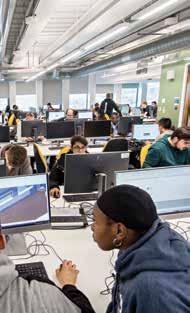
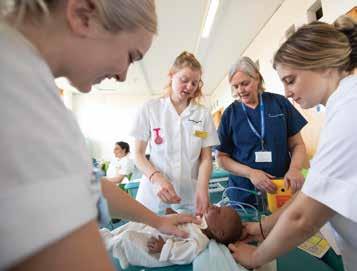
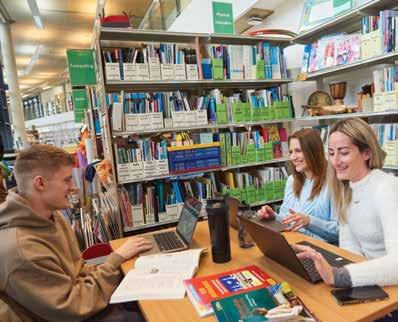
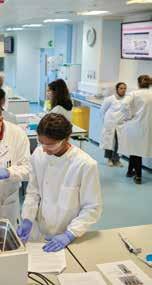
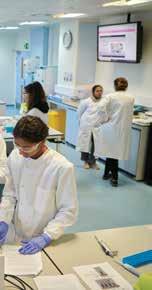
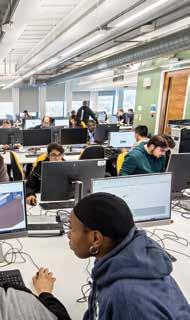
Kristian, music business and media




During my time on Moulsecoomb campus, I’ve watched the spaces transform around me. With modern study facilities equipped with specialist technologies like a professional TV studio, sound booths and photography spaces –the campus is a hive of activity for people looking to be creative and do big things. There’s also new spaces to collaborate, socialise and relax – like the student bar located in the heart of the campus.
I enjoy studying in the Aldrich library. There are laptops to use which I find so helpful for doing coursework when I don’t want to bring my laptop in. It’s divided into different floors which allow different levels of noise; I like studying in the quiet areas on the top floor where I can concentrate on my work without interruptions, but I also enjoy being on the ground floor where I can talk, hang out with friends and take breaks.
Angelica, English literature and creative writing

I love studying at Falmer because the views from the classrooms are beautiful, and I love being so close to Stanmer Park, as I often go there for walks before or after lectures.

23
Emmanuel, pharmacy
Kacey, economics
Eva, pharmacy
Brighton is a special place to live. It’s stimulating, exciting, inclusive and friendly: big enough to be inspiring and small enough to feel like home. A city with a beach on the edge of beautiful countryside, Brighton is a place where everyone belongs.
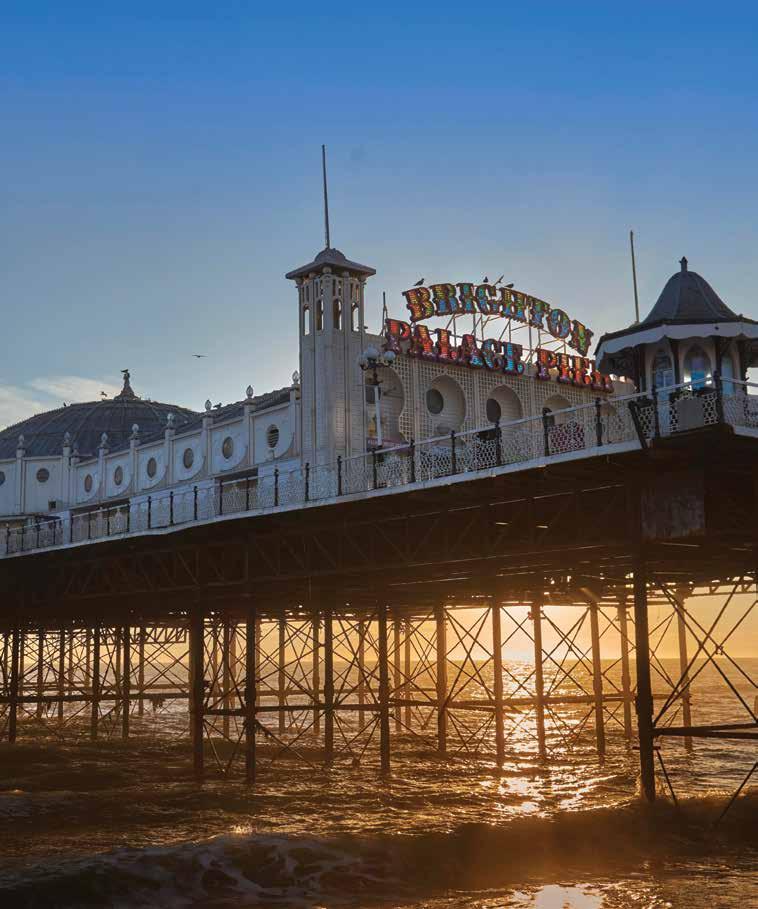
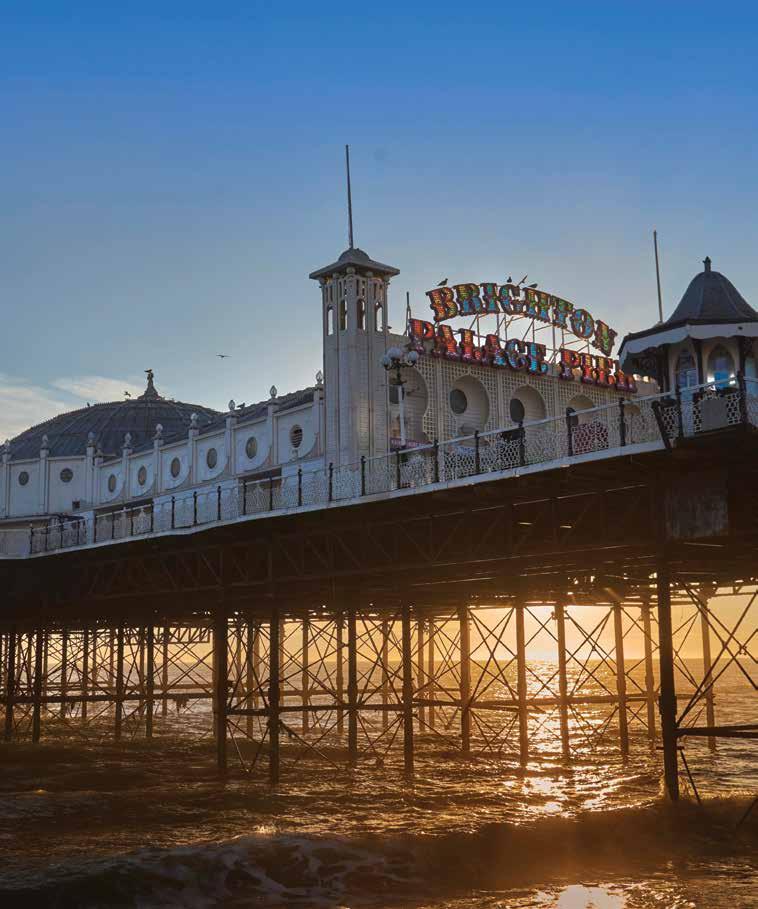
24
We have a real affinity with our city; Brighton is a place that looks at the world differently. Independent and inclusive, it attracts all kinds of people, often united by a commitment to positive change. It’s also a true student city – around 14% of people living here are studying. Its reputation for fun goes without saying, but it’s also known for being forward-thinking – it leads the way in arts, creative technology and the environment, and there are amazing opportunities to build on your studies by getting involved in city life.
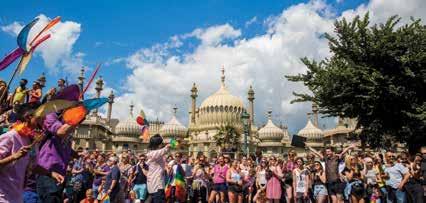
There are visitors all year round, and there’s an amazing variety of things to see, do and experience. The Brighton Festival takes place in venues across Brighton throughout May and, along with the Brighton Fringe Festival, is known for being ambitious, daring and original, just like the city. The Great Escape happens at the same time, bringing a showcase of new artists to venues across the city, turning Brighton into a music festival. Brighton & Hove Pride is the UK’s biggest Pride protest; the powerful Pride Community Parade culminates in a big party, a mix of celebration and campaigning at the heart of the event. It’s a city that cares about big issues and a place where people take action.
Events like the iconic London to Brighton Bike Ride, the Brighton Marathon, beachside water-sports festival Paddle Round the Pier – and our much-loved Premiership football team, Brighton & Hove Albion – show the city’s sporty side. It’s a great place for health and wellbeing. And there’s the undeniable feel-good factor of being on the coast, from the fun of sunny beach days to quieter times with that soothing 180 degrees of open water. Mentally and physically, being here does you good.
Nick, paramedic science

I love this city! It’s bursting with life and variety, and it’s this diversity that draws so many of us to it. Brighton has the beach and countryside on its doorstep –the best of both worlds. Nothing beats sitting on the beach on a glorious summer day with my mates and enjoying the liveliness brought by the various bars playing music and assortment of visitors. And I love that ‘only in Brighton’ is a such a well-used phrase!
Seniz, ecology and conservation

There is something about Brighton, it is such a breath of fresh air. I find the people to be more inclusive and accepting, for example in fashion you see all sorts here. People can wear whatever they want, and I feel it boosted my confidence to dress however I wanted too. I think it is a great place to learn independence and self-discovery!
Undine, architecture


Brighton is filled with creativity. My favourite activity on the odd Friday out has to be going to the local pub where they hold openmic nights or have a gig going on. I would advise anyone to immerse themselves in the Brighton music scene.
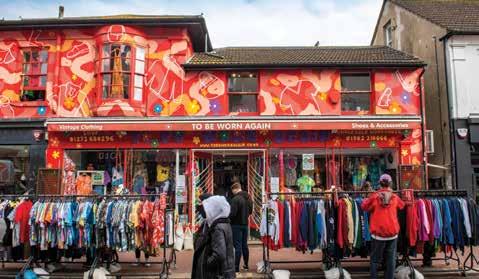
25
Katy, media
I love how eco-centric it is; there’s so many options for vegan food, eco shopping, zero-waste options... It’s also a small city, so you can walk everywhere, and for a country girl like me it doesn’t feel too stressful!
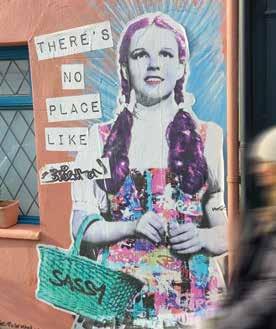
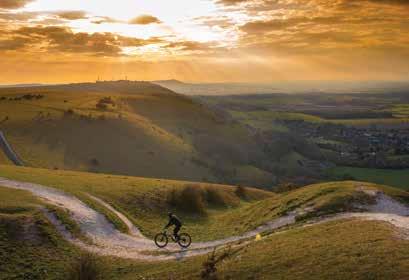
Imani, psychology and criminology


I love living in Brighton! From the minute I arrived everyone I met was extremely kind and accepting of difference. What I love most of all is the calm atmosphere, the friendly people and the closeness of the beach giving it a very relaxed and open feel. In Brighton you can be as expressive as you want without judgement, which I think is what makes this city so unique.
Istvan, computer science with cyber security


Brighton is the be-all and endall location to be a student. It is without a doubt the most inclusive and laid-back location while there is always something happening. If you wrote a list of art, leisure, sport, or social activities that you can think of there is a good chance they would only be a short bus ride away (if not in walking distance).
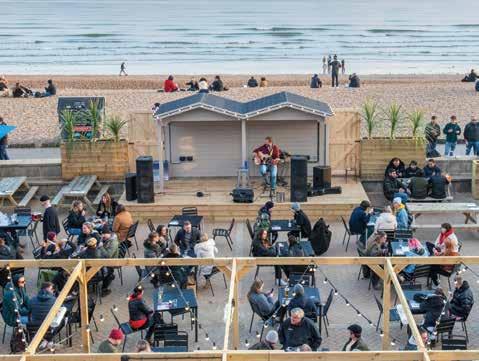
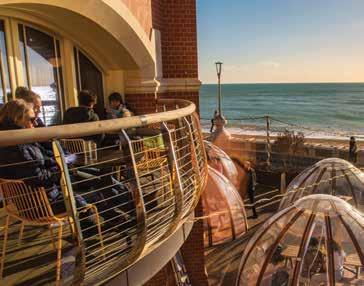
26
It’s the perfect combination of sea, city, nature and leisure, and you’re never far away from something new, or someone you have lots in common with! The community is accepting, and you can truly be yourself here. Whether you live near the Lanes, the seafront, Moulsecoomb, Falmer or beyond, there’s always a connection to the city centre, making it super accessible too.
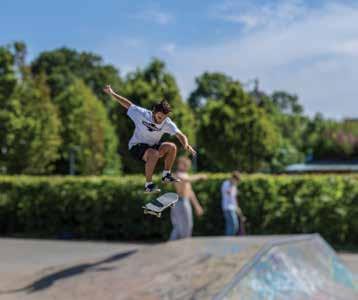

Brighton is such a brilliant place to live, it’s fun being so close to the beach and the South Downs, and I like that it’s a small city as it’s easy to get to know your way around and feel comfortable walking everywhere. The city has a really strong character to it, especially because of all the quirky independent shops in the Lanes that you can wander around for ages.
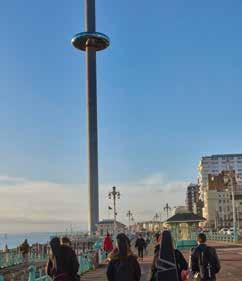

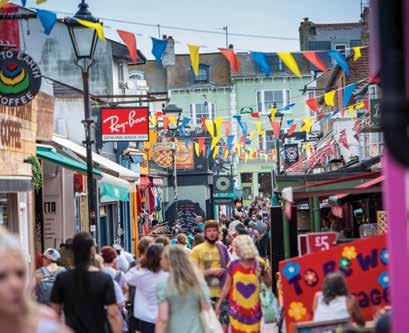
I love how non-judgemental the whole city feels – there are so many dedicated LGBT spaces and meetups, sober and otherwise; and there’s a focus on LGBT mental and sexual health that I haven’t seen in other places. It also means you’re very likely to bump into LGBT people in town, on your course, and in other places you frequent –it’s easy to feel like you belong.


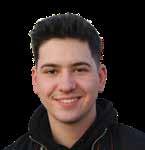


27
Kristian, music business and media
Sophie, geography
Eva, pharmacy
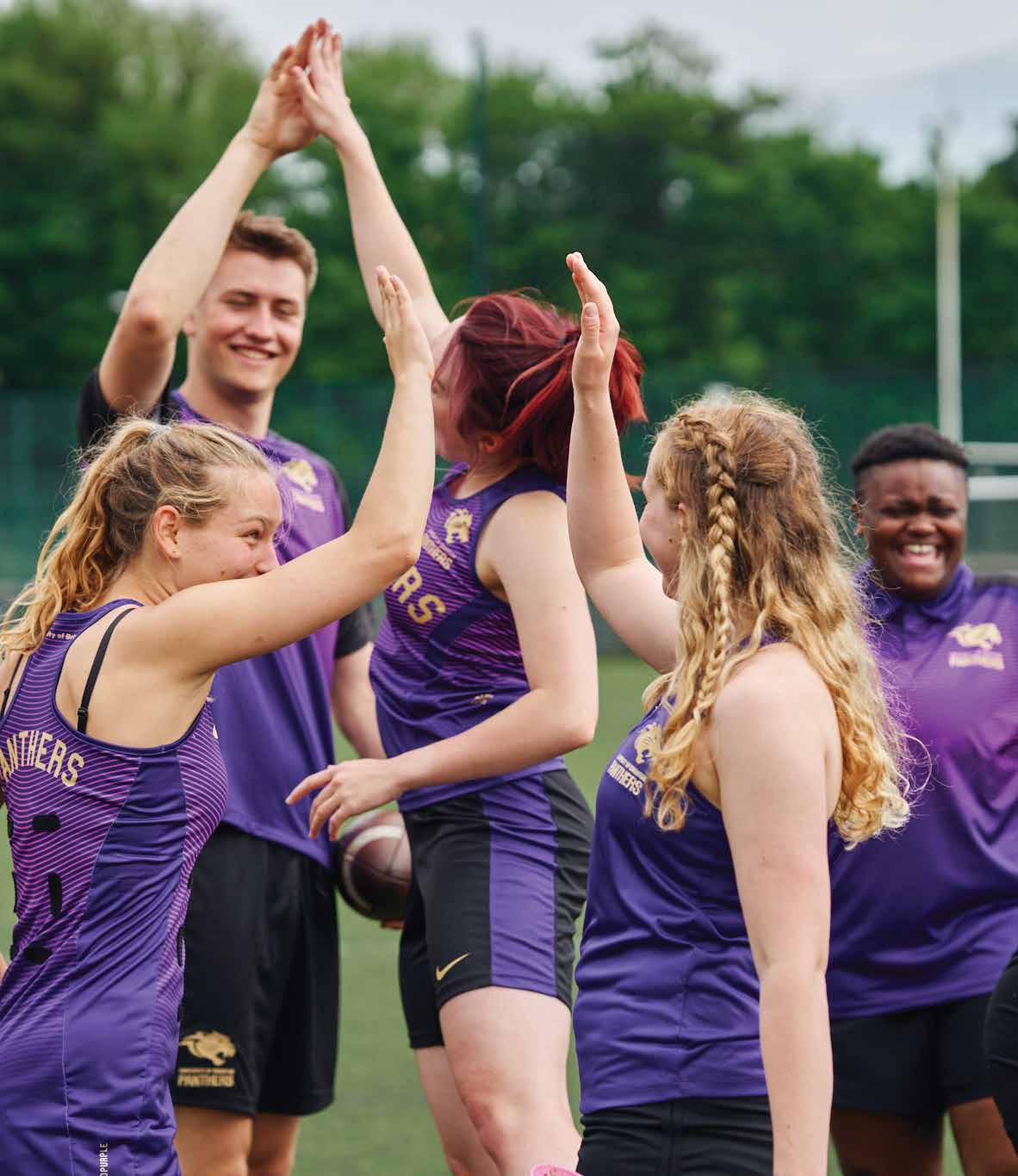
28
It’s not just your studies that can open up exciting possibilities –your life as a Brighton student will be full of chances to explore new things, learn new skills and make new connections.
Whether you want to compete, keep fit or just have fun and make friends, Brighton is a great place for sport and being active – and there are lots of ways to get involved.
Gyms and sports facilities
We invest in our fitness facilities and they are open to all of our students. At Moulsecoomb the on-campus gym, which opened in 2022, has a cardio and weights suite and a studio with a programme of classes. And if you join us in 2024 you’ll be among the first to use the newly renovated gym and indoor sports facilities at Falmer campus, including tennis and badminton, netball and basketball courts, alongside an indoor swimming pool.
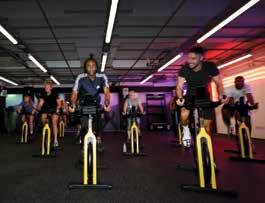
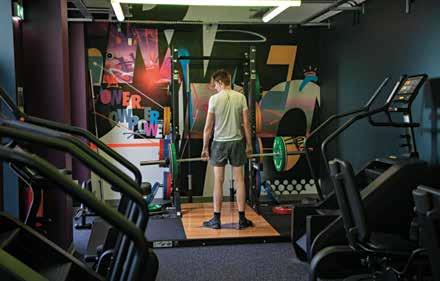
Parklife
The Parklife programme is all about playing your way, with leagues or oneoff sessions across all kinds of sport and fitness activities, from bouldering to ice-skating. Sport can play a key role in developing employability and through our volunteering programme you could
build skills in coaching, leadership, event organisation, administration, media and communications.
Brighton Panthers
Student clubs at the university are known as the Brighton Panthers. There are over 40 clubs for lots of different sports. If you’re looking for something a bit more competitive you can join one of our 32 sports teams that compete in the BUCS (British Universities and Colleges Sport) leagues against other universities.
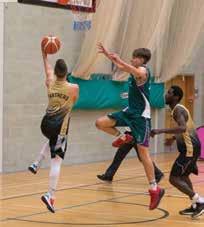
Sports Performance Programme
We support athletes competing at high levels by providing strength and conditioning coaching, lifestyle mentoring, physiotherapy and performance workshops. We are also an accredited Talented Athlete Scholarship Scheme (TASS) delivery site.
www.brighton.ac.uk/sportbrighton
@sportbrighton
@SportBrighton
SportBrighton
Ketan, physical education

Parklife is a really nice option to play any sport and interact with new people from different courses. It’s extremely flexible as it’s for recreation and can be joined by anyone. You make new friends, train with them, be sociable, and keep your physical and mental health in a good state – and it helps with social, personal and employability skills.
Faye, business management with finance



I joined Brighton Panthers Dance Society. The best thing was to meet others who have similar interests as me. Our BUCS competition will go down as the best day for me at university; it was full of high spirits and energy. We also go to Loughborough Dance Competition, where we compete with other universities, which is a fun weekend trip away!
Sophie, geography
The new facilities at Moulsecoomb are really great; the gym is located right on campus and next to a bus stop, and the staff are very helpful if you are new to any of the equipment or classes. The Students’ Union bar at Mithras is also a really nice place to relax with other students and get drinks after lectures.
29
MEET YOUR STUDENTS’ UNION
We’re here to make sure your experience at the University of Brighton is the best it can be. As soon as you become a student at Brighton, you’re part of our community!
We campaign with and for you
Our main role is to represent all students on all courses to make them the best they can be. We do that through elected officers and course representatives, feeding information to and from students and the university – all helping us to make student life better.
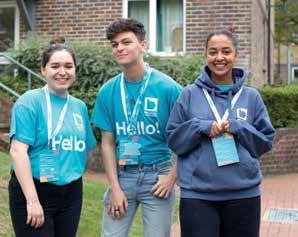
There are more than 100 societies
From ArabSoc to the Wellbeing Society, these groups are studentled and can be related to culture, faith or leisure as well as academic subjects.
You can work with us
We employ more than 100 students in our Brighton SU cafes, bar, shops and events teams.
We have social spaces, cafes and shops
We have student-friendly, convenient cafes and shops on campus. And our main meeting place is at the student village on Moulsecoomb campus with a bar and events venue.
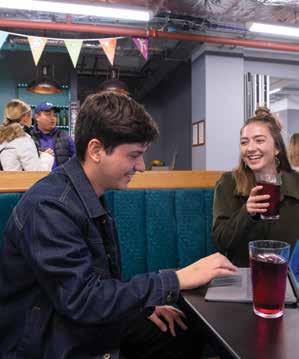
And lots of events
From big annual events like Freshtival to weekly club nights and smaller student-led events, there’s something for everyone to get involved with and enjoy regardless of music tastes and budgets.
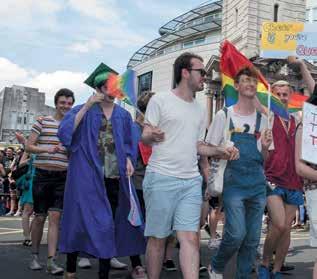
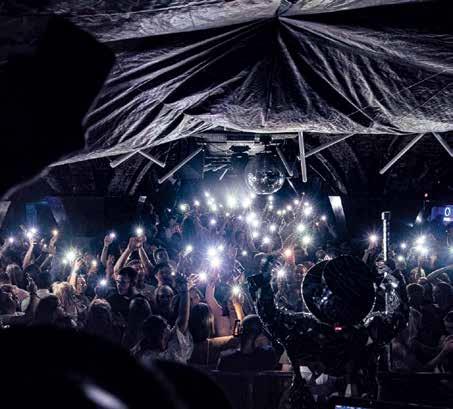
We’re here to help
Sometimes things just don’t go to plan whether that’s with your course, your home or your finances. We offer free, independent and impartial advice to students when you need us most. And we understand the issues that affect students the most, focusing on ways that we can help.
brightonsu.com
@subrighton
@SUBrighton
brightonstudentsunion
30
©Scott@ingrained.co.uk
Kristian, music business and media

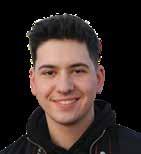
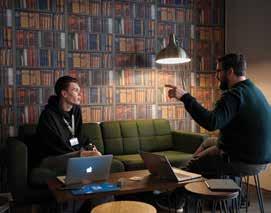
Societies and social groups at the university help draw the line between work and play, letting you participate in something completely new, or meet new people in a sport that you’re already passionate about. If you’re unsure, societies have representatives who are on hand to answer your questions and help you get stuck in!
Seniz, ecology and conservation
After coming back from placement year I was eager to try out new societies. I joined the ecological society to explore my interests with like-minded people. I also joined BIOSOC to meet people from other areas of science and branch out. It has allowed me to gain new experiences and meet people from different backgrounds and lifestyles.
Rose, globalisation, history, politics and culture


I knew I wanted to be part of a society while at university, and Brighton offers plenty to choose from. In year 2, I joined the socialist society which has helped me meet some amazing people with similar passions to my own and provided an excellent outlet to express what I believe in. Getting out of a heavy work cycle every week has also been excellent for my mental health, it’s so important to take time out for something you enjoy.
Eva, pharmacy

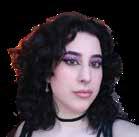
Trying new things and getting out of my comfort zone has been the best part of my university experience so far. I joined the Jiu-Jitsu club in my first week of university; I’d never done any martial arts before, but I watched a video at their Freshers’ Fair stall and was hooked. By second year, I’d become the president of the club! I also joined the archery and climbing clubs; Brighton Panthers membership covers multiple clubs, so it makes sense to try out new sports to get the best value out of your membership.

Anxhela, accounting and finance

Recently I have joined the Women in Business Society and I am Vice President Social. I have always believed that showing up is the most important thing. You always learn something new by participating in events and activities.
Ugonna, biomedical science
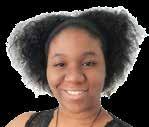
Societies are communities of their own that allow you to learn new skills, gain knowledge and make lots of friends. The best thing about societies is that you get to meet all types of people from different courses.
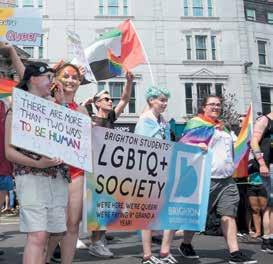
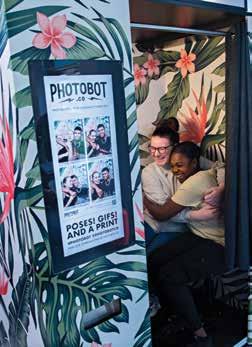
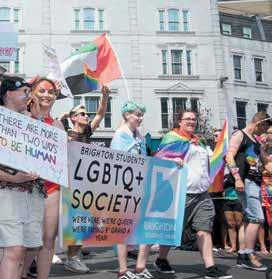
31
You’re guaranteed an offer of a place in our halls, all in locations on, or near to, our campuses. On-site facilities, all-inclusive rent and ready-made communities backed by our Residential Wellbeing team can all make your move to student life straightforward, supported and sociable.
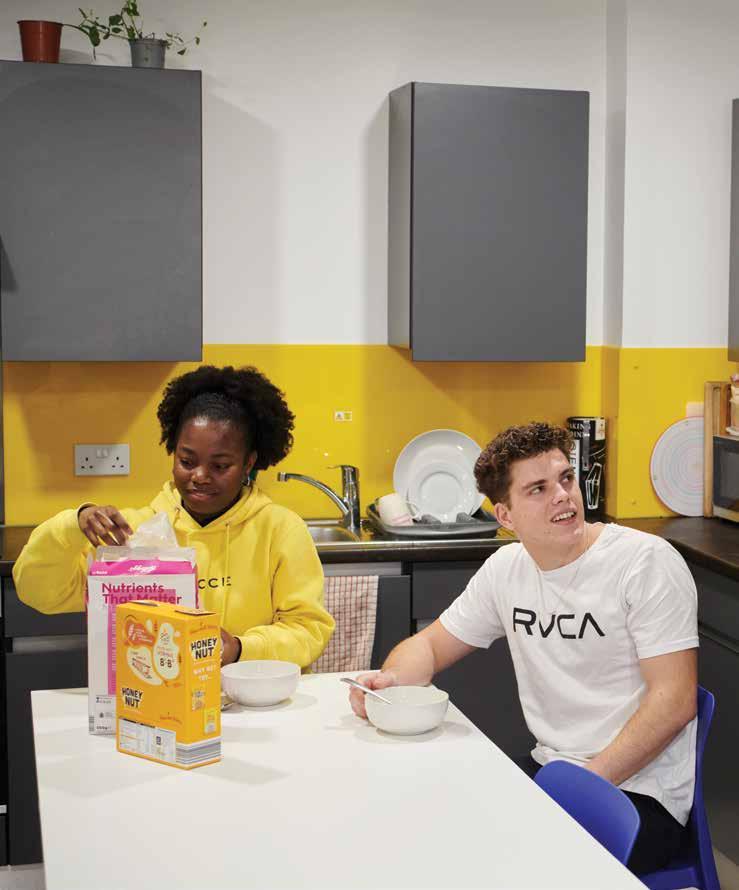
32
Seniz, ecology and conservation
This summer I worked for the accommodation team and there is so much support available. There is always advice from staff and students to help you on your way.
Imani, psychology and criminology
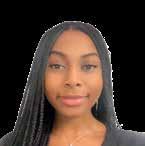


I live in Paddock Field halls on Falmer campus. It is really convenient, I have easy access to the gym, library, cafe and lecture halls. I also live with people that I have formed real friendships with. Having a communal living room and kitchen has been very fun, it allows us to meet after lectures, cook, talk and do things together.
Halls of residence
We have halls on every campus, within minutes of your classes, and others that are very nearby. Our halls are all up-to-date and the newest are those at our student village at the Moulsecoomb campus (see pages 20–21), where there are 800 rooms – some even have sea views. Your rent typically includes things like broadband, bills, cleaning of shared spaces and contents insurance, as well as support from our Residential Wellbeing team and staff who are there around the clock.
Our guarantee
We guarantee you an offer of a place in halls if you:
• make Brighton your firm choice of university
• are starting your first year of fulltime study
• apply for university accommodation by the deadline we tell you about.
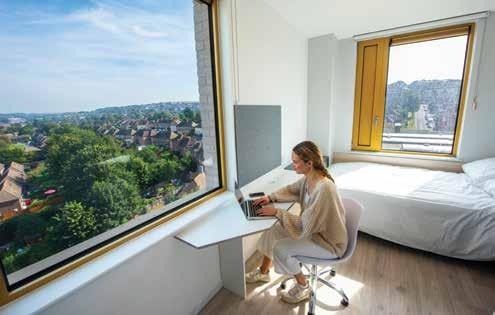

Kristian, music business and media
I decided to rent privately in my second and third year, living in the heart of the city. Sharing a home with similar people is a great opportunity to grow together, support one another and learn what it means to be independent.

33
OTHER OPTIONS
Homestay

With homestay you rent a room in the home of a family, couple or single person who has registered with the university. Homestay can be catered or self-catered, and provides a supportive home environment as you settle into university life.
Private renting
Opting to look for your own privately rented home gives you the maximum independence, as you can choose your location, type of housing and your housemates. We’ll give you advice and guidance to help you find a private rental, and we can help you to find other Brighton students to live with. Our housing advice officer can help you with any questions about renting privately.
OUR ACCOMMODATION TEAM
We know how important it is for new students to find the right home and our accommodation team is here to help. With years of experience and excellent local knowledge, they can advise you on all your options and guide you through the process – all year round.
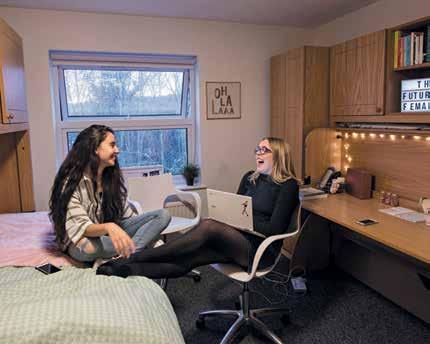
Dana, pharmacy
Living in halls was definitely one of the best choices I made at uni. I was able to meet people from other courses and backgrounds and get used to living alone away from home. There are residential advisers who provide support and help with any worries or concerns.
Martin runs Residential Wellbeing, a support network that involves students who live and work in halls supporting new students


Residential Wellbeing is based on friendship and building a sense of community, and about easing the transition from school and college into university life. It’s also about creating a safe and secure living environment –student residential advisers (RAs) give guidance to students and tell them where they can get help if they need it.
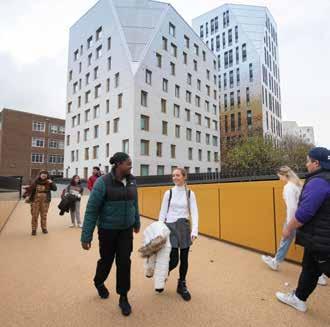
They organise a structured programme of social events giving residents the opportunity to interact and meet new friends, have fun and try new activities. The student RAs can help with things like homesickness, loneliness or just wanting to have a chat... and they can pass on their own experience of living in Brighton and what it’s like being a student.
For more details, including the most up-todate information about costs, visit www.brighton.ac.uk/ accommodation
The Residential Wellbeing team is the first point of contact for students who need wellbeing support and our staff Residential Advisers are on call every night of the year, including weekends and bank holidays.
34
FIND OUT MORE
Our halls
What’s included
Your rent typically includes things like broadband, bills, cleaning of shared areas and contents insurance. Halls are self-catered and there are canteens and cafes at every campus.
Our guarantee
We guarantee first year students an offer of a room in halls of residence. We recommend that you look at halls options closest to your study location, but you are free to apply for any of our halls.
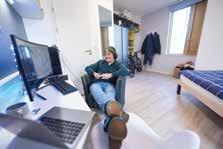
VARLEY PARK, BRIGHTON
Our dedicated residential halls site, two miles north of the city centre, walking distance from Moulsecoomb and Falmer campuses
• 765 rooms with a range of bathroom options
Convenient for students studying at the Moulsecoomb and Falmer campuses
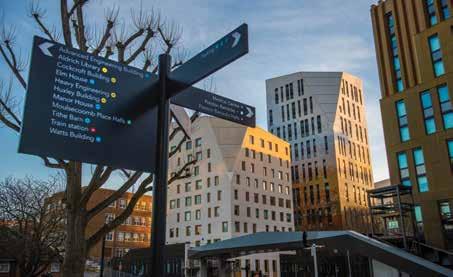
FALMER, BRIGHTON

On our Falmer campus, with excellent public transport links
• 629 rooms with a range of bathroom options
Convenient for students studying at the Falmer campus
PHOENIX
City centre location, a short walk to the seafront
• 298 rooms, all en suite

Convenient for students studying at City campus
MITHRAS HALLS, BRIGHTON
Our newest halls of residence on the Moulsecoomb campus at the heart of our student village
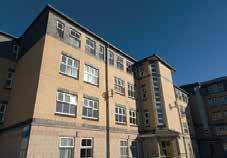
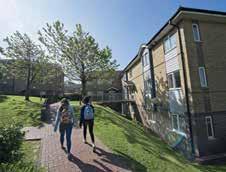
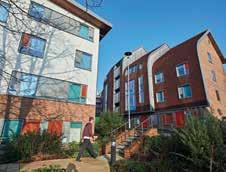
• 804 rooms, all en suite
Convenient for students studying at all Brighton campuses
35
Brighton Palace Pier Brighton train station Moulsecoomb train station Falmer train station Brighton Marina MOULSECOOMB CAMPUS MITHRAS HALLS AND STUDENT VILLAGE VARLEY PARK FALMER CAMPUS Stanmer PADDOCK FIELDS AND GREAT WILKINS CITY CAMPUS PHOENIX BREWERY A270 Lewes Road A27 A27 A259 A23 London Coldean Lane London Road AMERICAN EXPRESS COMMUNITY STADIUM i360 01 02 03 04 01 02 03
BREWERY HALLS, BRIGHTON
04
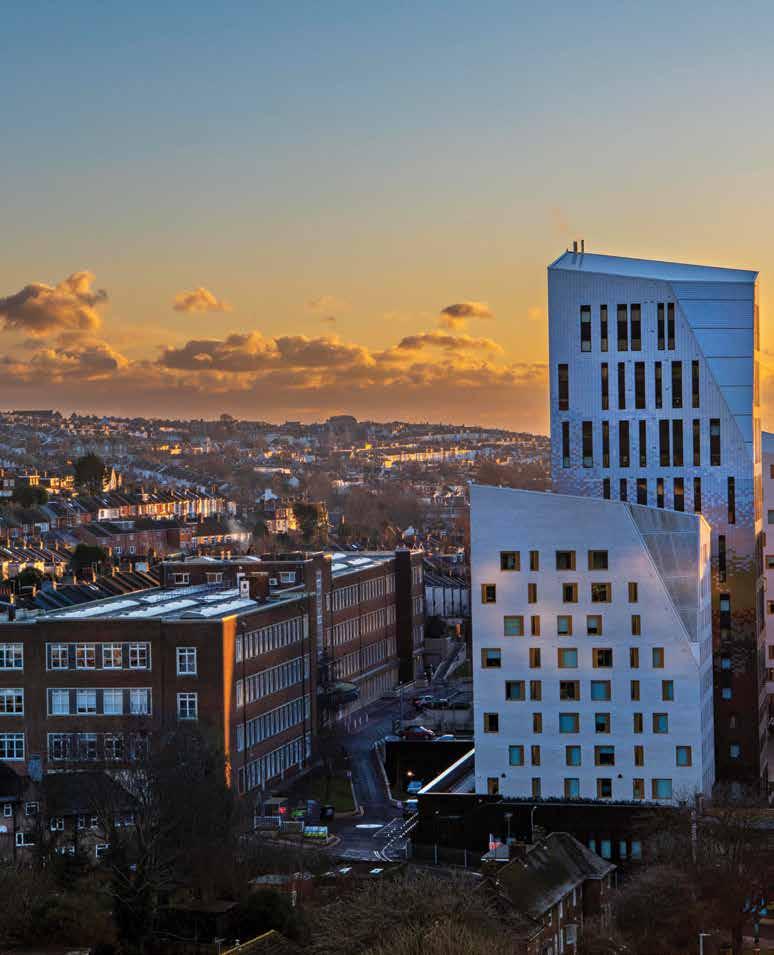
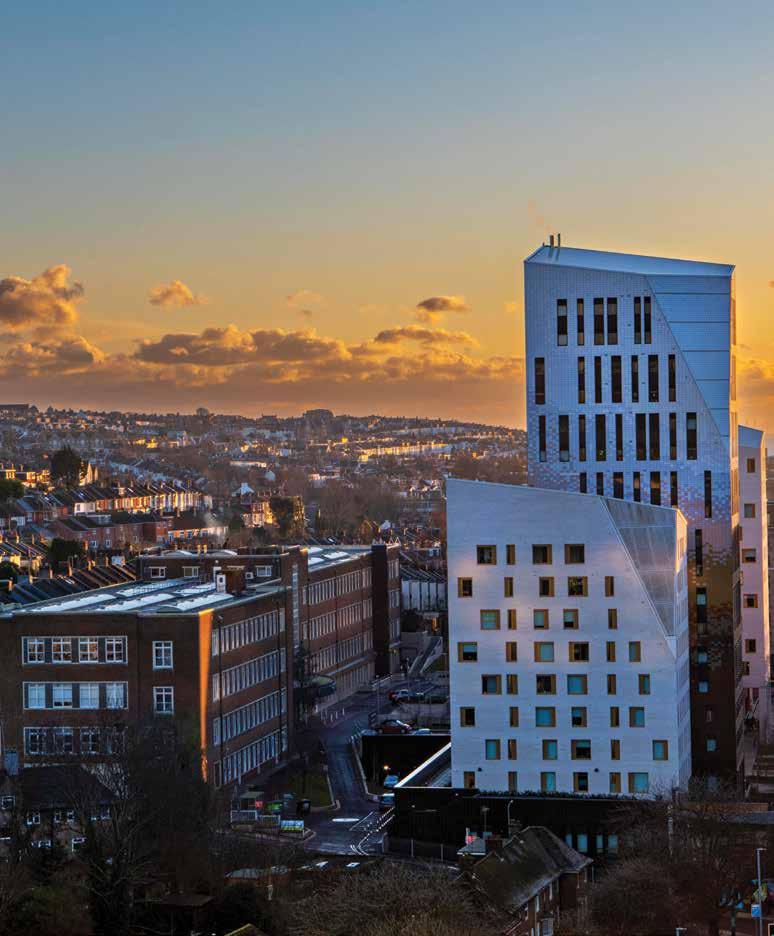
Find your course
Types of course
TEAM
Honours degrees
These courses involve three or four years of full-time study leading to qualifications such as BA(Hons), BSc(Hons), BEng(Hons) and LLB(Hons).
Integrated foundation year
Foundation years are a great way to prepare for a degree –people study them for different reasons, you may not have the grades or specific subjects needed, or you might have just changed your mind about which subject to follow.
Integrated masters degrees
Some degree courses include additional masters-level study. These courses are four years long and are available in these subject areas: engineering (MEng), pharmacy (MPharm) and science (MSci).
Specialist pathways
Some of our courses offer you the opportunity to explore in depth the subjects that interest you most, and to have that reflected in the degree that you graduate with. You’ll apply for the main course and then choose your pathway from year 2 of your studies.
Higher technical qualifications (HTQ)
Our HTQs are one and two-year courses leading to CertHE and DipHE qualifications. They are developed in collaboration with employers and businesses; and are approved by the Institute of Apprenticeships and Technical Education, meeting the same standards as apprenticeships and T-levels.
Learn more about our courses at www.brighton.ac.uk/courses.
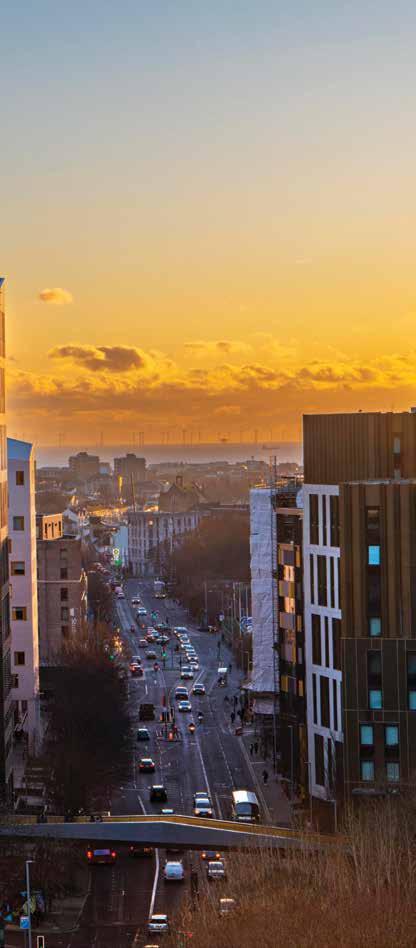
37
Applied sciences 44–47 Architecture, technology and engineering 48–53 Arts and media 54–59 Business and law 60–63 Education 64–67 Humanities and social sciences 68–73 Sport and health sciences 74–79
Explore our subject areas All our courses by subject area 38–43
FIND YOUR COURSE
Find your course in our subject lists, and check out the following pages where you can read about our students, staff and graduates.
UCAS tariff points or A-level grades listed here are a guide to the requirements for each course. We welcome many qualifications including A-levels, BTEC, IB, Access diplomas and T-levels. See page 86 to find out more including how we assess applications.
APPLIED SCIENCES
ARCHITECTURE, TECHNOLOGY AND ENGINEERING
Check www.brighton.ac.uk/ courses for detailed requirements for your course including specific subjects and professional requirements.
38
CAMPUS TITLE AND AWARD UCAS TARIFF UCAS CODE
UCAS TARIFF UCAS CODE
CAMPUS TITLE AND AWARD
BIOLOGY AND ECOLOGY PAGES 44–47 Biological Sciences BSc(Hons) C120 120–104 points Brighton: Moulsecoomb Biological Sciences BSc(Hons) with integrated foundation year C121 72 points Brighton: Moulsecoomb Biological Sciences MSci C100 128–112 points Brighton: Moulsecoomb Ecology and Conservation BSc(Hons) CFC8 120–104 points Brighton: Moulsecoomb Ecology and Conservation BSc(Hons) with integrated foundation year CFC9 72 points Brighton: Moulsecoomb Ecology and Conservation MSci C180 128–112 points Brighton: Moulsecoomb BIOMEDICAL SCIENCE PAGES 44–47 Biomedical Science BSc(Hons) B940 120–104 points Brighton: Moulsecoomb Biomedical Science BSc(Hons) with integrated foundation year B942 72 points Brighton: Moulsecoomb Biomedical Science MSci B945 128–120 points Brighton: Moulsecoomb GEOGRAPHY, THE EARTH AND ENVIRONMENT PAGES 44–47 Environmental Management BSc(Hons) F900 120–104 points Brighton: Moulsecoomb Environmental Sciences BSc(Hons) F901 120–104 points Brighton: Moulsecoomb Environmental Sciences BSc(Hons) with integrated foundation year F902 72 points Brighton: Moulsecoomb Geography BA(Hons) L7F8 120–104 points Brighton: Moulsecoomb Geography BSc(Hons) F800 120–104 points Brighton: Moulsecoomb Geography BSc(Hons) with integrated foundation year F801 72 points Brighton: Moulsecoomb Geography with Archaeology BSc(Hons) FF84 120–104 points Brighton: Moulsecoomb Geography with Remote Sensing and GIS BSc(Hons) F830 120–104 points Brighton: Moulsecoomb PHARMACY
Pharmacy MPharm B230 128–120 points Brighton: Moulsecoomb Pharmacy MPharm with integrated foundation year B231 72 points Brighton: Moulsecoomb
PAGES 44–47
DESIGN
Architecture BA(Hons) K100 136–104 points Brighton: Moulsecoomb Architecture BA(Hons) with integrated foundation year K15F 72 points Brighton: Moulsecoomb Interior Architecture BA(Hons) W250 120–104 points Brighton: Moulsecoomb Interior Architecture BA(Hons) with integrated foundation year W2F5 72 points Brighton: Moulsecoomb Product Design BSc(Hons) W242 120–104 points Brighton: Moulsecoomb Product Design BSc(Hons) with integrated foundation year W24Y 72 points Brighton: Moulsecoomb
ARCHITECTURE AND
PAGES 48–53
TITLE AND AWARD
COMPUTING
UCAS CODE
UCAS TARIFF
CAMPUS
39
Civil Engineering BEng(Hons) H201 120–104 points Brighton: Moulsecoomb Civil Engineering BEng(Hons) with integrated foundation year H202 80–72 points Brighton: Moulsecoomb Civil Engineering MEng H200 136–120 points Brighton: Moulsecoomb Civil Engineering MEng with integrated foundation year H203 80–72 points Brighton: Moulsecoomb Civil Engineering with Construction Management BEng(Hons) H2K2 120–104 points Brighton: Moulsecoomb Civil Engineering with Construction Management MEng H2K3 136–120 points Brighton: Moulsecoomb Civil with Environmental Engineering BEng(Hons) H290 120–104 points Brighton: Moulsecoomb Civil with Environmental Engineering MEng H291 136–120 points Brighton: Moulsecoomb
CIVIL ENGINEERING PAGES 48–53
Business Analyst CertHE (Higher Technical Qualification) GN20 112–96 points Brighton: Moulsecoomb Computer Science BSc(Hons) G400 120–104 points Brighton: Moulsecoomb Computer Science for Games BSc(Hons) G455 120–104 points Brighton: Moulsecoomb Computer Science with Artificial Intelligence BSc(Hons) G416 120–104 points Brighton: Moulsecoomb Computer Science with Cyber Security BSc(Hons) I100 120–104 points Brighton: Moulsecoomb Cyber Security Technologist DipHE (Higher Technical Qualification) GN31 112–96 points Brighton: Moulsecoomb Data Analyst CertHE (Higher Technical Qualification) GN21 112–96 points Brighton: Moulsecoomb Digital Games Development BSc(Hons) GG46 120–104 points Brighton: Moulsecoomb Software Developer DipHE (Higher Technical Qualification) GN30 112–96 points Brighton: Moulsecoomb Software Engineering BSc(Hons) G600 120–104 points Brighton: Moulsecoomb CONSTRUCTION AND BUILDING PAGES 48–53 Architectural Technology BSc(Hons) K236 120–104 points Brighton: Moulsecoomb Building Surveying BSc(Hons) K230 120–104 points Brighton: Moulsecoomb Construction Management BSc(Hons) K220 120–104 points Brighton: Moulsecoomb Project Management for Construction BSc(Hons) K251 120–104 points Brighton: Moulsecoomb Quantity Surveying BSc(Hons) K240 120–104 points Brighton: Moulsecoomb ENGINEERING PAGES 48–53 Aerospace Engineering BEng(Hons) H410 120–104 points Brighton: Moulsecoomb Aerospace Engineering BEng(Hons) with integrated foundation year H415 72 or 96 points Brighton: Moulsecoomb Aerospace Engineering MEng H416 128–112 points Brighton: Moulsecoomb Automotive Engineering BEng(Hons) H330 120–104 points Brighton: Moulsecoomb Automotive Engineering BEng(Hons) with integrated foundation year H331 72 or 96 points Brighton: Moulsecoomb Automotive Engineering MEng H335 128–112 points Brighton: Moulsecoomb Design Engineering BEng(Hons) H150 120–104 points Brighton: Moulsecoomb Design Engineering BEng(Hons) with integrated foundation year H152 72 or 96 points Brighton: Moulsecoomb Design Engineering MEng H151 128–112 points Brighton: Moulsecoomb Electrical and Electronic Engineering BEng(Hons) H605 120–104 points Brighton: Moulsecoomb Electrical and Electronic Engineering BEng(Hons) with integrated foundation year H606 72 or 96 points Brighton: Moulsecoomb Electrical and Electronic Engineering MEng H607 128–112 points Brighton: Moulsecoomb Electronic and Communication Engineering BEng(Hons) HG64 120–104 points Brighton: Moulsecoomb Electronic and Communication Engineering BEng(Hons) with integrated foundation year HI61 72 or 96 points Brighton: Moulsecoomb Electronic and Communication Engineering MEng HG6K 128–112 points Brighton: Moulsecoomb Mechanical Engineering BEng(Hons) H300 120–104 points Brighton: Moulsecoomb Mechanical Engineering BEng(Hons) with integrated foundation year H301 72 or 96 points Brighton: Moulsecoomb Mechanical Engineering MEng H302 128–112 points Brighton: Moulsecoomb Robotics and Mechatronics Engineering BEng(Hons) H671 120–104 points Brighton: Moulsecoomb Robotics and Mechatronics Engineering BEng(Hons) with integrated foundation year H673 72 or 96 points Brighton: Moulsecoomb Robotics and Mechatronics Engineering MEng H672 128–112 points Brighton: Moulsecoomb
PAGES 48–53
FIND YOUR COURSE
Find your course in our subject lists, and check out the following pages where you can read about our students, staff and graduates.
UCAS tariff points or A-level grades listed here are a guide to the requirements for each course. We welcome many qualifications including A-levels, BTEC, IB, Access diplomas and T-levels. See page 86 to find out more including how we assess applications.
ART AND MEDIA
Check www.brighton.ac.uk/ courses for detailed requirements for your course including specific subjects and professional requirements.
40 CAMPUS TITLE AND AWARD UCAS TARIFF UCAS CODE
FASHION, TEXTILES AND 3D DESIGN PAGES 54–59 3D Design and Craft BA(Hons) W240 120–104 points Brighton: City Fashion Communication with Business Studies BA(Hons) W213 120–104 points Brighton: City Fashion Design with Business Studies BA(Hons) W2N2 120–104 points Brighton: City Textiles Design with Business Studies BA(Hons) W2NC 120–104 points Brighton: City FILM PAGES 54–59 Film and Screen Studies BA(Hons) P390 120–104 points Brighton: City Film BA(Hons) P313 120–104 points Brighton: City FINE ART PAGES 54–59 Fine Art BA(Hons) W150 120–104 points Brighton: City Fine Art Painting BA(Hons) W120 120–104 points Brighton: City Fine Art Printmaking BA(Hons) W140 120–104 points Brighton: City JOURNALISM PAGES 54–59 Journalism BA(Hons) P502 120–104 points Brighton: Moulsecoomb Sport Journalism BA(Hons) P500 120–104 points Brighton: Moulsecoomb MEDIA PAGES 54–59 Media Production BA(Hons) CRT2 120–104 points Brighton: Moulsecoomb Media Studies BA(Hons) P300 120–104 points Brighton: Moulsecoomb Media, Industry and Innovation BA(Hons) MVN1 120–104 points Brighton: Moulsecoomb Music Business and Media BA(Hons) W392 120–104 points Brighton: Moulsecoomb PHOTOGRAPHY PAGES 54–59 Photography BA(Hons) W640 120–104 points Brighton: City SOUND AND MUSIC PAGES 54–59 Digital Music and Sound Arts BA(Hons) W390 120–104 points Brighton: City VISUAL COMMUNICATION PAGES 54–59 Animation BA(Hons) W615 120–104 points Brighton: City Design for Digital Media BA(Hons) W211 120–104 points Brighton: City Games Art and Design BA(Hons) W281 120–104 points Brighton: City Graphic Design BA(Hons) W210 120–104 points Brighton: City Illustration BA(Hons) W220 120–104 points Brighton: City
BUSINESS AND LAW
UCAS CODE
EDUCATION
TEACHING PAGES 64–67 Physical
Primary
Primary
41
UCAS TARIFF
AND AWARD CAMPUS
TITLE
UCAS TARIFF UCAS CODE
AND AWARD CAMPUS
FINANCE AND ECONOMICS PAGES 60–63 Accounting and Finance BSc(Hons) N420 120–104 points Brighton: Moulsecoomb Accounting, Finance and Economics BSc(Hons) with integrated foundation year N42Y 72 points Brighton: Moulsecoomb Economics BSc(Hons) L100 120–104 points Brighton: Moulsecoomb Finance and Investment BSc(Hons) N390 120–104 points Brighton: Moulsecoomb BUSINESS MANAGEMENT PAGES 60–63 Business Analyst CertHE (Higher Technical Qualification) GN20 112–96 points Brighton: Moulsecoomb Business Management BSc(Hons) N103 120–104 points Brighton: Moulsecoomb Business Management BSc(Hons) with integrated foundation year N21Y 72 points Brighton: Moulsecoomb Business Management with Economics BSc(Hons) N1L1 120–104 points Brighton: Moulsecoomb Business Management with Entrepreneurship BSc(Hons) N2N1 120–104 points Brighton: Moulsecoomb Business Management with Finance BSc(Hons) NN13 120–104 points Brighton: Moulsecoomb Business Management with Human Resource Management BSc(Hons) NN16 120–104 points Brighton: Moulsecoomb Business Management with Law BSc(Hons) N1M1 120–104 points Brighton: Moulsecoomb Business Management with Marketing BSc(Hons) NN15 120–104 points Brighton: Moulsecoomb International Business Management BSc(Hons) N110 120–104 points Brighton: Moulsecoomb LAW PAGES 60–63 Law LLB(Hons) M100 120–104 points Brighton: Moulsecoomb Law LLB(Hons) with integrated foundation year M15F 72 points Brighton: Moulsecoomb Law with Business LLB(Hons) M1NC 120–104 points Brighton: Moulsecoomb Law with Criminology LLB(Hons) M6L1 120–104 points Brighton: Moulsecoomb
TOURISM AND EVENTS PAGES 60–63 International Event Management BSc(Hons) N820 120–104 points Brighton: Moulsecoomb International Event Management with Marketing BSc(Hons) N8N5 120–104 points Brighton: Moulsecoomb International Tourism Management BSc(Hons) N840 120–104 points Brighton: Moulsecoomb International Tourism Management with Marketing BSc(Hons) NN85 120–104 points Brighton: Moulsecoomb Marketing Management BSc(Hons) N501 120–104 points Brighton: Moulsecoomb
EDUCATION TITLE
ACCOUNTING,
MARKETING,
Childhood Education and Care BA(Hons) X310 120–104 points Brighton: Falmer Education BA(Hons) X300 120–104 points Brighton: Falmer
STUDIES PAGES 64–67 Early
Education BA(Hons)
QTS X1C6 120–104 points Brighton: Falmer
with
Education
BA(Hons)
QTS X100 BBB Brighton: Falmer
BA(Hons)
X122 BBB Brighton: Falmer
(3–7 years)
with
Primary Education (5–11 years)
with QTS
English
BA(Hons)
XQ13 BBB Brighton: Falmer
Education
with QTS
BA(Hons)
XG1C BBB Brighton:
Primary Mathematics Education
with QTS
Falmer
BA(Hons)
XG11 Check the website Brighton: Falmer
Secondary Mathematics Education
with QTS – Two-year course
HUMANITIES AND SOCIAL SCIENCE
CREATIVE
UCAS CODE
UCAS TARIFF
Humanities BA(Hons)
120–104 points Brighton: Moulsecoomb
Philosophy, Politics, Art BA(Hons) D2SC 120–104 points Brighton: Moulsecoomb
Philosophy, Politics, Ethics BA(Hons)
War and Conflict BA(Hons)
LANGUAGE
English Language and Creative Writing BA(Hons)
English Language and English
Linguistics with Policy and Planning
Linguistics with Intercultural Communication
PAGES 68–73
Q310 120–104 points Brighton: Moulsecoomb
for our Linguistics BA and choose this pathway in year 2
Apply for our Linguistics BA and choose this pathway in year 2
42
CAMPUS
TITLE AND AWARD
WRITING
68–73 Creative Writing BA(Hons) W800 120–104 points Brighton: Moulsecoomb Creative Writing with Wellbeing BA(Hons) Apply for our Creative Writing BA and choose this pathway in year 2 Brighton: Moulsecoomb
AND SOCIOLOGY PAGES 68–73 Criminology and Sociology BA(Hons) LM39 120–104 points Brighton: Moulsecoomb Criminology BA(Hons) L611 120–104 points Brighton: Moulsecoomb Social Science BA(Hons) L540 120–104 points Brighton: Moulsecoomb Sociology BA(Hons) L300 120–104 points Brighton: Moulsecoomb HISTORY OF ART AND DESIGN PAGES 68–73 Art History and Visual Culture BA(Hons) V352 120–104 points Brighton: Moulsecoomb Fashion and Design History BA(Hons) V371 120–104 points Brighton: Moulsecoomb HUMANITIES PAGES 68–73 Contemporary History BA(Hons) V140 120–104 points Brighton: Moulsecoomb Globalisation: History, Politics, Culture BA(Hons) VL12 120–104 points Brighton: Moulsecoomb History, Literature and Culture BA(Hons) LQV0 120–104 points Brighton: Moulsecoomb
PAGES
CRIMINOLOGY
LV00
LV25 120–104 points Brighton: Moulsecoomb
L252 120–104 points Brighton: Moulsecoomb
Literature BA(Hons) Q390 120–104 points Brighton: Moulsecoomb
Language and Linguistics BA(Hons) QQ31 120–104 points Brighton: Moulsecoomb
Language
Media BA(Hons) QP33 120–104 points Brighton: Moulsecoomb
BA(Hons) Q300 120–104
Brighton:
English
English
and
English Language
points
Moulsecoomb
Q100 120–104
Brighton:
Linguistics BA(Hons)
points
Moulsecoomb
Brighton:
BA(Hons) Apply
Moulsecoomb
Brighton:
LITERATURE PAGES 68–73 English Literature and Creative Writing BA(Hons) Q311 120–104 points Brighton: Moulsecoomb English Literature and Linguistics BA(Hons) Q321 120–104 points Brighton: Moulsecoomb English Literature BA(Hons) Q320 120–104 points Brighton: Moulsecoomb Media and English Literature BA(Hons) PQ33 120–104 points Brighton: Moulsecoomb POLITICS PAGES
Politics BA(Hons) L200 120–104 points Brighton: Moulsecoomb Environmental Politics BA(Hons) L203 120–104 points Brighton: Moulsecoomb Politics and International Relations BA(Hons) L290 120–104 points Brighton: Moulsecoomb Politics and Social Change BA(Hons) L201 120–104 points Brighton: Moulsecoomb Politics, Sexuality and Gender BA(Hons) L202 120–104 points Brighton: Moulsecoomb
PAGES 68–73 Psychology BSc(Hons) C810 120–104 points Brighton: Moulsecoomb Psychology and Criminology BA(Hons) MC98 120–104 points Brighton: Moulsecoomb Psychology and Sociology BA(Hons) CL83 120–104 points Brighton: Moulsecoomb Psychology with Counselling Studies BSc(Hons) C8B9 120–104 points Brighton: Moulsecoomb
WORK PAGES 68–73 Social Work BSc(Hons) L500 128–112 points Brighton: Moulsecoomb
BA(Hons)
Moulsecoomb
68–73
PSYCHOLOGY
SOCIAL
FIND YOUR COURSE
Find your course in our subject lists, and check out the following pages where you can read about our students, staff and graduates.
UCAS tariff points or A-level grades listed here are a guide to the requirements for each course. We welcome many qualifications including A-levels, BTEC, IB, Access diplomas and T-levels. See page 86 to find out more including how we assess applications.
SPORT AND HEALTH SCIENCES
Check www.brighton.ac.uk/ courses for detailed requirements for your course including specific subjects and professional requirements.
Sport and Exercise Science BSc(Hons)
Sport and Exercise Science with Physical Education BSc(Hons)
for our Sport and Exercise Science BSc and choose this pathway in year 2
Falmer Sport BSc(Hons) with integrated foundation year
Sport Coaching with Development BSc(Hons)
Sport Coaching with Performance BSc(Hons)
for our Sport Coaching BSc and choose this pathway in year 2
Apply for our Sport Coaching BSc and choose this pathway in year 2
Sport Coaching with Youth Sport and Physical Education BSc(Hons) Apply for our Sport Coaching BSc and choose this pathway in year 2
Sport Management BSc(Hons)
Strength and Conditioning BSc(Hons)
2G55 120–104 points
C630 120–104 points
Falmer
Brighton: Falmer
Brighton: Falmer
Brighton: Falmer
Brighton: Falmer
43
UCAS TARIFF
UCAS CODE
TITLE AND AWARD CAMPUS
ALLIED HEALTH PROFESSIONS PAGES 74–79 Diagnostic Radiography BSc(Hons) B821 BBC Brighton: Falmer Occupational Therapy BSc(Hons) Apply
the university.
Brighton: Falmer Paramedic Science BSc(Hons) B780 ABB Brighton: Falmer Physiotherapy BSc(Hons) B160 ABB Brighton: Falmer Podiatry BSc(Hons) B985 BBC Brighton: Falmer MEDICINE PAGES 74–79 Medicine BM BS A100 AAA Brighton: Falmer, and the University of Sussex NURSING AND MIDWIFERY PAGES 74–79 Midwifery BSc(Hons) B720 BBB Brighton: Falmer Nursing (Adult) BSc(Hons) B7L0 BBC Brighton: Falmer Nursing (Child) BSc(Hons) B730 BBC Brighton: Falmer Nursing (Mental Health) BSc(Hons) B760 BBC Brighton: Falmer SPORT AND EXERCISE PAGES 74–79 Exercise, Health and Rehabilitation Science BSc(Hons) C607 120–104 points Brighton: Falmer Physical Education BA(Hons) with QTS X1C6 120–104
Brighton:
direct to
Check online for entry requirements
points
Falmer
C600 120–104
Brighton:
points
Falmer
Apply
Brighton:
C611 72
Brighton:
CX6C 120–104
Brighton:
points
Falmer Sport Coaching BSc(Hons)
points
Falmer
Brighton:
Apply
SUBJECTS, COURSES AND SPECIALIST PATHWAYS



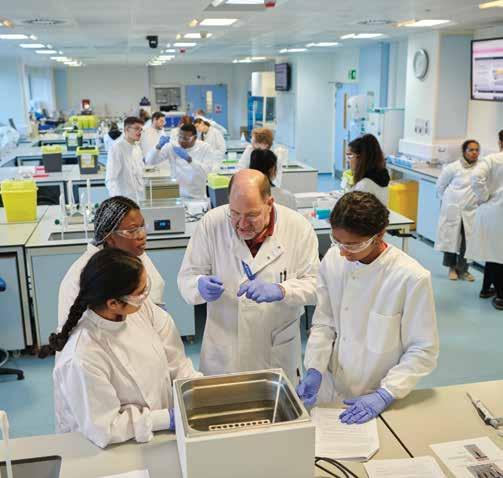
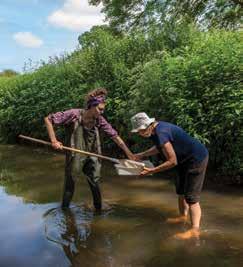
Most of our courses in this subject offer an integrated foundation year, and there’s lots of flexibility to specialise in areas that interest you most. See the full list on page 38. Find out about your course: www.brighton.ac.uk/courses – or use the QR codes to see all courses in each subject.
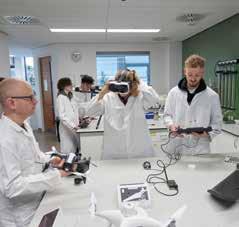
44 Biology and ecology Pharmacy Geography, the Earth and
Biomedical science
environment
Explore sustainability, health and ecological issues on a local and global scale. Put the knowledge you are gaining to use and build practical hands-on experience in the lab, through fieldwork and placements, and see how the applied sciences can enable you to make a real difference in people’s lives.
YOU CAN EXPECT
Practical learning
Biology, ecology, geography and environmental students have fieldwork opportunities in our local area and further afield, and the option of a placement year. Pharmacy students undertake placements in hospital or community settings in every year of their course. And biomedical science students can undertake a placement in an accredited NHS training lab, ensuring that they are working towards becoming a registered biomedical scientist.
Specialist facilities
Put theory to the test using specialist facilities in the field and the lab including the public health labs, soil and water analysis labs, advanced microscope technology, drones and equipment for field-based geophysical surveying, microbiology lab, primary cell/ tissue facility, molecular biology lab, image analysis suite, genomics/proteomics facility, clinical skills lab, SimMan 3G, a medicine dispensary and computer labs running professional software.
Your learning informed by research
Learn with researchers who are tackling problems affecting our society and environment such as sustainable river management, air quality, removing hormonechanging pollutants from the environment, virology, and exploring new approaches to the treatment of cancer, asthma, diabetes and other chronic diseases.
Professional accreditation
Many of our courses are accredited by professional organisations external to the university, meaning they have met national professional benchmarks.
Seniz, final year, ecology and conservation

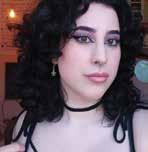
Ecology is my passion I chose my course because I had a passion for nature and learning about the environment. You never know how great the number of species there is until you stop and look around. With the South Downs surrounding us, there’s always something to spot in Brighton. Undoubtedly, many people of my generation feel a sense of urgency to fix the climate and protect wildlife.
I’m part of an environmental community
Chat online to students like Seniz at www.brighton.ac.uk/chat and scan the QR code to check out their blogs and vlogs
a woodland bird – and a male siskin at that. Not many times you get to see a wild animal up close, and it was a privilege.
Volunteering is a must
I have done a lot of volunteering. I helped carry out butterfly surveys at Gatwick and build a dew pond at a primary school. I recorded species at the Seven Sisters with the South Downs Group. Litter picking at the beach and connecting with local groups have helped me scope out volunteering opportunities.
I come from south-east London, where there was little conservationist education at my school, but in Brighton it felt like a family working together. I love that we all know one another. I am a member of the Ecological Society, which is wonderful. We can share so much knowledge. My favourite thing so far was a camping trip to Knepp Estate –we saw so many amazing animals.
The uni has fascinating staff
Having good teaching staff is so important to a fantastic university experience. One of my lecturers gives the most helpful feedback and gave up his free time to help me raise money for charity. He is the only person I know who keeps replica skulls ready to show on zoom calls!
My placement was a privilege
I completed a placement year with the Field Studies Council. I helped teach ecology and geography, and maintained the centre’s social media. My best experience was bird ringing. This meant catching woodland birds in mist nets and assessing them for age, sex and weight to record on a database. I have never held
I have changed so much
When students join university, they get exposed to so many different things they never experienced at home. I struggled with social aspects at first, but I began to flourish into the person I am now. I discovered my values, what I wanted in life and who I was. Learning about myself allowed me to make better friendships and surround myself with people who cared for me as much as I do them. I put my endless chattiness to good use as a student ambassador. I always knew it’d be good for something!
There is great support here
I think the University of Brighton is leaps and bounds better at student support than most universities I have heard about. We had the extensive support during the pandemic, and I will always sing the praises of our Students’ Union for their help because it was invaluable.
45
MEET OUR STUDENTS
Dr Corina Ciocan teaches ecology and conservation

I have always lived by the ocean and I’m fascinated by the marine environment. My research interests focus on helping to identify and reduce our impact on it. I bring a lot of my personal experience into the classroom and I grab every opportunity to take my students outdoors. I always encourage my students to ask questions, get involved in research, be adventurous and stay in touch with nature.
To prospective students I would say: make the most of your time at university! In the end, it’s not just the knowledge that matters, it’s the experience and network that you build!
James
Ebdon, Professor of Environmental Microbiology


Access to safe drinking water, sanitation and hygiene is the most basic human need for health and wellbeing, yet it still needlessly claims the lives of an estimated 829,000 people every year. My research and teaching focuses on understanding how microbes such as bacteria and viruses behave, and assessing the risks to human health.
What I love about teaching is seeing students gain in confidence as their understanding of environmental topics comes into focus. This is particularly apparent during the international undergraduate field trip I lead, which develops important skills via independent, student-led project activities. These have included coastal water quality monitoring, vegetation surveying, microplastic investigations and geological mapping projects.
YOU CAN EXPECT
Opportunity to study medicine
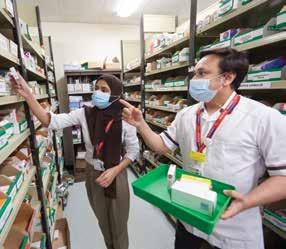
Biological Sciences BSc and MSci, Biomedical Science BSc and MSci, and Pharmacy MPharm students who would like to study medicine and who fulfil the eligibility criteria are guaranteed an interview with Brighton and Sussex Medical School.
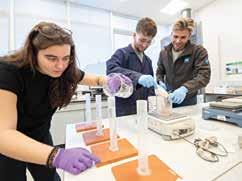
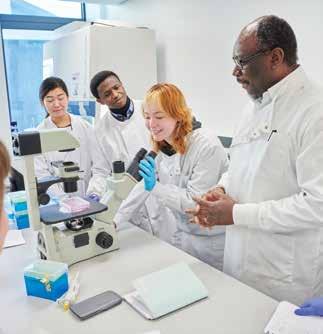
YOUR SPACE
Your campus
Applied sciences courses are based at Moulsecoomb, our biggest campus and student village. Depending on your subject, you’ll be studying in labs, lecture halls and workshops in Cockcroft and Huxley buildings and our heavy engineering block.
Everything you need is on campus, with coffee bars, places to eat and –of course – the library. And you’ll be moments from the SU bar and gym across the bridge connecting the two sides of our campus. Find out more about the Moulsecoomb campus and student village – and our other campuses – on pages 20–23.
Your city
Brighton is a great place to work in the field, and our students benefit – in different ways – from local environments like the coast, rivers and estuaries, South Downs National Park, and the city itself. For more about the city, see pages 24–27.
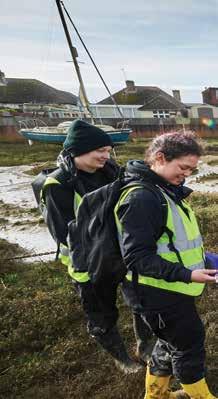
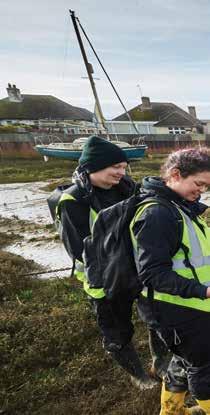
46
Jamie, biomedical science graduate 2019
Jamie made the most of our guaranteed interview scheme for biomedical science students wanting to study medicine at Brighton and Sussex Medical School (BSMS) see page 76. He is well on his way to becoming a doctor.


It’s rewarding knowing that I’m going into a career that’ll directly support the NHS and improve the health of others.
Jen, geography BA graduate 2018
Things that helped me to choose geography at the University of Brighton were the enthusiastic lecturers, diverse course content, unique field trips, and location of the uni itself.
Joint 4th IN UK FOR GRADUATE PROSPECTS
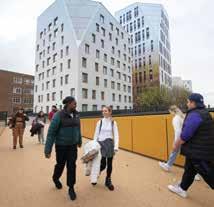
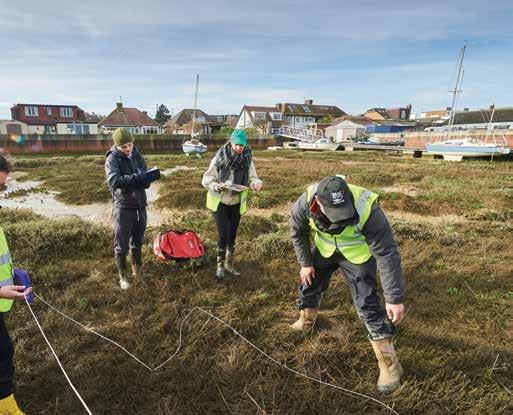
Complete University Guide 2023
PHARMACY 2nd IN UK FOR GRADUATE PROSPECTS
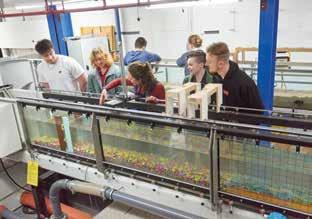
BIOMEDICAL SCIENCE
Complete University Guide 2023
ENVIRONMENTAL SCIENCES BSC
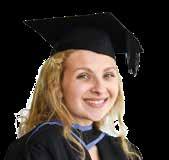
91% of our students said they were satisfied overall with this course National Students Survey 2022
WHAT NEXT?
Meet us in-person at an open day or campus tour or go online for tours, tasters and Q+As. And our enquiries team is here to help and advise you. Turn to page 88 for more.
Follow us to stay in touch
When it comes to your dissertation, write about a topic you are passionate about. I did a regeneration case study, and I found that as I was invested in the topic, the dissertation was easier for me to write and focus my time on. As part of my course I undertook modules on city development and planning; these gave me an insight into what works and what doesn’t in the world of planning and regeneration, as well as an understanding of planning law and guidance. I am now a High Streets Recovery Project Officer at the Royal Borough of Kingston upon Thames council, which entails planning and delivering regeneration programmes and activities in town centres. What I enjoy most is seeing the plans you have spent a lot of time on come to life.
47
SUBJECTS AND COURSES





Many of our courses in this subject have an integrated foundation year or an additional year of postgraduate-level study. See the full list on pages 38–39. Find out about your course: www.brighton.ac.uk/courses – or use the QR codes to see all courses in each subject.
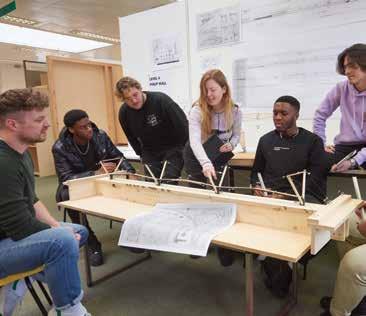
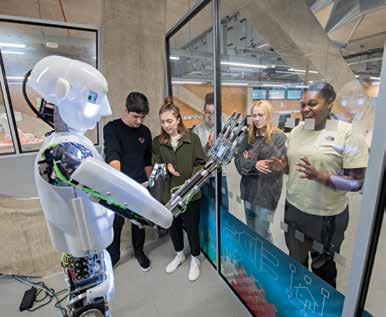
48
Architecture and design Civil engineering Computing Construction and building Engineering
Reimagine the world we live in; be part of a socially aware learning community where you’ll apply new-found technical and creative skills to contemporary issues and scenarios. Gain the practical experience employers are looking for by using our specialist facilities and through working on projects designed by industry.
YOU CAN EXPECT
A professional advantage
People with established careers in the industries and professions that you’re preparing for – architects, civil engineers, programmers, surveyors, designers and engineers – visit to share their experiences and offer their advice. Architecture graduates are awarded RIBA Part 1, the first step to becoming a qualified architect, while all our courses are informed by industry and employer know-how. Live briefs and projects reflect industry practices and opportunities for site visits and placements give you real insight and experience, building your portfolio, network and confidence.
In-demand knowledge and skills
You will develop the knowledge and skills to respond to the challenges that the world faces today – and the ability to react to future developments. You could become expert in cyber security and artificial intelligence or work in a team on real-world problems in developing countries as part of the Engineering for People Design Challenge. You could draw on your own experiences to design new products from a humancentred and socially conscious perspective, or collaborate with engineering students in the Sustainable Technology and Engineering Projects lab, on innovative and sustainable solutions to current global challenges. Whatever you study, the skills and knowledge you build will be necessary and purposeful.
Undine, year 2, architecture
It’s fine to be new to architecture
Chat online to students like Undine at www.brighton.ac.uk/chat and scan the QR code to check out their blogs and vlogs

My reasoning behind choosing to study architecture was very calculated as I had just finished an art school course and my middle school was focused on maths and physics. I wanted to study something that would be creative and technical at the same time. I knew close to nothing about architecture before I started my studies.
I’ve adjusted to a new country I’m from Latvia and when I started my course my biggest challenges were adjusting to the life in a new country, but after just one chat with my student support and guidance tutor (SSGT) I was all out of questions. I do feel support from Brighton University as I know that I can always contact my tutor or SSGT about my queries.
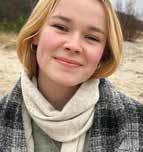
I have so much support
I have an amazing group of course-mates and an even more amazing teaching staff. Our tutors are always willing to chat and discuss crazy new ideas. University has loads of support available – starting from academic support and mental health support, and ending with financial support and a learning support plan.
Tutors are really helpful
I remember a tutorial with my tutor when I had hit a creative block. He listened to my chaotic monologue patiently and when I had finished it said: “okay, and so now leave all your notebooks. We are going for a walk.” And we walked back and forth through the studio space discussing my project.
The change in environment and way of discussing allowed me to gain new perspective on the project. That’s when I knew I’ve made the right decision.
I love student life!
Living in Brighton is exciting. Each day of the week offers new nightlife adventure. The city is full with events, jazz nights, sports activities etc. The best thing about independence is having the quiet time whenever needed, and good time management is key to balancing extracurricular activities and studies.
I’ve changed so much
While being at University of Brighton I’ve learnt to manage my time, I’ve grown up to be an independent adult with a sense of responsibility and most importantly I’ve learnt to have a great time also when being busy. I believe that University of Brighton has a particularly great communication with their students. With the pandemic I’ve learnt to be more independent and it has inspired me to do more remote work. I’ve realised that the opportunities are wider than the area you’re located in can offer. Throughout my studies I’ve learnt to adapt to unpredictable situations, to manage my time and improved my software skills.
The future is exciting
I’m very excited about what my future holds. I’ve been a part of employability workshops where the gathered skills are laid out and organised to be put on your CV. I feel like with my degree and skill set I’ll be able to go into various fields of work.
49
MEET OUR STUDENTS
computer interaction
I am proud of my career as a woman in STEM, leading and working in an advanced computer science field, developing innovative technological solutions.

Teaching enables me to work in an environment surrounded by enthusiastic minds. Our students have developed humancentred technologies that aim to address global challenges such as the pandemic, global warming and social injustice. They can demonstrate they are highly knowledgeable and are finding jobs in high-tech sectors as well as developing their own businesses. My advice to prospective students – it’s good to be you and to be bold.
I’m passionate about social justice and climate justice. I’ve just come back from COP27 where I was speaking, and that was the number one issue there, which is why we had success with the ‘loss and damage’ funding decision for climate change impact on the Global South.

Architecture is on one level a vocational pursuit but there’s no better way than being involved in an academic environment where you are doing research as you’re having to explain your ideas in a very rigorous way. And with teaching, having students asking questions really keeps you on your toes!
YOU CAN EXPECT Specialist facilities
Use your imagination, experiment and put your ideas to the test. For handson, practice-based learning you need access to specialist, industry-standard labs, equipment, studios and software.
Our facilities include: modelling and construction workshops for testing of small-scale structures; a hydraulics lab with flume, concrete and soils labs, reduced scale shaking table for seismic testing, concrete 3D printer, land surveying equipment, drones, 3D laser scanner, a simulation suite with car and flight simulators with VR and motion platform technology;
digital fabrication equipment, such as laser cutting, 3D printing and CNC cutting; our usability lab with eyetracking technology, robotics lab with robot dog, humanoid, robot arms, HTC Vive, digitisation/VR lab, 3D graphical software, sensors and games studios. You’ll also gain experience of industrystandard software, like BIM for our construction and building students.
Collaborative, supportive learning
Engineering students work in crossdisciplinary teams on projects such as designing and building robots and rocket cars, and our computing students get involved with team challenges such as game jams and codefests.
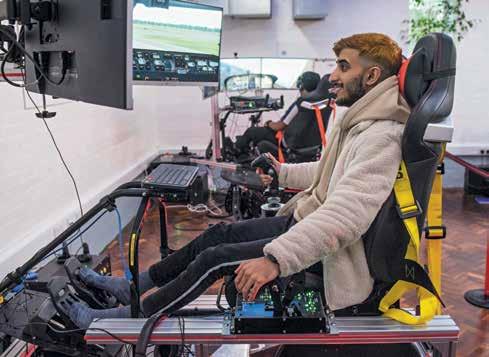
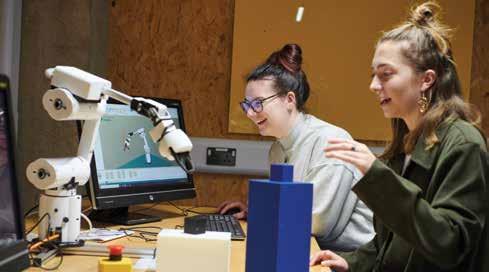
50
Dr Sanaz Fallahkhair teaches human
Duncan Baker Brown teaches architecture
Architecture and product design students learn with their peers in a design studio environment reflecting professional practice, where second- and third-year students share studio space fostering a dynamic, creative work environment.
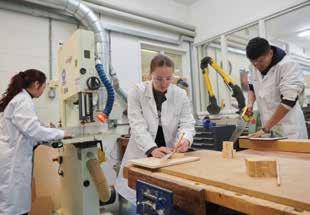
Showcase your work
Architecture, interior architecture, product design, computing and engineering students have the opportunity to showcase their work, including taking part in their final year shows.
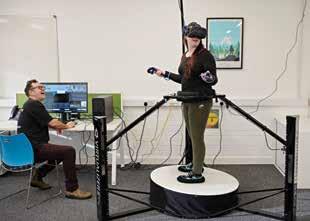
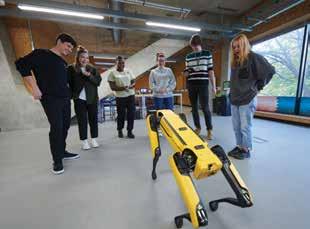
I am finding my specialism
Chat online to students like Beth at


www.brighton.ac.uk/chat and scan the QR code to check out their blogs and vlogs
Engineering is a very structured course so all the mechanical, automotive, and aerospace students work together until the third year. All engineers learn the foundations of a variety of areas before narrowing into individual strains in the final year. I think this structure works very well. The group projects within the modules are often flexible allowing the students to choose the specific topic and design of that project.
Experts visit to talk to us Engineering at Brighton has a great balance between theoretical, practical and software application. The facilities have allowed me to gain knowledge of welding, 3D printing, simulation data analysis and so much more. My course is particularly great at bringing in external engineers to share their experiences and insight into real world engineering.
I’ve received an award for my studies!
The award I received was the IMechE best student certificate. It is for the top-ranking student in any year of an IMechE-accredited degree. It recognises my grades throughout the year as consistent and high ranking. I think this award will prove to future employers that I am hard working and will strive to achieve the best.
Academic and personal support
The teaching is very diverse including lectures, tutorials, group work and workshops. There is always a chance to ask questions, get involved and voice your opinion. I have met some very inspiring and supportive lecturers and tutors that have motivated me to work hard and aim high. As well as the teaching, the support network has been continuous throughout my degree for both academic and personal guidance. My personal tutor has assisted me throughout my course so far, they are always available and willing to help no matter how big or small the enquiry.
I’m preparing for the future Living and studying in Brighton has exceeded anything that I could have imagined. The course has covered many more topic areas than I initially realised so I am always developing new interests within my modules. I have also developed many transferable skills such as teamwork, communication and critical thinking.
Building a car was a highlight of my course
If I had to pick one highlight it would be the module where we designed and built a rocket car. I used CAD to design the car with my group and ran aerodynamic and mass analyses. The design was then 3D printed. The students and lecturers went to Falmer to test and race the builds. The atmosphere had such positive energy, and we had a lot of fun.
51
MEET OUR STUDENTS
Beth, final year, automotive engineering
I have always had a keen interest in sustainable technologies in energy recovery, energy storage and sustainable transport. I founded the Sustainable Technology and Engineering Projects (STEP) Lab in 2020, a project-based environment for students to solve energy challenges. In the past two years over 50 students have completed real-world industrial projects. Our students have participated in the European Space Agency Competition, to build and test an experiment for a CubeSat microsatellite on a parabolic flight. And they also won an award in the London-to-Brighton Electric Vehicle Rally 2022.
The built environment is really important in addressing global challenges. We spend so much of our time in buildings and they have a huge impact on how we live. One of my research interests is around inclusivity and diversity in construction and investigating the experiences of women and people from minority ethnic backgrounds to increase representation of these groups in the industry. I am also passionate about encouraging young people to consider the construction industry as a career. One of my favourite things about teaching is seeing the development of a student’s confidence and ability. I include many reallife projects and examples in my teaching to help students understand how things happen in the industry.
YOUR SPACE
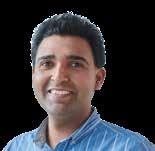
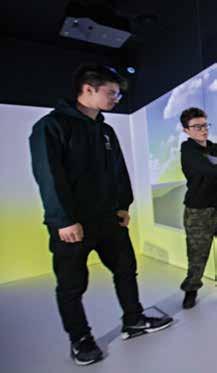
Your campus
Moulsecoomb campus is our biggest campus and is a great place for students studying our architecture, technology and engineering subjects. During its recent transformation the campus became a window into a major construction project. Now it’s completed, students can enjoy purpose-built and renovated buildings, the benefits of living in halls right on campus in the new student village, plus the Students’ Union bar and gym.
Sustainability and inclusivity were at the heart of the build – new areas have been designed to support lots of contact with staff and fellow students and everything you need is on campus, with coffee bars, places to eat and – of course – a library.
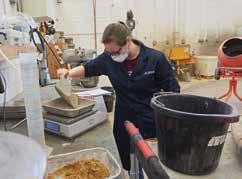
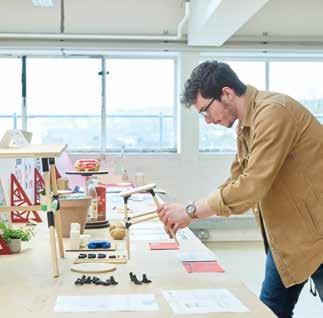
Find out more about the Moulsecoomb campus and student village – and our other campuses – on pages 20–23.


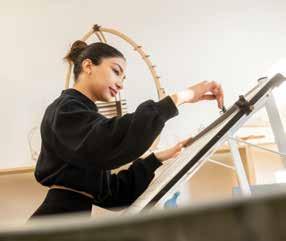
Your city
Brighton is a fascinating city, that combines rich cultural history and period architecture with its reputation for fostering developments in digital technology. There are a number of independent studios leading the way, and a collaborative, come-together attitude is a big part of Brighton culture, with opportunities to connect at tech events and developer meetups taking place every week. For more about the city see pages 24–27.
52
Dr Angad Panesar teaches automotive engineering
Dr Hannah Wood teaches construction and project management
90% of our research impact is assessed as outstanding or very considerable in terms of its reach and significance Research Excellence
Josephine, product design graduate 2022

In my final year project, I designed a device — Opal — that measures biological hunger to help people relearn how to eat according to their internal cues instead of external influences. It provides a reflective and mindful approach, as opposed to current diet-tracking apps.
I chose product design as you get to learn all the skills that are specific to the work you want to do, such as prototyping, research and sketching as well as things like video-editing, graphic design and animation too.
I got to build a portfolio that worked for my aspirations and accepted an offer to work as a visual designer at Amplify in London. I am thrilled to begin my career in something I’m genuinely excited to do!
Harry, building surveying graduate 2020
COMPUTER SCIENCE AND INFORMATICS
WHAT NEXT?
Meet us in-person at an open day or campus tour or go online for tours, tasters and Q+As. And our enquiries team is here to help and advise you. Turn to page 88 for more.
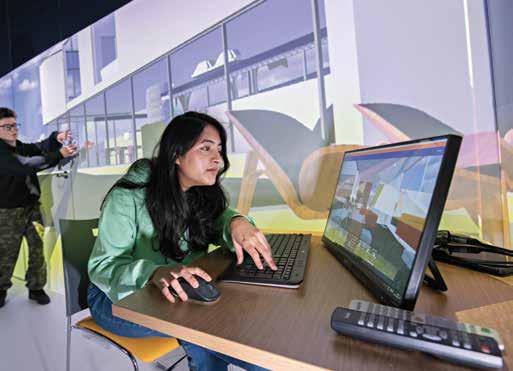
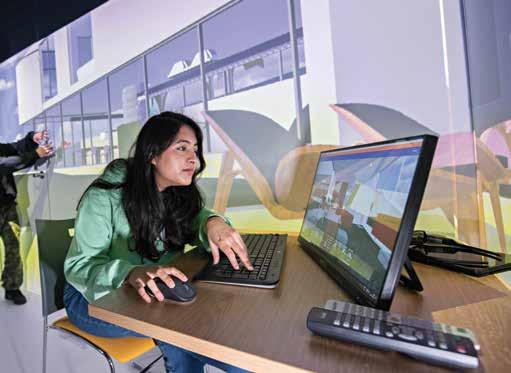
Framework 2021
ENGINEERING 100% of our research impact is assessed as outstanding or very considerable in terms of its reach and significance Research Excellence Framework 2021
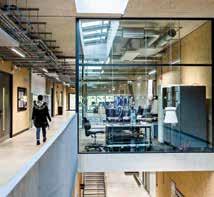
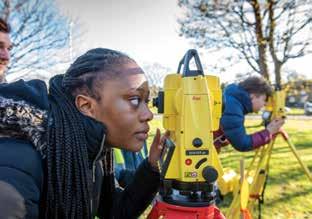
SOFTWARE ENGINEERING
90% of our students said they were satisfied overall with this course National Students Survey 2022
Follow us to stay in touch
Studying at Brighton covered a huge spectrum of what I deal with on a day-to-day basis now –I recently joined Brighton & Hove City Council (BHCC) as a Building Surveyor. The role involves a lot of core building surveying skills, such as the procurement and management of projects for both the council and private commissions city wide.
I would recommend the course to anyone interested in the construction and property industry as a whole. It offers a wide variety of subject areas, from legal disputes to new-build construction. It’s a great step onto the career ladder.

53
SUBJECTS AND COURSES
Art and media courses are spread across a spectrum of disciplines. See the full list on page 40. Find out about your course: www.brighton.ac.uk/courses – or use the QR codes to see all courses in each subject.
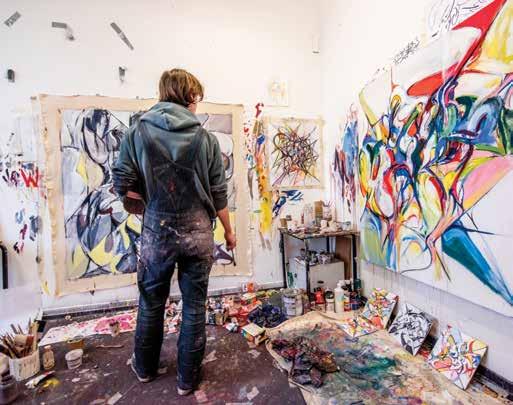
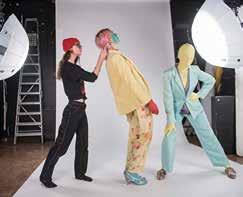
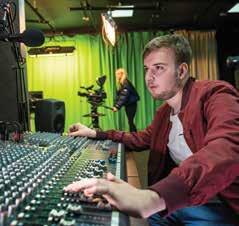
54
Fashion, textiles and 3D design
Fine art Film Journalism Media
Sound and music Visual communication
Photography
Arts and media subjects share a foundation in exploration and expression. With us you’ll push the boundaries to experiment and investigate, developing expertise that’s grounded in practice and consideration of diverse social contexts and sustainability. Professional practice and real-world experience are a fundamental part of your learning experience, building the skills to begin your career with confidence, energy and ambition.
YOU CAN EXPECT
Creativity + professional thinking
While you’re developing your own creative approach and personal style in your work, we’ll also guide you in preparing for your professional life. Depending on your subject or discipline, this might mean developing the professional and transferable skills to support a career as an artist, or exploring your commercial potential so that you’re ready to turn your passion into a fulfilling career when you graduate.
For many of our students a placement is an important step, offering you the chance to use skills learned on your course while building industry contacts. Our fashion and textiles students have been on placement with Burberry, Alexander McQueen, Donna Karan and Erdem, and media students have worked at Google UK, Empire magazine, the BBC, Skint/Loaded Records and Ricochet Productions.
Expert guidance and inspiration
You’ll learn with industry-experienced staff, practising artists, designers, musicians, journalists and film-makers. They’ll bring relevant perspective, knowledge and insight to your studies and practice.
Inspiring speakers like photographers Rankin and Lauren Maccabee, filmmaker Matt Kay, Ithaca Studios’ MD Chris Evans-Roberts, broadcaster James O’Brien and sound practitioner Jo Hutton have visited to share their stories and advice.
I love visual storytelling
Chat online to students like Taby at www.brighton.ac.uk/chat and scan the QR code to check out their blogs and vlogs
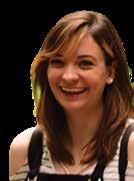
I’ve had support with dyslexia
I chose my course because I aim to inspire and help others through storytelling and the best method is through visual art because art transcends language barriers. My favourite thing about my course is how it has changed me as an artist, challenging me on what I create and put out into the world.
I embrace who I am Many key turning points in my life began at Brighton. I went clubbing for the first time, visited a karaoke bar, swam in the sea, attended and hosted house parties, made friends and socialised with people from all over the world. Most importantly, I learned that being disabled does not make me less valuable or less strong. It increases the value of my time and makes my mind stronger than the average person. I’m no longer ashamed of who I am. I embrace it.
I’m becoming more versatile
My course has made me more versatile. I now have multiple skills in different areas of illustration. I would love to work in book illustrations, animation or video creation. I hope that through a placement I will gain connections to the industry and become better at time management and working as a team on a coherent art piece. I have learnt how to work to a brief – working with others and effectively communicating ideas – and the importance of planning and research. And most importantly, how to take criticism.
I finally got diagnosed with dyslexia at uni, and this enabled me to get extra time on course work. I am supported through one-to-one mentoring, study skills and counselling, and the university created my learning support plan. I have had career support from the university’s Beepurple team, who help students develop their business ideas. I participated in a summer course covering all aspects of running my own business.
I love living in Brighton
It’s a lively, vibrant city with lots to explore. The city is filled with lots of bold personalities and you can wear whatever you want without fear of judgement. My favourite thing about Brighton is going to the beach at night when the moon is full and just listening to the waves.
My disabilities do not define me
While at the University of Brighton, I have been able to finally begin my healing journey for both my mental health and my physical disabilities, which I only discovered with the assistance and support of multiple support networks inside and outside the University of Brighton. The university has taught me that my disabilities do not have to define or prevent me from achieving my goals. Working as a student ambassador for the university has given me confidence and a voice in areas such as public speaking, socialising, teamwork, time management, and so much more. Being here has truly been a blessing. I feel positive about the future.
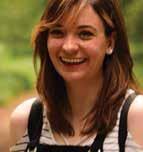
55
MEET OUR STUDENTS
Taby, year 2, illustration
Vanessa Marr teaches digital media

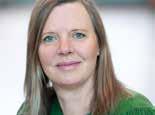
I’m passionate about the role of design to do good, not just as a tool to make the rich richer. As visual communicators, we possess powerful skills to inform and persuade, which can be used to make a difference. I look for opportunities to explore this in my students’ work, for example as personal manifestos that reflect the university’s global challenges agenda and the UN Sustainability Goals, or through taking part in the RSA Student Design Awards.
My main advice to students is to do what you love, not what you think you are supposed to do. I look for this spark when meeting prospective students and reviewing portfolios. We encourage students to explore and experiment with new ideas, and we support them to map their own creative direction.
Phil Tyler teaches fine art printmaking

Print is everywhere, whether in the books or magazines that you read, the posters on your wall or the packaging on your commodities. From the beginning of the course where we teach students the practical and theoretical skills they need as an artist, to broadening their vocabulary and experience of the art world from a global perspective, we equip students with an essential tool kit.
You get out what you put in. If you are not committed to the subject then take time out, and work out what you want to do. It’s not a race but the best students invest in themselves and put a lot into the course.
YOU CAN EXPECT
Showcase your work
You’ll have lots of opportunities to share your work and build recognition, including taking part in exhibitions, conferences and festivals, entering competitions, or responding to live briefs. Arts students work towards the final degree show (which attracts thousands of visitors each year), while journalism students run Overtime Online, developing multimedia and sub-editing skills while publishing and sharing their work.
www.brighton.ac.uk/summer-shows
Specialist studios, facilities and equipment
Our expert technicians are on hand to guide and support you in using specialist facilities. These include textiles workshops in print, knit and weave and fully equipped professional
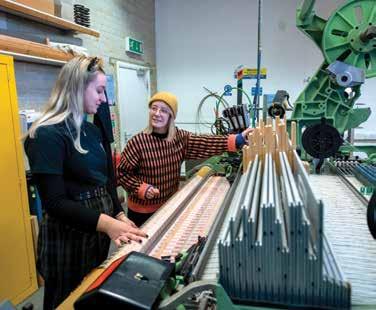
fashion design studios that integrate digital and traditional processes. We also have metal-working equipment, photo studios and ceramics, metal, plastics and woodwork workshops.

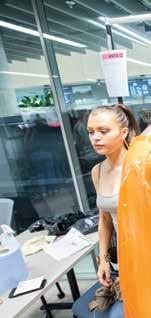
There are dedicated spaces, with computing facilities specifically for digital designers, illustrators and animators. Journalism students build skills in our newsroom with live news and sports feeds, and by working with our sound, filming and editing equipment.
Experiment in the multipurpose studios with lighting rigs, a sound booth, specialist sound equipment, TV studio with green screen, plus a photography area. Or use our highspec camera equipment, darkrooms, performance space, screening rooms and music studios to make your project a reality.
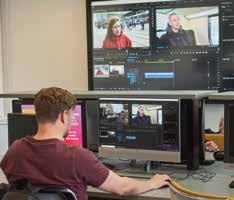
56
Making waves
Study a course where graduates and staff achieve critical acclaim. Fine Art Painting graduates Morag Caister and Elisha Enfield won the 2022 Sky Arts Portrait of the Year and Landscape Artist of the Year titles respectively.
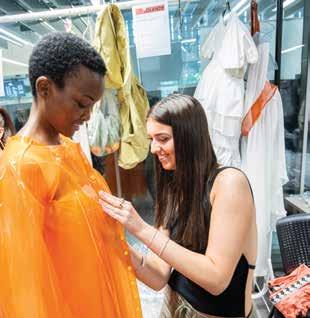
Media lecturer Lance Dann has two Audio Production Awards for his podcast, and his work has even become part of the school curriculum.
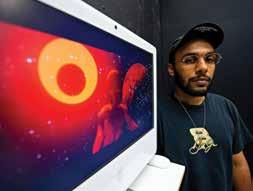
Journalism graduate Jordan Hogan won a 2022 TV reporting Emmy and 3D Design and Craft alumni Chloe Hook and David Lily both appeared in 2022 TV shows, Chloe on C4’s Handmade: Britain’s Best Woodworker and David on BBC2’s All That Glitters. Not forgetting our Turner Prize-winning alumni artists Helen Cammock, Rachel Whiteread and Keith Tyson.
A practical course suits me
Chat online to students like Viktorija at www.brighton.ac.uk/chat and scan the QR code to check out their blogs and vlogs

My decision to study media production at Brighton was mainly influenced by the university’s state-of-the-art facilities. Working on projects with fellow students is something I enjoy, such as completing a music video in the TV studio. The majority of my course is practical, and any theory must be applied, so I found the workload and modules a good fit for my learning style. I need to put my thoughts into action since I think quickly and want to create stuff all the time.
Uni is so different to college University is far more independent than college. I recall teachers would tell me to study outside class at college, but today I continually set aside time for deadlines. Another difference is lecturers are more approachable at university. I can have discussions with lecturers over coffee and learn more about the subjects.
I’ve learnt teamwork
In the first year I learnt to work in groups, and this helped me understand people’s strengths and limitations, and communicate effectively as a team member or leader. Organisation has been a major factor throughout my course. An example was preproduction, where we had to fill out health and safety documents, storyboard scripts, shortlists and other documents needed for shooting days.
We support each other
It was challenging to adjust to university life, but I always had the support of my lecturers, who were compassionate in person
and online. It’s reassuring to know everyone is in the same boat. My fellow students are available for support and advice, and lecturers offer assistance quickly. I encourage other students and prospective students in my role as a student ambassador. Everyone learns from one another’s errors in the media production industry, and if you don’t support one another, a project can break apart very fast.
I’m learning to manage my time
I haven’t yet come across a student who manages to juggle everything. Balancing work, study, social life and family life all at once – it’s important to learn to schedule well. I always use a calendar and diary to plan ahead. I’ve developed the habit of writing to-do lists on my whiteboard. I use two different colours and divide the board into two sections: one for home and education tasks, and the other for tasks I frequently overlook, like self-care and doing my favourite things.
A placement boosts my career prospects

We had a placements module in the second year. To proceed to this placement, we learnt how to enhance our portfolio, understand industry-related CVs, and the interview process. The placement module helped me realise that I didn’t want to work in the film or television industry, but rather wanted to focus more on marketing, content creation and online presence. None of this would have been possible without the placement module.

57
MEET OUR STUDENTS
Viktorija, year 3, media production
The balance of an evolving career, from a successful commercial practice internationally to working in moving image and contributing to the critical discourse of illustration, has led to some amazing opportunities for me such as speaking at the Sorbonne Université Paris, a Grand Master Lecture Tour of China in 2019, and I have received international awards in both illustration and film-making.

I love the tutorial conversations with students, helping them find their own visual language through enquiry, investigation of subjects, experimentation and play. The course provides a safe space to try things, with a staff team to help explore what illustration can be, not simply what it is, encouraging selfreliance and resilience.
Brighton launched the first sports journalism undergraduate course in the country and we are real pioneers. I’ve gone from writing about sports as a journalist to writing about sports journalism as an academic. Journalists now have obligations to global society and must raise awareness of international issues such as Qatar hosting the World Cup.
You study and work in journalism because you love the writing and the telling of stories, getting out there meeting and speaking to people, the sociability and curiosity of it all. That feeling of making a difference to society – raising awareness of social issues and using your platform to give a voice to the voiceless.

YOUR SPACE
Your campus
Media and journalism students are based at Moulsecoomb, with its newsroom and audio and video editing suites – it’s our biggest campus and student village and you’ll be learning alongside students studying everything from product design to literature, geography to pharmacy. Everything you need is on campus, including a new gym and the Student Union bar.
Arts students are based at City campus. This has facilities for making and designing, workshops, studios, the theatre and galleries of our
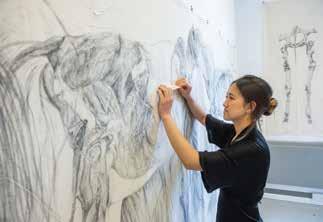
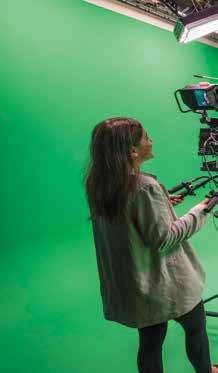
Centre for Contemporary Arts
(brightoncca.art), and the independent arts organisations based on site which make for an inspiring environment. Find out more about our campuses on pages 20–23.
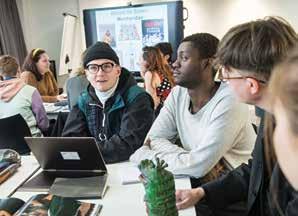
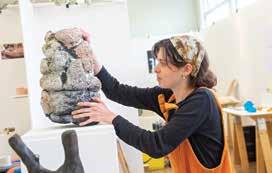

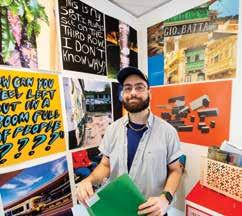
Your city
As a catalyst for many creative careers and start-ups, we play a central part in Brighton’s reputation as a progressive, forward-thinking city renowned for creative and digital enterprise. Our strong relationships with media and arts organisations offer exciting opportunities for you to be involved in the city. For more about the city see pages 24–27.
58
Dr Simon McEnnis teaches journalism
Roderick Mills teaches illustration
ART AND DESIGN COURSES
5th IN THE UK FOR GRADUATE PROSPECTS
Guardian University Guide 2023
FINE ART Joint 8th IN THE UK AND IN THE TOP 100 GLOBALLY QS World University Rankings® 2022
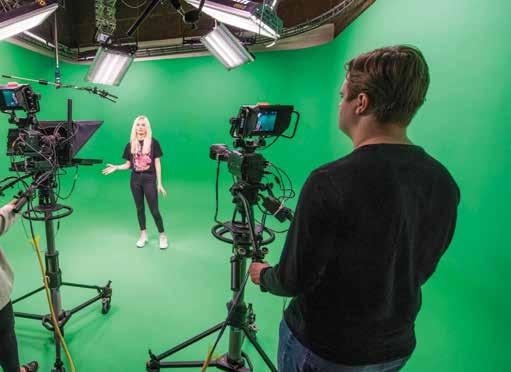
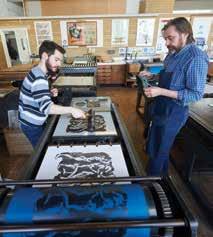
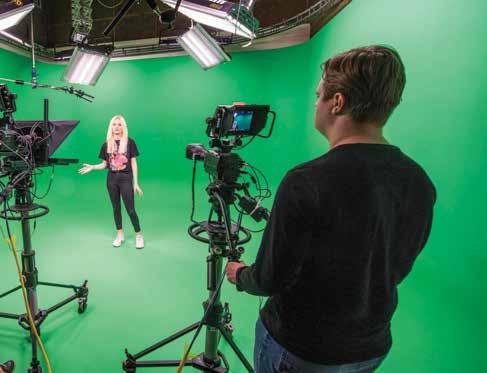
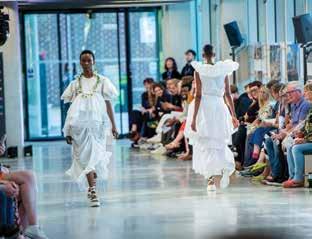
WHAT NEXT?
Meet us in-person at an open day or campus tour or go online for tours, tasters and Q+As. And our enquiries team is here to help and advise you. Turn to page 88 for more.
Miranda, fine art painting graduate 2019

Miranda Forrester was named Breakthrough Artist of the Year at the 2022 Soho House Awards, after a string of exhibitions in the UK, Switzerland and Nigeria. She is also among artists acquired to the Arts Council Collection and has featured on Sky Arts Inside Art. She describes her work as exploring the queer black female gaze in painting, seeking to address the long-time invisibility of black women in the traditional history of art.
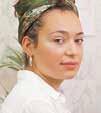
I really enjoyed my years at Brighton. The course enabled me to explore my ideas, and was instrumental to the development of my painting style and current body of work. I was able to hone in on how I want to represent my ideas and concerns in my work, while being exposed to different artists and ways of thinking.
Jacob, media graduate 2019

I’m a video editor at the National Theatre, creating long and short form content for NT Live and NT Home.
My course was incredibly engaging, working on all forms of video production. Although a large portion of the course was based around live television broadcasting, there were other option modules such as sound design, documentary production and scriptwriting, that were all equally as informative and relevant to real-world situations. The work was very group focused, which definitely helped me understand the team dynamic in the creative industry! Almost everything I learnt on the course has carried over to what I do now.
Follow us to stay in touch
59
SUBJECTS AND COURSES




Business and law courses offer lots of flexibility to specialise in areas that interest you most. See the full list on page 41. Find out about your course: www.brighton.ac.uk/courses – or use the QR codes to see all courses in each subject.

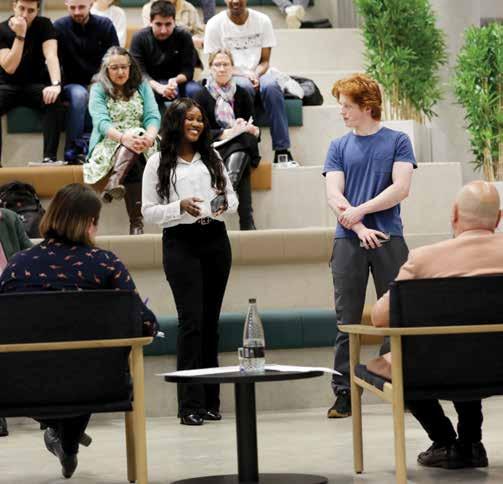
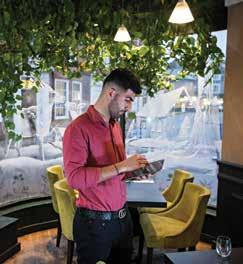
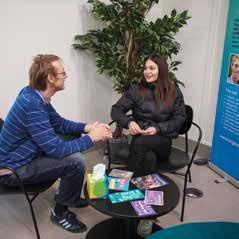
60
Accounting, finance and economics
Business and management
Law Marketing, events and tourism
Be part of a community of specialists gaining professional, practical expertise. You’ll apply your new knowledge and skills as you learn, through live briefs, contact with employers and work placements. And you’ll be part of a socially conscious learning community; the next wave of responsible leaders, innovators, advisers and entrepreneurs that care about the world they’re set to shape.
YOU CAN EXPECT
Transferable, relevant skills
Our courses merge the academic and professional worlds. You’ll explore real-world issues and develop transferable attributes (see pages 12–15) through case studies, employerbased projects, industry competitions and visiting expert lecturers.
Professional accreditations to kickstart your career


Your course will reflect the latest industry thinking through close links with professional bodies. When you study an accredited course, benefits can include dual awards, exemptions from professional exams, student membership, networking events and career programmes.
Paid hands-on experience
Take an optional placement year and gain practical experience that can help you secure a job after you graduate. You’ll get to use the knowledge you’ve learned on your course, build confidence and skills, and come back for your final year feeling focused and motivated. Our students have completed placements with organisations from American Express and IBM to Disney and L’Oréal. Law students can gain qualifying work experience through our pro-bono University of Brighton Legal Clinic, where you’ll provide the community with free legal advice, under the guidance of qualified solicitors and barristers.
Prospects and purpose
The United Nations Sustainable Development Goals (UNSDGs) – relating to poverty, inequality, climate change, environmental degradation, peace and justice – are a major influence in the way in which we develop our courses, enabling our students to become the leaders who reach the political, technological and financial solutions needed to create a more sustainable future for the planet. We are signed up to PRME, a United Nations initiative raising the importance of sustainability amongst business students globally.
www.unprme.org
Joe, year 2, business management

Ethical, sustainable business inspires me
Chat online to students like Joe at www.brighton.ac.uk/chat and scan the QR code to check out their blogs and vlogs
Uni really suits the way I like to learn
I have always had a passion for business, and I want to have my own and be self-employed. I am interested in furthering the way for ethical capitalism and want to run sustainable and fair businesses. I like the idea of setting my own rules and hours, and I want to make sure that the rules and conditions of the workplace are fair. At uni the HR module was very insightful because it showed me a lot about the behind-the-scenes theory that I didn’t know about.
Group work can be loads of fun
My favourite thing about my course is getting to collaborate on group work with my peers. We did one project where we worked on creating a product or app. We came up with an idea, how we were going to fund it, whom it was aimed at, and where and how much advertising we would do. It was a bit like Dragons Den. We recorded the pitch on video, and then we had to take questions afterwards from the whole class. I enjoyed presenting, it was a nice chance to put some showmanship into my studies.
Everyone is so helpful
The lecturers are so friendly and helpful. Anytime I need help or want to chat they have always been happy to. I struggled with being away from home for a while, however I got help from the SSGT (Student Support and Guidance Tutor). He helped me get into a society and to talk to people on my course because I was quite anxious about meeting new people.
There is so much more freedom studying a degree than in sixth form and it is a lot more tailored to my learning style. I like to find different ways to explore things. Studying at uni, we find out why and how things are done, and then we give it a try – there’s a lot more practicality than when I was doing my A-levels. I have had modules where I could choose a multiple-choice test or an essay for the assessment. I’ve always gone for the essay because I’d rather do that.
I’m planning for my placement year
My course is preparing me for my career by providing me with opportunities for both theorybased learning and the option to do real-world projects that help me visualise what I have learnt. I am starting to plan my placement year. I’m interested in exploring consumer marketing and I’d like to spend a year with a company near my home which creates products that go into supermarkets.
Living in halls helped me find my feet
My experience in university halls was very social, my flat-mates and I had lots of movie nights and got on very well. The halls were modern, comfortable, and provided a great place to live! It’s amazing how quickly you will make friends and get to know more people!
61
MEET OUR STUDENTS
Lyvia Royd-Taylor teaches marketing management
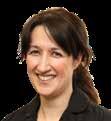
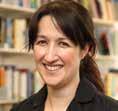
Lyvia was nominated for the Most Innovative Teacher of the Year award at the Times Higher Education Awards 2022. Her shortlisting highlighted the live client group project she developed, which gives students the opportunity to gain practical insight and experience by providing support to external charities.
I decided to study organisational behaviour and HRM to understand the dynamics of human behaviour in business organisations. My research offers insights and resources to my teaching. I’m passionate about teaching – it is an opportunity to undertake a journey in learning, questioning and reflection, and finding solutions to actual organisational issues.

YOUR SPACE
Your campus
Dr Tim Laing teaches economics
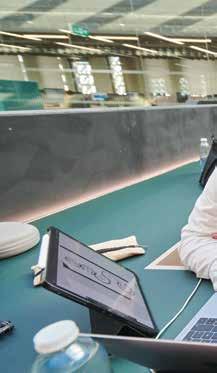



Economics is an important subject – not just for understanding businesses, money and the economy – but also for the behaviour and actions of people and governments. Our approach to teaching economics focuses on building a community of learners. We work with students to build theoretical and data analysis knowledge, and then allow them to find their own pathways to apply these skills to the topics that interest them most.
Elm House, our newest building, is home to our Brighton Law School and Brighton Business School. There are plenty of flexible teaching and collaborative spaces where you can connect with staff and students. Specialist facilities include a trading room with Bloomberg terminals, using the same data that’s used on trading room floors around the world.
Law students can gain practical experience of mooting, negotiations and client interviewing, plus volunteer in our University of Brighton Legal Clinic. Business students can benefit from regular events, networking opportunities and our proximity to local business groups.
Everything you need is on our Moulsecoomb campus, with coffee bars, places to eat, a library, a brandnew gym and our SU bar just moments away. Find out more about the Moulsecoomb campus and student village – plus our other campuses – on pages 20–23.
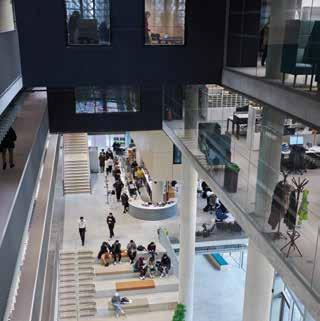
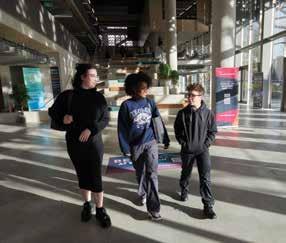
Your city
Home to hundreds of businesses that do things differently, Brighton has the highest number of start-ups per capita after London. Be inspired by the entrepreneurial and purposeful spirit of Brighton. For more about the city see pages 24–27.
62
Dr Celestine Ike Nwachukwu teaches business management with human resource management
Jasmin, law graduate 2022
I currently work as a paralegal at a Sussex-based law firm. I began working in law during my second year of university within the legal tech sector and transitioned into commercial law a year later. Since then I’ve worked across the employment, litigation and enfranchisement teams to build my knowledge of the different sectors and options available to me.
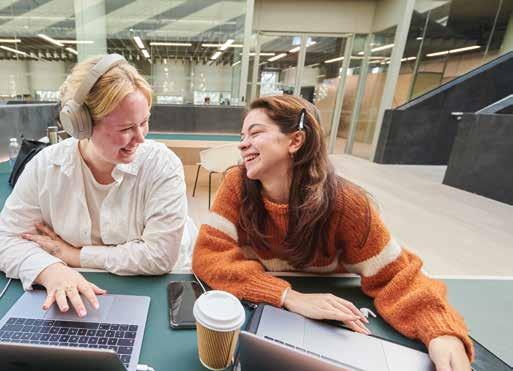

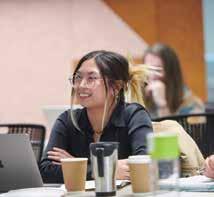
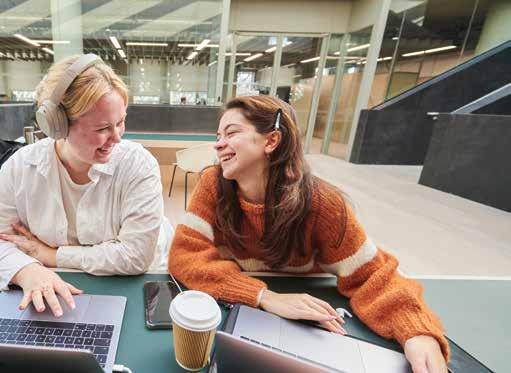

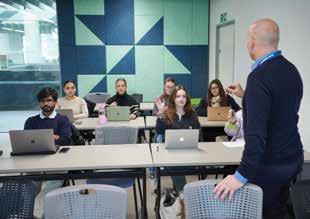
During my first year I won the award for academic excellence and in my second year for contributing to the student experience through my role as President of the Law Society. All of which wouldn’t have been possible if it weren’t for my lecturers, who guided and supported me throughout my time at Brighton uni. I’m grateful for the role they played in both my academic and career development.
I’m a label owner, music production/DJ teacher, mastering engineer and international resident in Ibiza, France, the UK and Dubai. My company, Music Workflow Academy, has a range of courses to help beginner DJs and music producers become professionals in the music industry.

Brighton taught me everything I needed to know about business. It also provided the network and support for me to chase my dreams. The transferable skills [I learned] allowed me to network, conduct my business confidently and secure the business of my dreams. The lecturers were very supportive of me and I couldn’t have wished for a better uni experience.

63 TOP 20 IN ENGLAND FOR GRADUATE PROSPECTS Complete University Guide 2023 ACCOUNTING AND FINANCE 2nd IN UK FOR TEACHING QUALITY AND STUDENT EXPERIENCE Times Good University Guide 2023 ECONOMICS WHAT NEXT?
us in-person at an open day or campus tour or go online for tours, tasters and Q+As. And our enquiries team is here to help and advise you. Turn to page 88 for more. Follow us to stay in touch MARKETING 11 th IN UK FOR GRADUATE PROSPECTS Complete University Guide 2023
Meet
Omar, business management with marketing graduate 2018
SUBJECTS AND COURSES
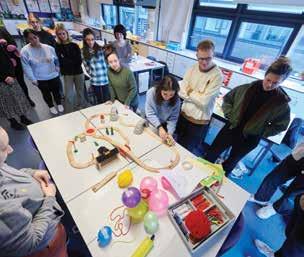
Education courses enable you to explore the concept of education in-depth, or gain qualified teacher status at primary or secondary level. See the full list on page 41. Find out about your course: www.brighton.ac.uk/courses – or use the QR codes to see all courses in each subject. Education studies
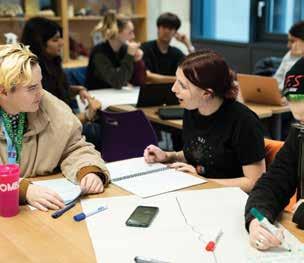
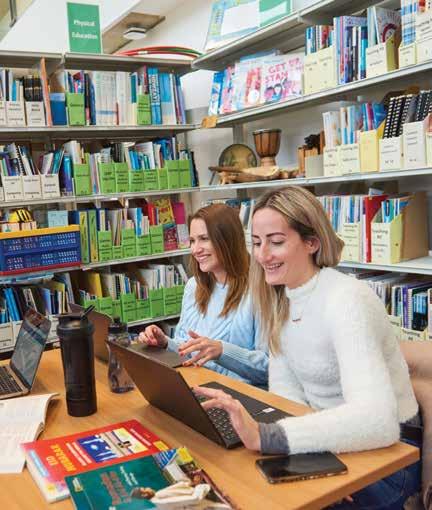
64
Teaching
Become an education professional who can make a positive impact on the life chances of others and contribute to a better society. Placements are at the heart of your learning and our strong partnerships with schools and other education settings make sure that our students receive the best possible support and education.
YOU CAN EXPECT
Facilities that mirror the work environment
Study in our multimedia suites, science labs, English, art and mathematics specialist rooms – a great learning environment that replicates school classrooms. PE students use the extensive sports facilities and resources on campus. The Curriculum Centre has more than 30,000 specialist resources, providing inspiration and ideas for lesson planning and assignments.
Placements in school and beyond
Put your teaching into practice with our partner schools across the south-east. You’ll gain well-rounded experience through opportunities in small, large, urban and rural schools. Education studies students can explore their career options through placements in settings including nurseries, schools, local authorities, charities and community-led organisations.
An inspiring team
Learn from a teaching team with diverse research knowledge – from children’s rights to cognitive development – and who have years of practical experience of working in the education sector.
Study beyond the classroom
Enrich your experience through study visits to places such as museums, forest schools and alternative educational settings. Regular visiting experts provide a range of perspectives, and encourage and challenge you as an emerging education professional.
Further study
After your degree, take your knowledge of education to the next level with our PGCEs and masters.
Placements are a chance to prepare for the challenges ahead
Chat online to students like Tasnim at www.brighton.ac.uk/chat and scan the QR code to check out their blogs and vlogs

On my course, there is schoolbased training in all three years. The training gives us a chance to take the policy and practice we have reflected on in our lectures and seminars and put it into practice. It gives us opportunities for growth that we wouldn’t have gotten from just our lectures and seminars. I think our sense of professionalism is what we develop the most. Working with other professionals in the same field gives you the chance to observe and learn from their actions and to reflect on them.
Gaining experience before my course really helped Outside of my course, I help tutor young children. This is something that I started before I started my degree. My experiences from tutoring have contributed to my school-based training, and vice versa.
There are a lot of resources and study facilities available to us
My personal favourite is the Open Learning Centre/Curriculum Centre, which provides all resources that you’d be looking for as a student of education. Not only textbooks, but picture books, puppets, props and much more. It helps you to really immerse yourself in the classroom teaching experience. It’s the place I enjoy showing people the most!
We did a workshop with the National Theatre
As part of our English specialist module, we took part in a workshop hosted by the National Theatre alongside a professional storyteller, where we worked
on using drama for storytelling in the classroom. The workshop was really fun and we all really enjoyed it, at the same time we were all able to reflect on a whole new set of practices that we can take with us to our classrooms. This workshop made me really grateful for having chosen the English specialist module as the experience was unforgettable.
We have meaningful conversations in seminars My sessions are in person and most of them are seminars. Having seminars over lectures means we can develop a comfortable environment with our classmates and everyone can voice their thoughts and experiences. A lot of our sessions are very hands-on and we’re able to put ourselves in the mindset of the children. Everything we do is relevant and contributes to our school-based training, and I have found myself thinking back to session content whilst in placement.
I feel excited for what the future holds!
I’ve not only learnt a lot about how to be a good practitioner, but we’ve also had multiple discussions how we can bring positive change as part of the new generation of teachers. I’ve become a lot more confident in my skills in my time at Brighton, and also enjoy my studies a lot more. I feel more positive that I can use my skills to contribute towards good change, something that I would never have thought of before.
65
MEET OUR
STUDENTS
Tasnim, year 2, Primary English education
My proudest moments as a teacher are when I see my students graduate, and their professional contribution to the field of early childhood care and education. I feel honoured to witness their growth and development; from entering as first years unsure if they have chosen the right course, to seeing how they have grown personally and academically in their final year.
I love making a positive difference to the lives of children. As a primary school teacher, I love being a teacher and advocate for ALL subjects – getting to be an art, science, history, geography, English, PE, RE, science, maths, computing, music and PSHE teacher is incredible. I love that no day is the same. I love learning as much from the children as they learn from me!
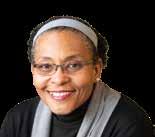
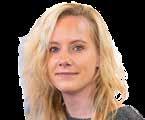
YOUR SPACE
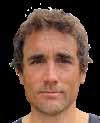

Your campus
I manage a team of technicians that look after our workshops, laboratories and teaching spaces. We also provide students with resources for their sessions and projects. Supporting students and seeing them leave our spaces with a smile on their face is something that we never get tired of. My advice would be to come to the open days and see our great resources for yourself.
Our Falmer campus is only four miles from the city centre, but is on the edge of the beautiful South Downs. You’ll be based in Checkland Building with plenty of informal study spaces to get together for group work, working alone or just socialising.
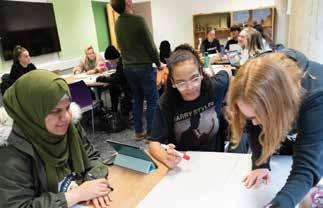
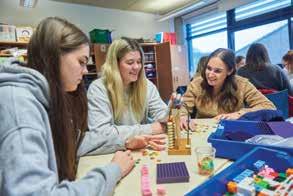
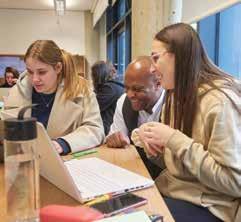
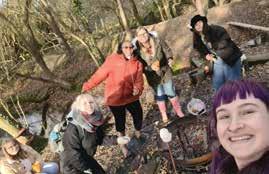
Everything you need is on campus, with coffee bars, places to eat and –of course – the library. There are two halls of residence at Falmer so lots of students live right on campus. There’s a Students’ Union meeting place and cafe bar, and they have a shop on campus too.
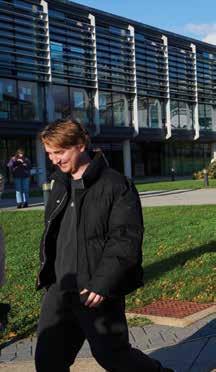
Falmer has lots of green space and excellent sporting facilities including a floodlit astroturf football pitch and a sports centre with a fitness suite. The campus is right next to the Amex Stadium, home of our Premiership football team Brighton & Hove Albion. Find out more about the Falmer campus – and our other campuses – on pages 20–23.
Your city
Falmer students have the best of both worlds. You’re on the edge of the countryside, but can easily jump on a bus or train, which stop right on campus, and explore the city centre. For more about the city see pages 24–27.
66
Kayleigh Morley supports our education students
Tim Laing teaches primary education
Dr Lesleann Whiteman teaches early childhood education
WHAT NEXT?
Meet us in-person at an open day or campus tour or go online for tours, tasters and Q+As. And our enquiries team is here to help and advise you. Turn to page 88 for more.
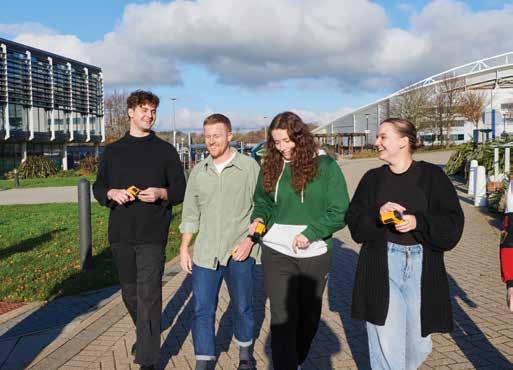
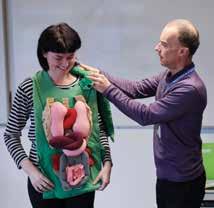
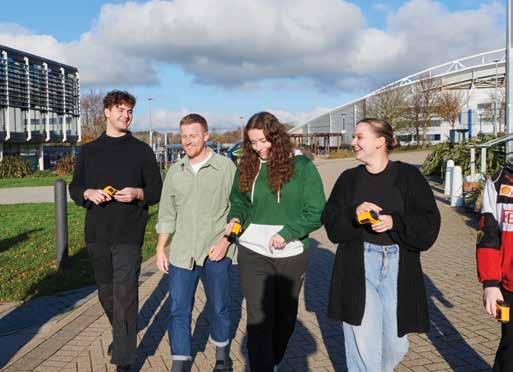
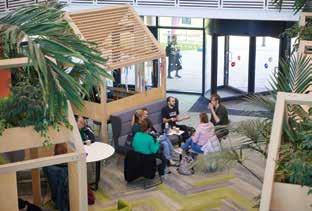
Josephine, early childhood education and care graduate 2022

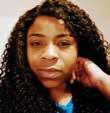
The University of Brighton was my first choice because of its reputation and commitment to boosting graduate opportunities. Knowing that the university has highly qualified professors in my field of interest also helped to affirm my decision. The team have provided me with advice and encouragement. All members of staff have been very patient and in their capacity as lecturers they have always gone the extra mile to support me. My observational study visit helped me to make connections from theory to practice. I enjoyed observing practitioners interacting with children and this experience worthwhile because there was a good balance of adult-led activities as well as child-initiated play. The course taught me about good practice in early childhood education settings and I feel confident to challenge anything that is contrary to what I have learned especially when it comes to safeguarding children.
Follow us to stay in touch
James, primary teaching graduate 2021
I am enjoying my job as a year 2 class teacher. It has been challenging but a great opportunity to develop as a practitioner, and to apply the learning from my degree. It has also been a valuable learning experience to work with colleagues, from teaching assistants to senior leadership members. I feel that I am increasingly able to advocate for change and promote a positive classroom environment that values every child.

67
OFSTED ‘OUTSTANDING’ EDUCATION EDUCATION
EDUCATION
8th IN UK FOR EDUCATION COURSES
University
2023
20 IN THE UK FOR EDUCATION COURSES
Times League
2023
Guardian
Guide
TOP
The
Tables
Criminology and sociology

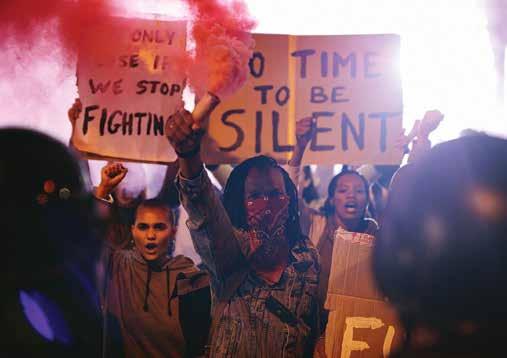
History of art and design
Humanities
Language and linguistics
SUBJECTS, COURSES AND SPECIALIST PATHWAYS
Our humanities and social sciences subject offer lots of flexibility to specialise in areas that interest you most. See the full list on page 42. Find out about your course: www.brighton.ac.uk/courses – or use the QR codes to see all courses in each subject.
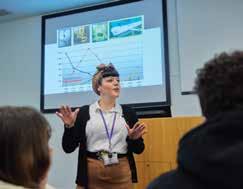
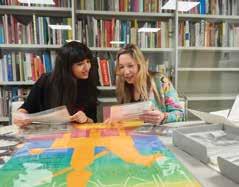
68
work Psychology Politics
Social
Creative writing
Literature
Be part of an inter-disciplinary learning community focused on the world that humans have created. Explore art, language and culture, political and social structures, and the human mind and critically examine the challenges facing our world. And, as our academics bring their research to their teaching, you’ll apply new thinking to global issues like health, environment, social policy and inequality.
YOU CAN EXPECT
Relevant and purposeful learning
Examine the causes and consequences of human behaviour, deepening your understanding of the way the world is structured and the experiences and relationships of the people in it. You’ll develop skills in research and critical thinking, opening up stimulating and meaningful career paths.
New thinking
You’ll learn with course teams whose research and professional interests are reflected in their teaching – specialisms that are rooted in real world issues and new ideas. You’ll experience first-hand how new knowledge can be developed and applied to creative, political, psychological and social challenges and settings.
Work experience that matters
We’ll help you find a placement or project where you can put your learning into practice and develop your skills and experience. And it’s a chance to be involved in something that matters to you. Our students have gained insight into the working lives of curators and archivists, have applied their skills in activist and policy organisations and have contributed to the work of charities like the Samaritans.
Vital, adaptable skills
You will find your voice, in your writing and through discussion and presentations, in a friendly and supportive community. And you’ll build vital transferable attributes (see page 12–15) – like solution building, public speaking, critical analysis and thinking, project planning and an in-depth understanding of the world we inhabit – making you highly adaptable and employable and giving you flexibility and freedom in your career.
Ousainou,
year 2, philosophy, politics, ethics
My course gets better and better
Chat online to students like Ousainou at www.brighton.ac.uk/chat and scan the QR code to check out their blogs and vlogs
From the introduction to relevant concepts and theories to more indepth analysis, each lesson feels like a continuation. The first year introduced us to history, politics, and philosophy with a wide range of topics from democracy, cultural studies, world history, globalisation and philosophical inquiries. The second year gave us more intriguing courses like critical theory and thinking, an in-depth look at history and the age of European dominance, and politics of critique, with more option paths to choose from. My lectures are interactive and there are different learning tools and support, and lots of resources online to help catch up on missing classes and reading lists.
Staff are available when I need support
My first-year history tutor Becca was remarkable. Her seminar sessions were great and full of fun. The student centre provides excellent services to students and advisory staff are always available and ready to work with you. Lecturers will create time for you to go over coursework and essay tutorials. The overall experience is very impressive.
Studying at Brighton has changed me for the better
My interpersonal and communication skills have improved a lot and I have a lot more confidence in dealing with matters that I would have shied away from before.
I have learned to be better at organising schedules, keeping up with work-related timeframes, working in a team, and sharing valuable and timely information to achieve group success. I have also learned to be independent in my thinking and critical in my judgment, to add value to resources, and to take bold initiatives in line with modern and current needs. The friendly and welcoming atmosphere makes everyone feel as if they belong and are at home. There is beauty in diversity and the university just makes it glow.
I can see where my career is going
I would like to think I have pretty much mapped out my career path with my current studies. I hope to continue and pursue a masters in government and corruption. My ultimate goal is to offer the radical political and governance change Africa needs. With so much corruption, and mismanagement of country resources, Africa needs a new breed of political actors and to say I want to be the next Cheikh Anta Diop will be an understatement to my aspirations.
Before moving to the UK, I had the privilege of working with the Medical Research Council in the Gambia as a field and data collection worker. This experience put me in direct contact with local community members. I have learned from their experiences and trials. Such exposure sets in my current desire to participate in politics through which the narratives can be changed. The course has given me new insight and knowledge to create the things I am passionate about with diligence and pragmatism.

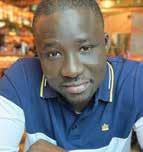
69
MEET OUR STUDENTS
Craig Jordan Baker teaches creative writing

The golden thread through my career has been a love of language and how humans go about using that most allusive and sometime illusive of tools. Since being at Brighton, I’ve won and been nominated for teaching awards a number of times and I hope this is because I genuinely enjoy my work and so my students enjoy me enjoying my work! My subject is significant because we all spend a large proportion of our waking lives engaged with art, though we don’t often recognise it. To understand how art is made and how we might better engage, learn from it and indeed do some of it ourselves is one of the important ways we can add richness and complexity to our lives. The advice I would give all students is to read widely and read deeply.
Dr Kerry Fox teaches psychology


Psychology is how we think, feel and act within our contexts. There is no situation that we can’t apply psychology to when there are people involved, and the endless possibilities of applying psychology are what make it so relevant.
I enjoy teaching topics that relate directly to my research interests, and I really enjoy it when students tell me they’re not looking forward to learning something or find it hard – usually research methods – but by end they completely get it and you can see their sense of accomplishment. Choose what you love. If you enjoy it, you don’t know where it will take you. You can’t fake enthusiasm or interest!
YOU CAN EXPECT Preparation for your practice
If you study psychology or social work, your degree will be professionally accredited – this puts you on the path to professional practice. You can find out more on the online course pages.


Psychology students will learn in our multi-purpose resource labs, developing skills and insight through computer-based experiments and. focus groups. And social work students spend around 170 days building hands-on experience in the private, voluntary or independent, and statutory sectors.
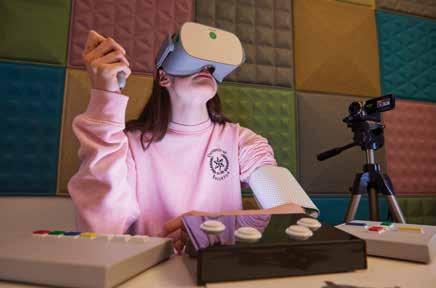
Choose to specialise
Many of our humanities and social sciences courses enable you to explore and expand your knowledge in an area that interests you most.
Choosing modules in a specialised area will give you a deep, critical understanding of the subject. For students studying war and conflict, this could be terror and terrorism or culture and conflict. While our creative writing students can choose a wellbeing pathway, exploring the relationship between arts and wellbeing and how their own work links to these transformative and vital fields.
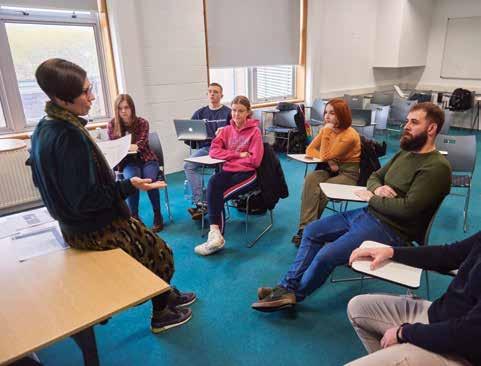
70
Dr
Angelica, year 2, English literature and creative writing
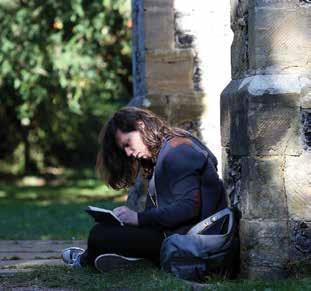


I’m studying what I love
Chat online to students like Angelica at www.brighton.ac.uk/chat and scan the QR code to check out their blogs and vlogs
I chose my course because I’ve always enjoyed and been good at English literature and creative writing. I thought it’d be good to do something that would lead to a career that I’d be excited about. I’ve always had a flair for rhyming poetry from a young age, and I think writing is so important in everyday life. My degree is also quite open, which is good as I’m not completely sure about what I’d like to do, but I can pretty much do any job after leaving university with my degree.
I love that my course is 100% coursework
There are no stressful exams under strict time limits. We get weeks to prepare our work for assessment, and the topic choices and ways of presenting them are very open for us to interpret.
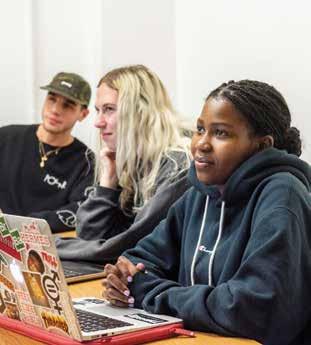
The staff are friendly and welcoming

All of the lecturers and members of staff are so friendly and welcoming. Although I was extremely nervous, I felt at home almost instantly. The people who stand out to me are Irralie Doel and Peter Blake, who constantly supported me through the first semester, making sure I had the help and encouragement I needed.
I’m excited for my second year
In year 2 I am looking forward to my second year, as I get to tailor my degree more to my interests, getting to pick two modules per semester that I’m interested in. These will help me gain the relevant skills I need for future careers. I’m also very excited to be doing a placement module, as I will be able to gain relevant experience which will be useful
and look good on my CV. Within my placement module, I hope to use my skills of writing copy and content creation in a technical environment.
I really enjoy volunteering
I have started volunteering at a Creative Writing Organisation called Little Green Pig, who run after school clubs for children aged 7–11 in the local area. It’s been really fun getting an insight into the creative minds of children, who have inspired me in my own writing in so many ways.
My course is a community
All the students on my course are part of a WhatsApp group, which we created on the first week of term in our first year. It’s still going strong, and people talk on it every day, offering support, advice, sharing important information, getting to know each other, and planning meetups outside of uni. Working together on group projects helped me to connect with other students from my course as we kept in regular contact and supported each other throughout the task.
I love being an ambassador
Being a student ambassador has been the best thing I’ve done so far at the university. It’s giving me a taster of what different things are like in the working world, so I’m gaining lots of experience which I wouldn’t have had the opportunity to access otherwise. I’ve been able to try out so many different things, experimenting working with all ages, members of staff and other students. If new students get the chance, this is something they should definitely do!
71
MEET OUR STUDENTS
Dr Vicky Margree teaches humanities

I was drawn to teaching because it means you get to talk about subjects that fascinate you with people who are also interested in them. I feel that I learn from my conversations with students at the same time that I am helping them to learn. Education is transformative. It means you become able to do things that you’d never imagine you could – whether that’s to produce a long piece of writing, or deliver a talk before a roomful of people, or become an expert on a subject you didn’t even know you were interested in. Students are recognised as individuals on our courses, and very much supported in relation to their particular needs and interests.
Dr Chrystie Myketiak teaches language and linguistics

My work has always focused on addressing global challenges. The world is very unequal and often unjust. I have researched a lot of different topics that are important and timely, including the practices of sex workers in their non-working lives, but my research on mass shootings and mass violence is especially significant because mass shootings are a very serious contemporary social problem.
One of the most rewarding parts of teaching is when things connect for students – the moment when they connect their own lived experiences of the political and social world with the sometimes dense and esoteric material that we’re studying. That moment often serves as a catalyst for building the confidence that they can take on the world.
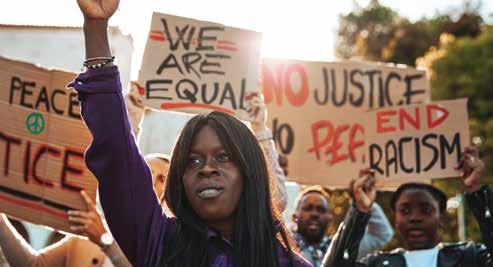
YOUR SPACE
Your campus
Our humanities and social sciences students are based in newly renovated Mithras House, at our biggest campus, Moulsecoomb. A heritage building, the interior is being remodelled (ready for 2023) with an emphasis on sustainability, so that students studying social, creative, cultural, historical, political, professional, social care and therapeutic subjects are together in an interactive and collaborative space. It’s a fresh and exciting new space with lots of opportunities to share work and socialise with staff and fellow students.
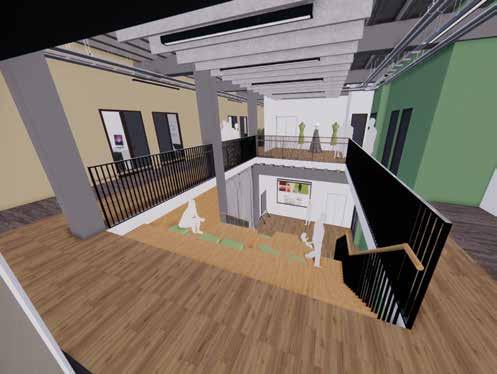
Everything you need is on campus, with coffee bars, places to eat and – of course – a library. Not only that, you’ll be moments from the SU bar and gym. Find out more about the Moulsecoomb campus and student village – and our other campuses – on pages 20–23.
Your city
We have a real connection with the city; it’s known for its creativity and its shared concerns for sustainability, equality and inclusivity. Active involvement in this community makes our teaching and research more important and compelling. For more about the city see pages 24–27.
72
The interior of Mithras House is being remodelled specifically for our humanities and social sciences students. It will be ready in 2023.
ENGLISH LITERATURE

91% of our students said they were satisfied overall with this course National Students Survey 2022
HISTORY OF ART AND DESIGN
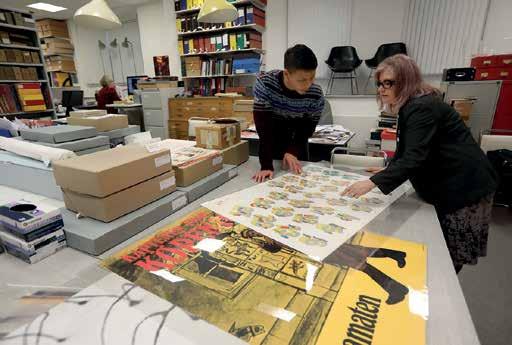
Joint 2nd IN THE UK FOR GRADUATE PROSPECTS
Complete University Guide 2022
WHAT NEXT?
Meet us in-person at an open day or campus tour or go online for tours, tasters and Q+As. And our enquiries team is here to help and advise you. Turn to page 88 for more.
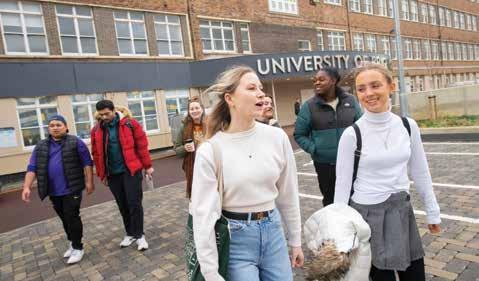
Rachel, fashion and design history graduate 2018
When I started my undergraduate degree I no idea of the career path I wanted to take, but it gave me the opportunity to learn so many new things and understand what really interests me. I started a placement at the Old Police Cells Museum in my second year and realised I wanted to work in the heritage sector.
I applied for my MA in Curating Collections and Heritage and was awarded a studentship which allowed me to fully focus on my studies and professional development. I was able to increase the time I dedicated to volunteering at the museum and now have a paid position as Museum and Conservation Manager where I have been able to transfer my academic knowledge to practice. The studentship also provided me with a mentor, a freelance curator whose knowledge and insights have been vital in my understanding of the museum world.
Jules, social work graduate 2020
Taking part in seminars/lectures that opened up different ways of seeing and thinking about the world was a wonderful experience. Each lecturer has a chosen field within social work and they are on top of all the latest research connected to social work, or, they are researchers themselves.
The course changed my life. I am doing a job that does not feel like work; it is a passion and a privilege. It is certainly never boring as there is always learning and development to be had. Having a social work degree opens many avenues of practice to explore and opportunities to progress your career.
Follow us to stay in touch
73
SUBJECTS, COURSES AND SPECIALIST PATHWAYS

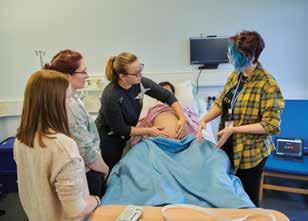


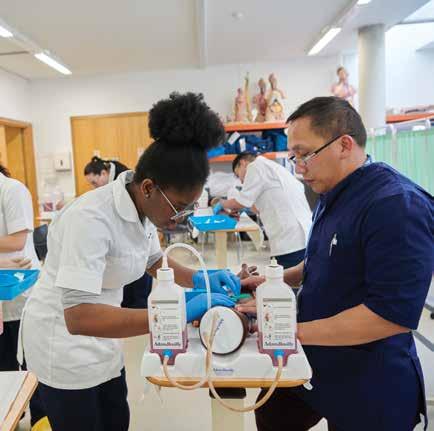
Our sport and health-related subjects offer placements, specialist study and collaborative working. See the full list on page 43. Find out about your course www.brighton.ac.uk/courses – or use the QR codes to see all courses in each subject.
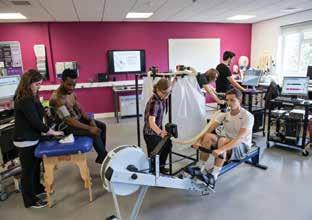
74
AC308 Allied health professions Nursing and midwifery Sport and exercise Medicine
Study amongst like-minded people while developing practical experience and knowledge – and apply it as you learn on clinical placement, on the playing field or in the lab. Become a compassionate, resilient and adaptable professional with an important role to play in supporting the health and wellbeing of clients and patients.
YOU CAN EXPECT Professional recognition
All of our health-related courses are accredited by the relevant governing body, meaning that on successful completion of the course you’ll be ready for your career and qualified to enter practice. We are a CIMSPA Higher Education Partner, the professional development body for the UK’s sport and physical activity sector, and our well-established links open up placement opportunities with organisations from pro sports to charities. CIMSPA also endorses our Sport Management, Strength and Conditioning and Sport Coaching degrees. BASES, the UK professional body for sport and exercise sciences endorses our Sport and Exercise Science degree.
Learning in practice
Clinical placements with local healthcare trusts are integral to our allied health professions, nursing and midwifery students. We partner with settings across Sussex and the south-east including the NHS, social care organisations, the voluntary sector and rehabilitation centres. Our students work with patients throughout their course alongside multiprofessional teams. You can also experience healthcare in international settings.
Sport and exercise students gain invaluable on-the-job experience through placement opportunities, and can also work on consultancy and community projects like coaching overseas with Football4Peace.
Specialist learning environments


Learn in classrooms and facilities that mirror those that you will encounter at work –exercise therapy rooms, clinical imaging suite, our community flat, clinical skills rooms and the birthing simulation suite. Work in specialist facilities like our biomechanics lab, exercise physiology labs, environment chamber and oxygen-controlled chamber, and the strength and conditioning research gym.
Darja, final year, sport coaching

My course is a perfect match
I have had a strong interest in sport from a very young age. I’ve always loved being active and staying fit and wanted to help other people do so. I also really wanted to do something practical, and I knew I would enjoy it. Sport Coaching was the perfect match. It gave me a brilliant balance between practical learning and sports science theory.
Open days helped
Chat online to students like Darja at www.brighton.ac.uk/chat and scan the QR code to check out their blogs and vlogs
I loved joining Brighton Panthers
I’ve always enjoyed distance running and I joined Brighton Panthers, the university athletics team. Being part of the team allowed me to meet people with common interests. I represented the university in national running competitions, something I was extremely proud of.

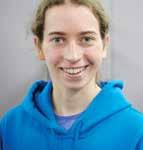
I want to work in rehab
At first, I wasn’t sure if I wanted to do sports science or sport coaching, but the subject talks helped me to decide. They were really informative and helped me understand differences between the two courses. At the open day, all the students were friendly, approachable and helpful. They were very easy to chat to. That made me realise that I belonged at the university. I just knew Brighton was the right choice and I would easily make friends. I certainly did!
I love practical learning
One of the things I really liked about my course was the range of assessments: practical coaching episodes, poster presentations, videos and coursework assignments. I loved all the practical parts as they really helped me learn. In my second and third year, we picked two option modules. I thought this was really good as it let me focus on the aspects of sport I really wanted to learn. I chose to study strength and conditioning and sports psychology.
My final year modules were particularly useful for the job I’d like to do in future – working as a rehabilitation assistant with older people. My final year health psychology module gave me a lot of insight into the way people think about sport and exercise, while the strength and conditioning module improved my understanding of movement quality and how to assess it. As someone who really wasn’t sure what they wanted to do, I now know I want to work in exercise rehabilitation!
Support is there
As a student with additional needs, I relied on the university’s Disability and Dyslexia Services quite a lot. When I first applied, the Disability and Dyslexia team advised me how to apply for the Disabled Students Allowance. I had a meeting with my learning support coordinator, and they wrote my learning support plan. I also had both study skills and mentoring support as well as automatic two-week extensions for all my assignments. All my support was extremely well organised, the team were great and I can’t thank them enough. It has made a huge difference to my time at university.
75
MEET OUR STUDENTS
Alison Taylor teaches nursing


I am a registered children’s nurse and have taught at the university since 2014. I still work on a local children’s ward, aiming to do a weekend shift every few months. This ensures I remain clinically current and credible, and allows me to maintain links with clinical staff.
I love explaining and breaking down difficult concepts to students to help them understand complex issues. I also love hearing about their experiences in clinical practice.
I am most proud of working with a team at the university which supported nurse education colleagues in Lusaka to develop the first children’s nursing course in Zambia.
As a musculoskeletal physiotherapist, I have had the opportunity to work in six different countries as a practitioner and lecturer.

My teaching style takes a studentcentred approach and enhancing a positive learning experience for the students has always been one of my core teaching principles. I enjoy creating a supportive and encouraging learning environment where the students feel comfortable to engage and actively participate in their own learning. While I very much like to be an academic friend in supporting the students to achieve their learning goals, I really appreciate and encourage them to take ownership of their learning.
BRIGHTON AND SUSSEX MEDICAL SCHOOL
Our medical school, Brighton and Sussex Medical School is an equal partnership between University of Brighton and University of Sussex, along with NHS organisations throughout the south east.
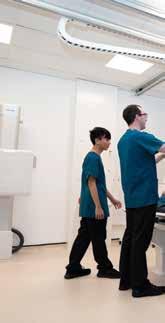
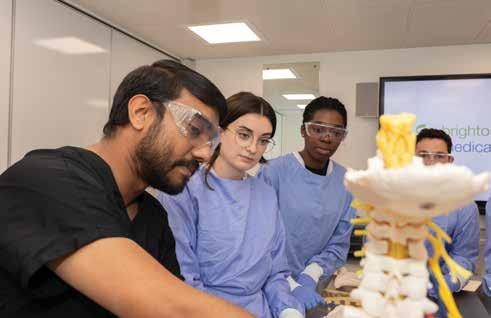
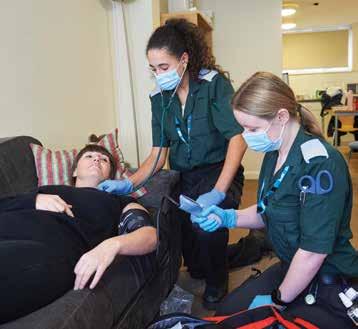
The Medicine degree integrates the development of academic knowledge with clinical experience. From the first term, you learn to apply your knowledge of the biomedical sciences to real-life patient care.
Successful completion of the course entitles you to provisional registration with the General Medical Council (GMC), subject to demonstrating your fitness to practise. You are then able to undertake further training to become a GP or medical consultant.
www.bsms.ac.uk
76
Dr Leonard Henry Joseph teaches physiotherapy
Chat online to students like Nick at www.brighton.ac.uk/chat and scan the QR code to check out their blogs and vlogs

The pandemic encouraged me to change my career
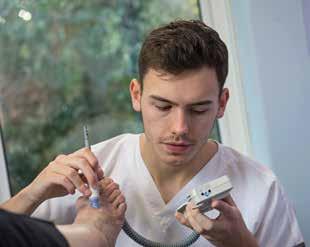
I worked in travel for seven years and the pandemic finally gave me the encouragement to do something new. I wanted to go to university and study a degree that would provide me with a rewarding career. I’ve always loved working with people and mentoring. Paramedics came to mind as it would be hugely fulfilling to help others. The more I thought about it the more I got excited by it. I started watching programmes and talking to others about my choice to study it and the most common response was “I can completely see you doing that!” It wasn’t long after sharing my plans that I began my journey with an Access to HE course.
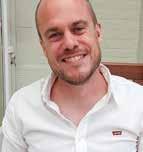
University is much more personal than college
I found the transition from college to university fairly easy and natural. The big difference is that you are now studying something specific and likely special to you. Another change is the resources and facilities available. Having access to lecturers that have worked the same career that you aspire to provides a wealth of information.
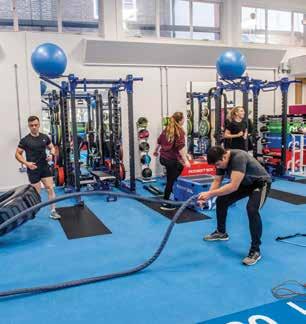
My course is interesting, fun, rewarding and hands on! It’s great doing practical work with your classmates because everyone is as intrigued as you are. In the first few weeks we covered basic CPR, took ops, spent a week at SECBAmb education centre, and I had booked my first two ambulance shifts! I really like that we had practical learning to look forward to from the very beginning.
All of our lecturers used to be paramedics which adds to the teaching experience. You know you can ask them anything and they can give you specific examples to help with any questions.
My course is 60% placement
We have our own mentor each year who we work on shift with. They help us develop our essential skills whilst also learning on the job! Ambulance placement is two shifts a week and during my first year I worked on a mental health ward for a week. Placements change to different specialist wards each study year.
I’m grateful for our NHS
I admire how relentless the health care sector has been at adapting to new situations and constant increase of care and infection control. I’m extremely excited to be studying this degree and to be part of a crucial service where I can do my bit to help.
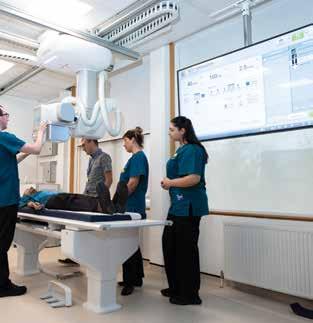
Year 2 is a lot more involved
Although you often hear that the second year is the toughest, its rewards outweigh any worries. I’m loving the theory-based teaching as I am now starting to understand the what and why of the clinical practice involved. With skill sets being taught such as respiration, cardiovascular, musculoskeletal, abdominal and neurological assessments, I am getting much more involved with diagnosing and treating patients. There are more placements in the second year. Theatre was my favourite as you join the anaesthetists when looking after patient airways. I also got to enjoy observing various surgeries including femur fractures and surgery performed by robots!
77
MEET OUR STUDENTS
Nick, year 2, paramedic science
Dr Mark Hayes teaches sport and exercise science
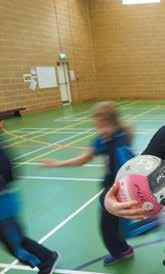
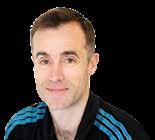
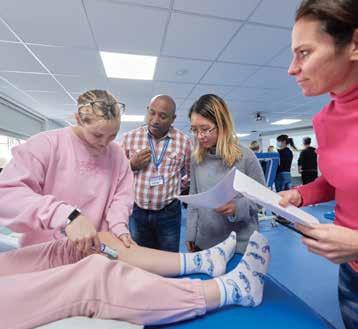
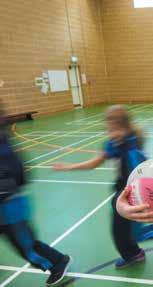
My teaching is informed by research, and I combine it with my work in environmental extremes with groups such as GB Hockey and England Rugby, alongside working with people running events such as the Marathon de Sables. As part of the Environmental Extremes Lab group, we work to understand how environmental challenges such as heatwaves impact different population groups such as the elderly and athletes.
Some of our work related to the elderly and heat waves has been presented to groups like Public Health England. We are constantly examining how our changing climate can challenge human physiology and how we can help individuals mitigate the risk.
Charlene Wallace teaches diagnostic radiography

The course here at the University of Brighton combines academic study and simulation-based education at the university, with placement learning in clinical practice. These experiences will equip you with the skills required to put service users at the heart of all you do, whilst providing highquality diagnostic images. In my role as course leader, it is fantastic to get to know our students with their diverse range of experiences and backgrounds. I want each student to have the best possible experience while they train, to reach their full potential and put the patient at the heart of all they do.
YOUR SPACE
Your campus
Our Falmer campus is only four miles from the city centre, but is on the edge of the beautiful South Downs. The School of Sport and Health Sciences uses specialist facilities and teaching spaces across the campus, and there’s plenty of informal study spaces to get together for group work, working alone or just socialising.
Everything you need is on campus, with coffee bars, places to eat and –of course – the library. There are two halls of residence at Falmer so lots of students live right on campus. The Hive is the Students’ Union meeting place and cafe bar, and they have a shop on campus too.
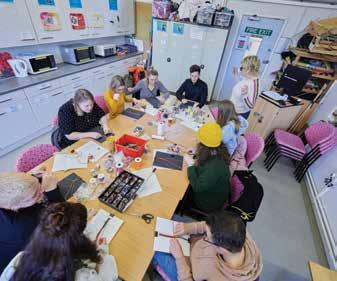
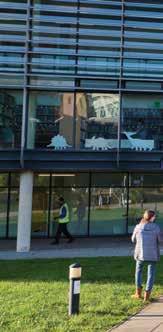
Falmer has lots of green space and excellent sporting facilities including a floodlit astroturf football pitch and a sports centre with a fitness suite. The campus is right next to the Amex Stadium, home of Premiership football team Brighton & Hove Albion. Find out more about the Falmer campus – and our other campuses – on pages 20–23.
Your city
Falmer students have the best of both worlds. You’re on the edge of the countryside, but can easily jump on a bus or train, which stop right on campus, and explore the city centre. For more about the city see pages 24–27.
78
ALLIED HEALTH PROFESSIONS
TOP 20 IN THE UK FOR HEALTH PROFESSIONS COURSES
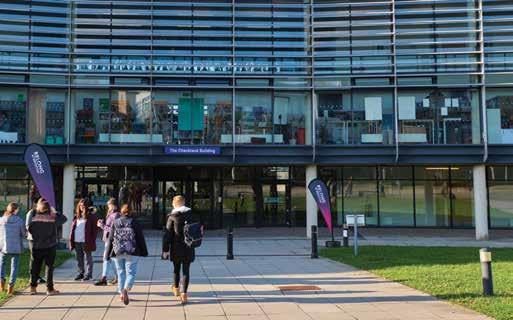
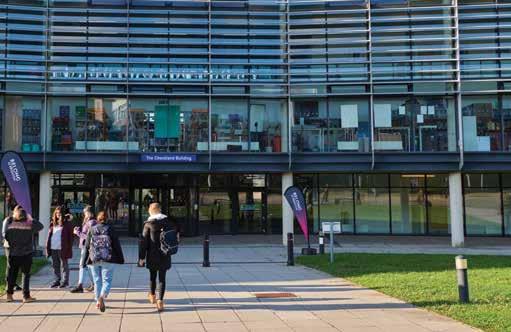
Guardian University Guide 2023
SPORT AND EXERCISE WHAT NEXT?
Joint 9th IN THE UK FOR SPORT AND EXERCISE COURSES
QS World University Rankings® 2022
NURSING AND MIDWIFERY 10th IN UK FOR MIDWIFERY COURSES
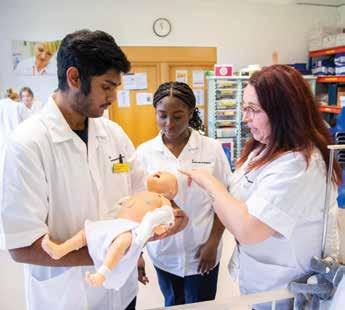
Guardian University Guide 2023
Meet us in-person at an open day or campus tour or go online for tours, tasters and Q+As. And our enquiries team is here to help and advise you. Turn to page 88 for more.
Amie, adult nursing graduate 2011
I remember the day I interviewed for my nursing degree, I had originally thought I’d want to be a paediatric nurse, how wrong I was. One of the nursing lecturers said that adult nursing is more widely recognised if you want to travel, and that was the start of my BSc nursing journey. I have worked in trauma orthopaedics, nurse-led pre-assessment clinics, GP surgery and labour wards.
For any students my advice would be not to give up. You will have days when you question everything but if you remind yourself why you began that voyage it will help you to keep going. Remember to keep a note of all the positives and highlights as there are so many. As long as you do your best and keep the patient at the heart of everything you do, you won’t go wrong.
Follow us to stay in touch
Abi, sport and exercise science graduate, 2020

After graduating, Abi went on to our Strength and Conditioning MSc and opted to study part-time while working as a rugby development intern for Sport Brighton.
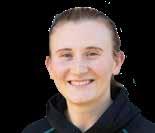
I’ve had placements with Lewes Women FC and Alex Bliss (golf), and a support coach role for British Rowing. The best thing about studying at Brighton is the access to opportunities. For me these have come from academic staff, Sport Brighton, club coaches and other students, and started from my very first year of being here. Having so much support and encouragement has given me so many experiences outside of everyday student life.
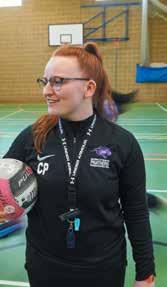
79
Applying to uni is different for everyone and what you have to do will depend on a number of factors. What is the same is our support and advice, which we offer to all of our students and applicants from writing the perfect personal statement to managing your budget.
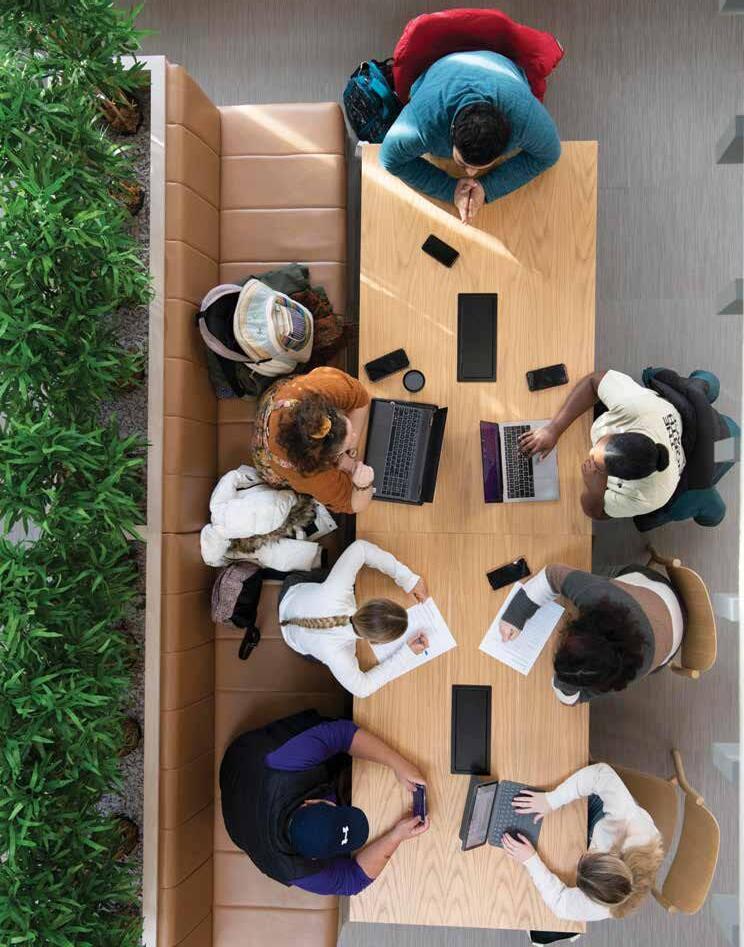
80
Fees, funding and support Fees and costs 81 University of Brighton funding 82 Government funding 82 Helping you
How to apply Your university application 84 Entry requirements Our flexible approach 86 Your next steps 88
with your budget 83
Fees, funding and support
Fees and costs
The fee you pay depends on several factors that are outlined here. Look online for more details and the latest information.
The tuition fees on this page are for students starting a university course for the first time in 2023–24. Fees for 2024–25 will be published on our website as soon as they are available. www.brighton.ac.uk/money
Tuition fees for UK students
You will pay fees for each year that you study with us. Fees are subject to an increase each year of no more than 5% or inflation (whichever is greater). Regulated fees will not increase more than the statutory maximum fee.
If you are eligible for a tuition fee loan, you will not need to pay tuition fees up front. See more information about the student loan for tuition fees on page 82.
Check www.brighton.ac.uk/money for the most up-to-date information.
University of Brighton tuition fees 2023–24 UK students
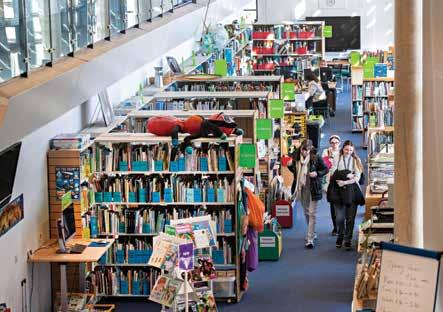
Fees per year
Undergraduate course £9,250
Placement year £1,410
Brighton and Sussex Medical School
Part-time students
£9,250
For most courses in this prospectus, charges for part-time students will depend on how many modules you study per year, and their credit value. For some courses the fee is a set amount. Government student loans may be available to part-time students. Fee information can be found at www.brighton.ac.uk/courses or contact our team at fees@brighton.ac.uk for specific advice.
International students tuition fees table
For students starting their course in 2023–24 Fees per year
Undergraduate Classroom-based From £14,300
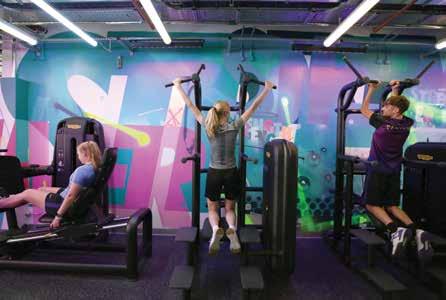
Laboratory/studio-based From £15,300
Industrial placement year £2,180
Brighton and Sussex Medical School
Check the website
The fees listed above here are for students starting their course in 2023.
International students tuition
fees
The fees that international students pay are determined by the type of course. Check the fee for your course at www.brighton.ac.uk/courses
More information on international fees can be found at www.brighton.ac.uk/ money.
Paying your fees if you are a fully self-funded student
You are liable to pay tuition fees from the first day of your course following enrolment and there are a number of ways you can pay them, including in instalments. Find out more at www.brighton.ac.uk/howtopayfees.
81
University of Brighton funding
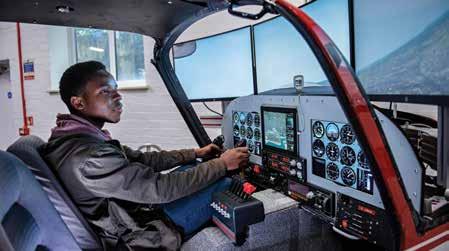
Depending on your circumstances, you could be eligible for financial support from the university.
Bursaries can be money or other support, like discounts on university services. They do not need to be paid back when you finish your course. www.brighton.ac.uk/bursaries
Our Student Potential Fund helps students to make the most of their studies and student experience. There are a number of scholarships and funds that you can apply for, all created with donations from Brighton graduates and friends who care about their university and your success. www.brighton.ac.uk/ studentpotential
Details of bursaries, scholarship and funds available in 2024 will be published on our website in 2023.
As a University of Brighton student, you will be eligible to apply for support with funding international study or work placements through the Turing Scheme government grant.
www.brighton.ac.uk/turing
Help and advice from us
Our student advice service can provide personal financial advice, as well as information on money management. They can also advise on issues that might arise with student loan applications.
Visit www.brighton.ac.uk/money for the latest advice and further details on university fees and funding. And check our advice about living on a student budget. www.brighton.ac.uk/budgeting
What’s included in our tuition fee?
To help you budget, you’ll find information on what’s included, and any additional costs, on each course web page. www.brighton.ac.uk/courses
Government funding
Depending on your circumstances, you could be eligible for financial support from the government or other organisations. The UK government’s funding package includes student loans for tuitions fees and living costs.
How do I apply for student funding?
The quickest and safest way to apply is online and it’s always important to apply early. Check the processing times for applications; if you haven’t heard anything back, phone your student funding body regularly for updates.
Students from the Channel Islands and Isle of Man
Island students pay fees at the same rate as UK students (except Brighton and Sussex Medical School). Contact the educational authority on your island for advice about financial help with tuition fees.
Student funding bodies
If you normally live in England
Student Finance England
www.gov.uk/student-finance 0300 100 0607
If you normally live in Scotland
Student Awards Agency for Scotland
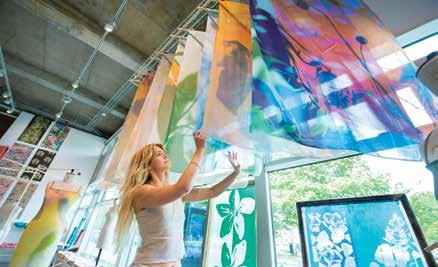
www.saas.gov.uk 0300 555 0505
If you normally live in Wales
Student Finance Wales
www.studentfinancewales.co.uk 0300 200 4050
If you normally live in Northern Ireland
Student Finance Northern Ireland
www.studentfinanceni.co.uk 0300 100 0077
82
Scan the QR code to watch Anita and Dave from our Student Advice Service explain all about the support you can access at Brighton.
Helping you with your budget
Your finances are important, and with the cost of living as it is we are sure that you will be keeping a close eye on them.
We are here to help and support all students, undergraduate and postgraduate, UK and international, to make the most out of your money with budgeting top tips, and to offer advice and support on all aspects of student finance and funding.
Student Advice Service
Our student advice team are a knowledgeable bunch, between them they can help with pretty much any finance or funding problem that arises for our students. They can give you information about your student finance, how to supplement your loan, and offer support and advice on managing financial difficulties, including hardship funding, bursaries and scholarships.
Our Money Matters blog has loads of useful information from the team with the latest student finance news and money-saving tips.
https://blogs.brighton.ac.uk/ studentadviceservice/
Additional funding
The university offers bursaries and scholarships to students in particular circumstances. See page 82 for more info.
Extra funding is available through our student support funds if you find yourself in financial difficulty. You’ll need to meet certain criteria. The Student Advice team can help you work out if you are eligible and make your application.
www.brighton.ac.uk/studentsupportfund
Earning money at uni
If you want to find work to support your studies, there are loads of opportunities to work for the university in many different roles.
• We can help you find a job through Careers Connect, our vacancy service where you can look for jobs at the uni and elsewhere.
• Students work for Sport Brighton at our sport and recreation facilities. Brighton Student Union advertises roles in their cafes, shops and services.
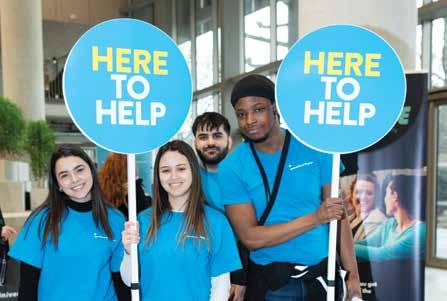
• Be a student ambassador and help prospective students see themselves at Brighton. If you come to an open day look out for our ambassadors in blue t-shirts. They have opportunities to work at events like open days, at online events, widening participation in schools and colleges, and in creating content for our website, blogs and publications like this prospectus!
Seniz, ecology and conservation
To make sure I can have sufficient money for my expenses I have an Excel spreadsheet that I use to visualise what things I need money for, how much I want to save and if I have any money coming in from working. I find this helps me figure things out so much easier and feel in control of my own finances.
Kristian, music business and media
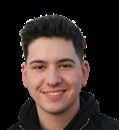

I recommend setting up a savings account to store money aside for important payments like bills, rent, food and travel. This way, you can spend money at social events like nights out without feeling too guilty! I use budgeting apps like Snoop and Emma to categorise my spending and see how I can improve my habits as it's easy to get carried away! I also have a few part-time jobs that are flexible around my studies, keeping my finances topped up and also providing a CV boost.
Sophie, geography



Working as a student ambassador has been a brilliant experience as it is flexible and understanding of university commitments and allows me to develop useful skills. I’ve improved on public speaking by working on campus tours and student Q+As with prospective students, and produced written content for blogs and prospectuses.

83
FIND OUT MORE
Kristian, music business and media

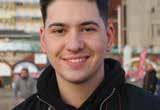
The application process began at college – I had received my A-Level results and written a personal statement through the UCAS platform. Being able to attend a taster session provided added peace of mind, and confirmed that I was making a decision that I wouldn’t regret.
How to apply Your application
Your university application
Applying to uni is a big deal. We’re here to help every step of the way with advice on our website and at our online events and Q+A sessions.
Our online events about applying to uni will help you to understand the UCAS process, and advise on choosing the right subject and course for you, writing a strong personal statement, and student finance and funding processes. Ask us your questions at any time, or just sit back and take notes!
We also run Q+A sessions for parents and carers so that they get their questions answered too.
Find out more about our events and open days at: www.brighton.ac.uk/visit
Personal statements
Personal statements are an important opportunity for you to stand out as an individual, and tell the course team who you are and why you want to be on the course. Many applicants do not find writing a personal statement easy, so we
have put together a ton of hints and top tips on our website. We also run online personal statement Q+A sessions where our students share their experiences, and our lovely team will help you to get answers to your questions. Find out more at www.brighton.ac.uk/personalstatement
Creating a portfolio
If you’ve applied for a creative media, arts or architecture course, we will ask to see a portfolio of your work to be assessed as part of your application. We typically ask for a digital portfolio, a selection of your work or pictures of your work that we can look at online. It could be 15–20 images or a show reel if you are applying to a music or animation course for example.
We'll send you advice and guidance once you've applied to us, including how to submit your portfolio to us on Student View.
Find out if your course needs a portfolio at www.brighton.ac.uk/portfolio, and tap through to the course page for specific guidance on format, platforms and the work we’d like to see.
PREPARE YOUR PERSONAL STATEMENT
Start early and give yourself plenty of time to perfect your personal statement!
www.brighton.ac.uk/ personalstatement.
FROM MEET OUR STUDENTS
SEPTEMBER Apply at www.ucas.com/apply – you can choose up to five unis/courses. Remember to double check your application and provide all the info asked for before you press submit.
Track
84
TRACK YOUR APPLICATION
your Brighton application and ask us questions online.
We’ll give you access when you apply.
APPLY online to students at www.brighton.ac.uk/chat and scan the QR code to check out their blogs and vlogs
Chat
Student View
Student View is where you’ll manage your application to the University of Brighton. You can message us with your questions and this is where we’ll let you know if we need more info from you too. We’ll invite you to log on when you apply to us through UCAS.
Interviews
For some of our courses, we will invite you to an interview before we can make you an offer. Interviews help us to assess your suitability for the course at Brighton and the profession you want to join. It is great opportunity for you to demonstrate your enthusiasm, experience and motivation, to interact with us and get a sense of what it is like to be a Brighton student.
We’ll invite you to interview through Student View, where you can book a date. Each course takes its own approach to interviews and you’ll receive detailed info and guidance once you’ve chosen a date.
You’ll be able to get advice and chat with staff and undergraduates on how to prepare for a university interview at one of our online events.
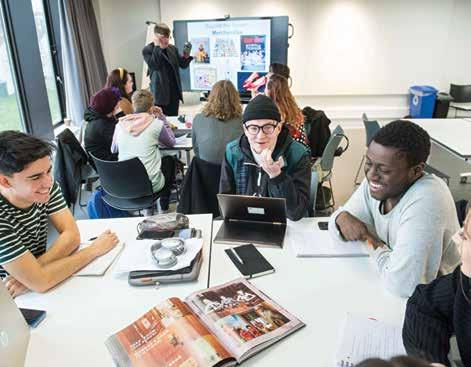
Find out more at www.brighton.ac.uk/interview.
Got more questions?
Our lovely enquiries team are standing by for any questions that you might have about your application. They have a wealth of knowledge all about university so feel free to ask them anything that springs to mind.
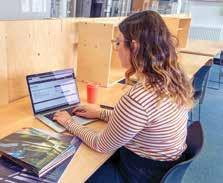
www.brighton.ac.uk/enquiries
And if you’d like to chat online with one of our students, pop over to www.brighton.ac.uk/chat
The facts
Applying through UCAS Applications are made online at the Universities and Colleges Admissions Service (UCAS). Use UCAS (www.ucas.com) to apply for full-time undergraduate degree courses, HTQs, integrated masters and integrated foundation courses. You can start searching for courses running in 2024 from May 2023. Our UCAS institution codes are:
• University of Brighton (BRITN) B72
• Brighton and Sussex Medical School (BSMS) B74.
Deadlines for UCAS application
• Brighton and Sussex Medical School
15 October 2023
• University of Brighton
25 January 2024
We will consider applications received after 25 January 2024 if we still have places on a course.
Application costs
The application fee is £22.50 if you’re applying to just one course, or £27.50 for more than one course and for late applications sent after 30 June. These are the fees for 2023 entry, UCAS will publish fees for 2024 during 2023.
Ketan, physical education

The support provided by the university was extremely helpful and prompt at all times. When I was applying, the university staff helped me in meeting the requirements, filling the application form and successfully securing the place.
Applying direct to the university Applications for part-time degree courses and preparatory English language courses should be made direct to the university.
Visit www.brighton.ac.uk/applydirect and www.brighton.ac.uk/learnenglish for more information.
Applying to Brighton and Sussex Medical School
UCAS allows you to specify up to four choices for courses that lead to a professional qualification in medicine and you may also add one alternative course. Medical school applications must reach UCAS by 15 October 2023.
85
Entry requirements
Your exam grades are important to us, but other things count too. Our approach is about you as an individual, and about giving you every opportunity to succeed with us. If we feel you have the right qualities and commitment to excel and to become a valued member of our university community, we will be keen to offer you a place.
Our admissions team will assess your application individually, considering your educational and personal circumstances and making sure that everyone is given an equal opportunity to show their achievements.
Our students bring so many different experiences, talents and strengths to our community – this is where you’ll use your personal statement to show us everything you have to offer.
We want to get to know you. This might be through seeing your portfolio or at interview, where we’ll have opportunities to find out about you, your values and what inspires you.
We welcome many qualifications as well as A-levels including the ones described here. Most of our courses have entry requirements that sit within a range. You can see the UCAS tariff points for your course on the course finder in this prospectus starting on page 38–43.
Full requirements for each course including any specific subjects that you’ll need are on our website, www.brighton.ac.uk/courses
The UCAS tariff
The UCAS tariff translates your achievements across different types of qualifications into points, enabling us to assess all kinds of achievements, academic and vocational. Find out more about how your qualifications translate at www.ucas.com/tariff-calculator
BTEC and combined qualifications
We welcome applications from students with BTEC diploma qualifications, as well as students with a combination of BTEC, A-levels and other qualifications. We know that students with BTEC qualifications are prepared for an applied approach to learning, which is relevant to many of our courses.
GCSE
Specific GCSEs are not a requirement for most of our courses – where they are required you’ll need them as well as your A-levels, BTEC or other qualifications. Check the website to find out if your course has GCSEs as a requirement.
Access to HE diploma
Our Access entry requirements vary depending on the course, but the minimum requirement is to pass with 60 credits (at least 45 credits at level 3). Find out more about specific entry requirements on the website.
International Baccalaureate (IB) diploma
Entry requirements vary but IB students can expect to receive conditional offers for between 26 and 32 IB points.
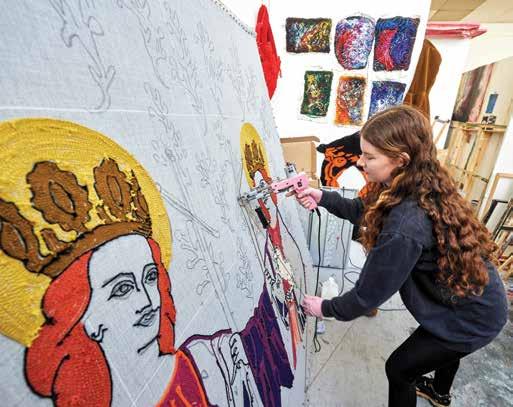
86
MEET OUR STUDENTS
Chat online to students at www.brighton.ac.uk/chat and scan the QR code to check out their blogs and vlogs
T-levels
We accept the T-level qualifications for entry on specific courses that are good matches for the T-level curriculum. Find out more about T-levels and the courses we accept them for at www.brighton.ac.uk/t-levels
Other qualifications
Admissions tutors accept many other qualifications including work-based qualifications. While individual course requirements vary, we will consider many UK and international qualifications.
Credits
Relevant professional, commercial or Open University credits may be acknowledged as equivalent to sections of a course. You’ll still have to provide evidence of some A-level equivalent study – and may still be advised to take a preparatory course.
International students
English language proficiency
Our degree courses are delivered and assessed in English. UK Visas and Immigration (UKVI) and the university will need you to meet their English language requirements for your chosen course through a valid English language test. You will need to obtain a Confirmation of Acceptance for Studies (CAS) number via the university so that you can apply for a visa.
For details about UKVI requirements, take a look at www.gov.uk/ukvi

For specific requirements for your course, www.brighton.ac.uk/courses. For information about English language tuition go to www.brighton.ac.uk/
learnenglish
English language requirements for applicants who have not previously been taught or examined in English
Most of our undergraduate courses require an IELTS score of 6.0 overall with a minimum of 5.5 in the other elements. Some courses require a higher score. Check our website for course-specific details. www.brighton.ac.uk/courses
Ellie, media studies


In my A-levels I got just under the UCAS points I needed to come to Brighton, and so during my gap year I wrote an Extended Project Qualification (EPQ). This was helpful not only for the entry criteria, but also to stay focused and disciplined in my studying and to include in my personal statement.
Amy, sport and exercise science



I applied to university while studying a Level 3 BTEC, this is a more common route than you may think so do not panic if you did not study A-levels. I visited five different universities at open days and took part in a summer school at Brighton during the summer holidays just after year 12.
Ewan, politics, sexuality and gender
The campus tour I came on was brilliant. It helped me see what facilities were available to me and where I would be studying. The fact that it was led by a student was useful too as it meant that I could ask about any questions or worries that I had.
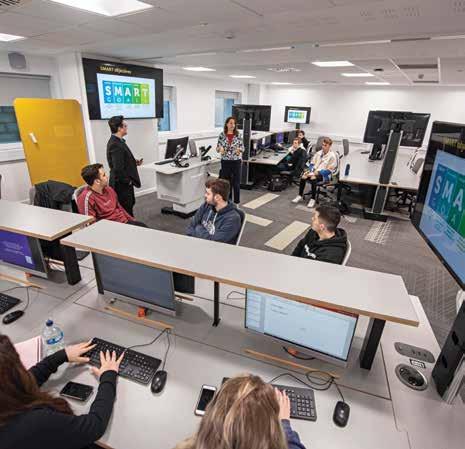
87
MEET US IN PERSON
FOLLOW US TO STAY IN TOUCH
Get to know us from a distance –take virtual tours of our campuses and facilities, get an inside guide from our student bloggers and message our students with your own questions. www.brighton.ac.uk/explore
OPEN DAYS AND MORE
Meet our students and staff, in person and online, hear all about our courses and get advice on every aspect of applying. We also run summer schools, tasters and applicant events. Find out more at www.brighton.ac.uk/visit
OUR ADVISERS
For help and advice get in touch at www.brighton.ac.uk/enquiries telephone (01273) 644644 international code (+441273)
88
Catch up with us at an HE Fair, and look out for us visiting your school or college. www.brighton.ac.uk/visit
1 3 2 5 6
4
We can’t wait to show you around. www.brighton.ac.uk/campustours
UniofBrighton @UniofBrighton University of Brighton @uniofbrighton www.brighton.ac.uk/blogs
CAMPUS TOURS
EXPLORE
ONLINE
TALK TO
We have three campuses in Brighton. For more about our them see pages 20–23, and check the course list (pages 38–43) or the online course page to see where your course is based.
Planes
Brighton is very close to Gatwick Airport – just 30 minutes direct by train and 45 minutes by car. Heathrow isn’t far either – 64 miles away – and accessible easily by coach, or by train via London.
Trains
It’s only 50 minutes by train from Brighton to central London. From Brighton, there are direct trains to Bristol, Bedford, Cambridge, Portsmouth and Southampton, as well as to London terminals, making it easy to travel further afield. Ongoing improvements to the north-south rail network will mean more connections to Brighton, even easier journeys and new trains.
Automobiles
It’s less than 50 miles from Brighton to central London. And for European adventures, you can get a ferry to France from Newhaven – just eight miles from Brighton.

UCAS institution codes
University of Brighton (BRITN) B72
Brighton and Sussex Medical School (BSMS) B74
This prospectus was published in February 2023, 18 months before the academic year to which it relates. We continually review and develop the courses that we offer. To make sure you have the most upto-date course information including entry requirements visit www.brighton.ac.uk/ courses.
This prospectus is available in alternative formats on request.
The University of Brighton makes every effort to ensure the accuracy of this prospectus and will use all reasonable endeavours to provide the courses and services described within it but cannot guarantee their provision in the event of circumstances beyond our control (such as lack of demand, changes in government policy or industrial action). The university will make reasonable efforts to provide suitable alternatives and reserves the right to vary course content or methods of delivery of courses.
This prospectus is intended to help you choose your course at the University of Brighton. It does not replace the university’s terms and conditions which can be found on the student contract page of the website, www.brighton.ac.uk/studentcontract.
Cover photograph by Andrew Weekes
Additional photography by Andrew Weekes, Solly Levi, Stephen Lawrence, Willie Robb and Sorcha Bridge.
Printed by Sterling, registered to environmental standards ISO 14001
100% of this prospectus can be recycled. The paper is from a sustainable source and the ink we use is vegetable-based. The cover has a water-based coating that can be recycled and is also compostable.
89
When
you have finished wi ed with this prospectus please recycle it.
HEATHROW AIRPORT DOVER FOLKESTONE (CHANNEL TUNNEL HASTINGS PORTSMOUTH GATWICK AIRPORT M40 M4 M11 M25 M25 M25 M25 M25 M26 M20 M23 A23 A22 M2 A1(M) M3 BRIGHTON LONDON EASTBOURNE
Brighton is a brilliant city by the sea –and it’s really easy to get to. It’s less than an hour from central London by train, and just half an hour from Gatwick airport.
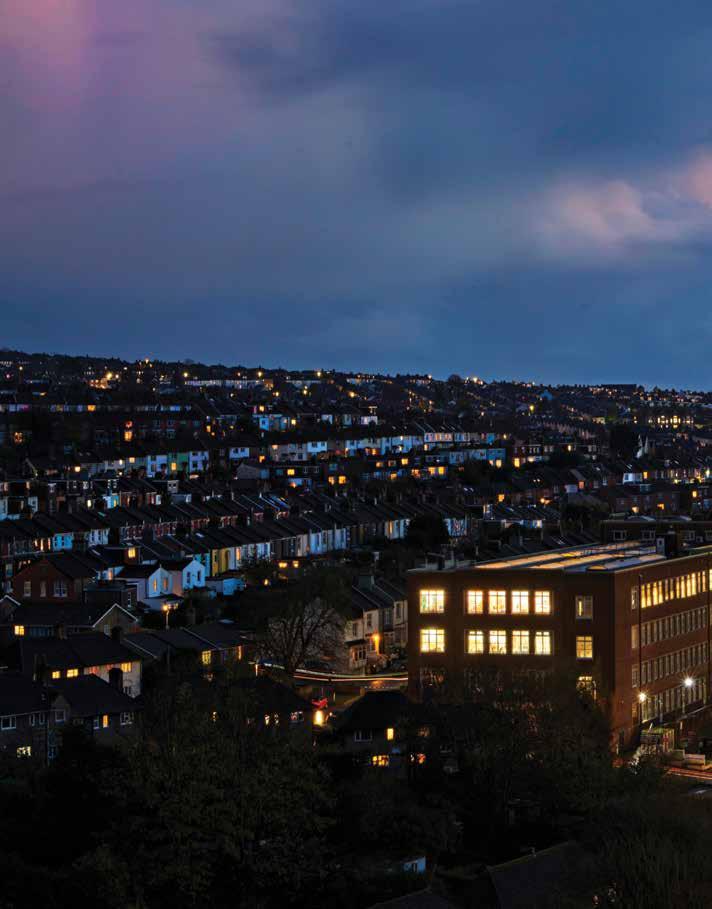
www.brighton.ac.uk EXPLORE ONLINE









































































































 MOULSECOOMB CAMPUS
MOULSECOOMB CAMPUS






































































































































































































































































































